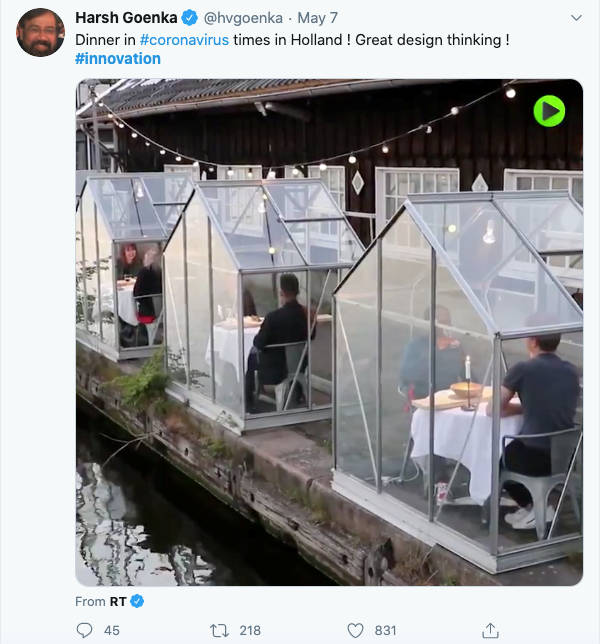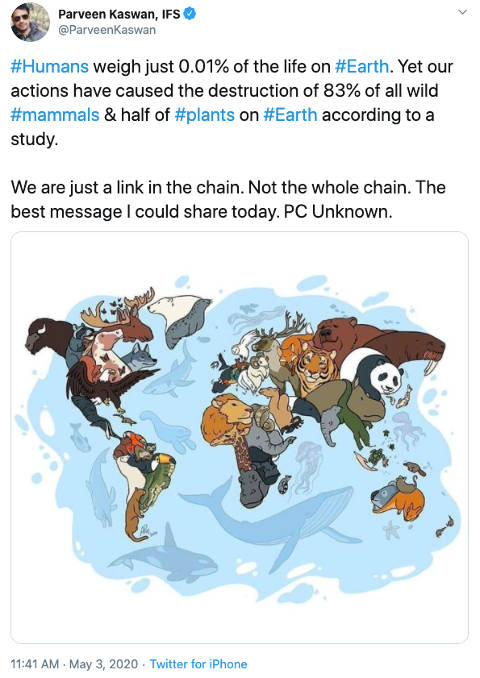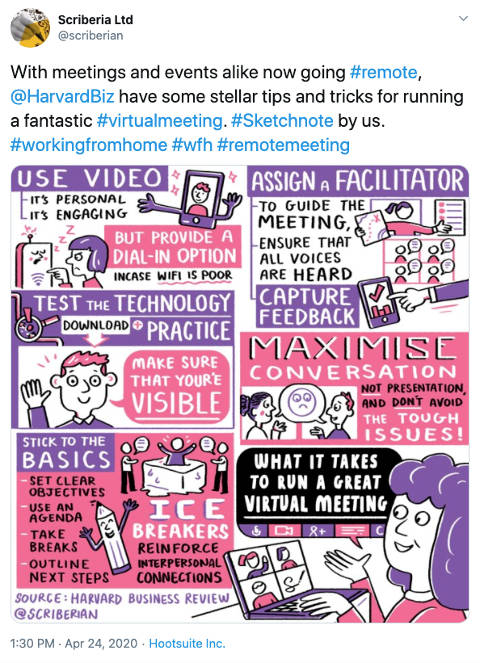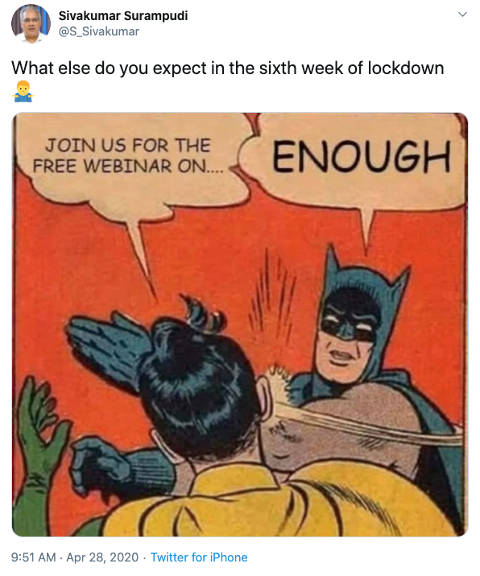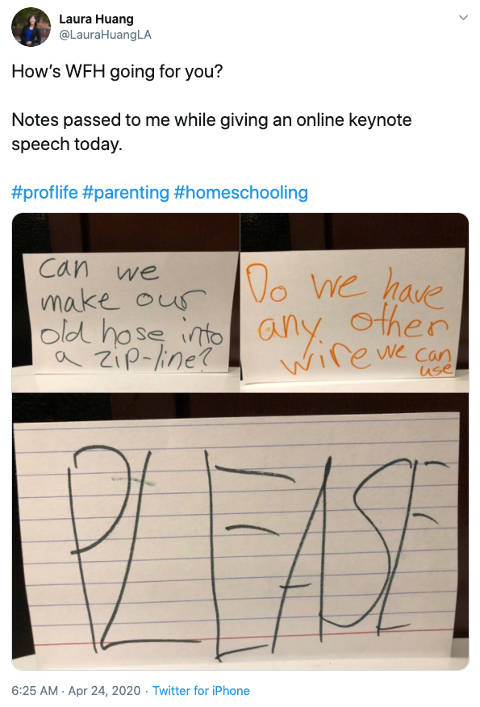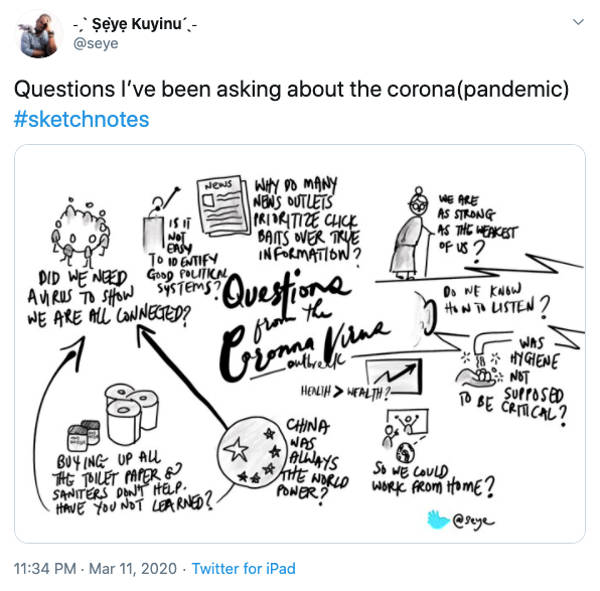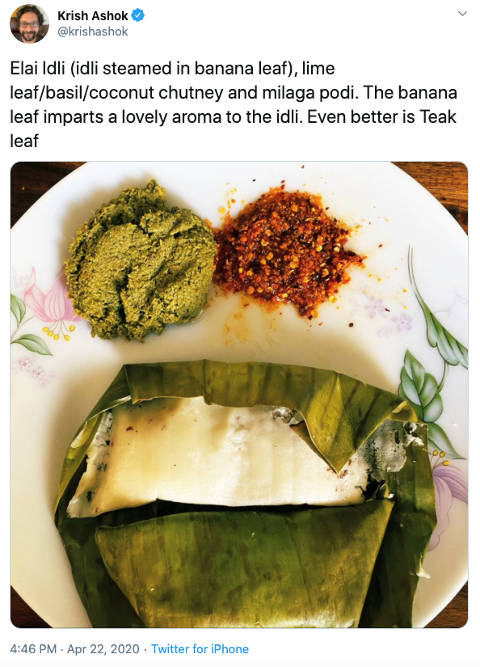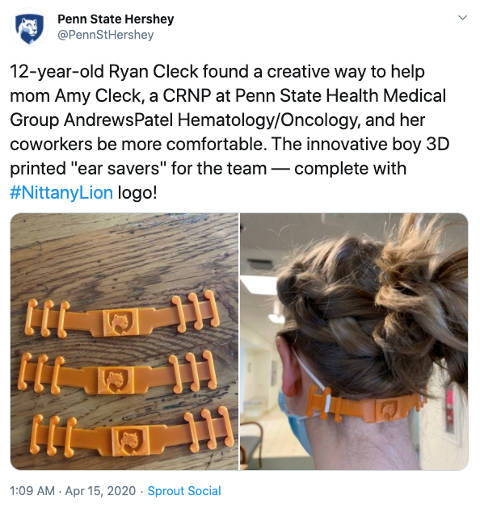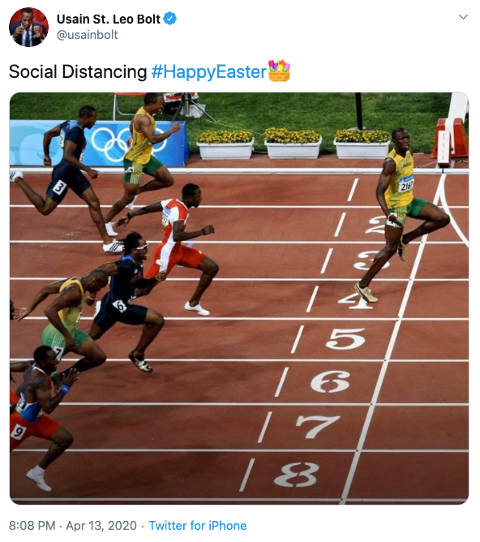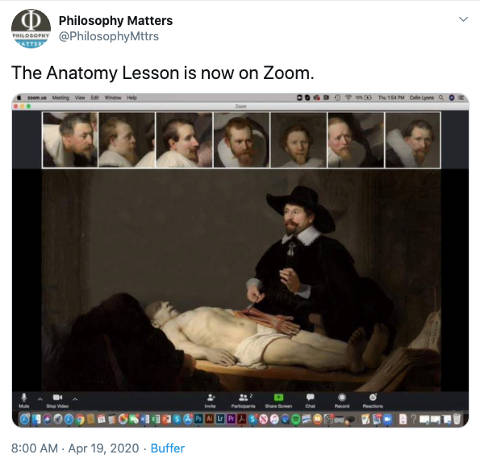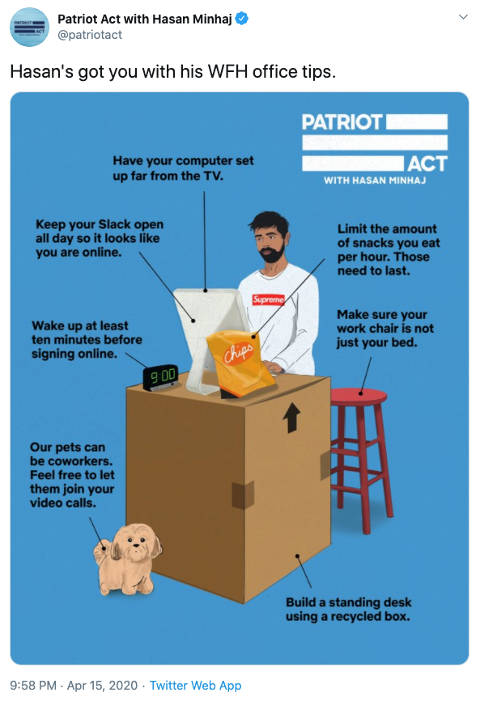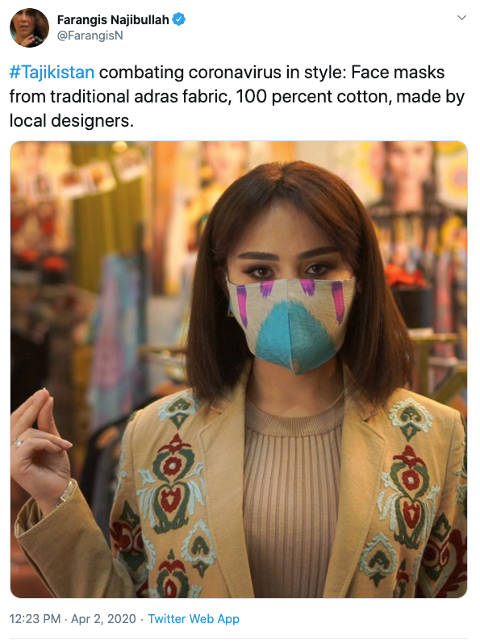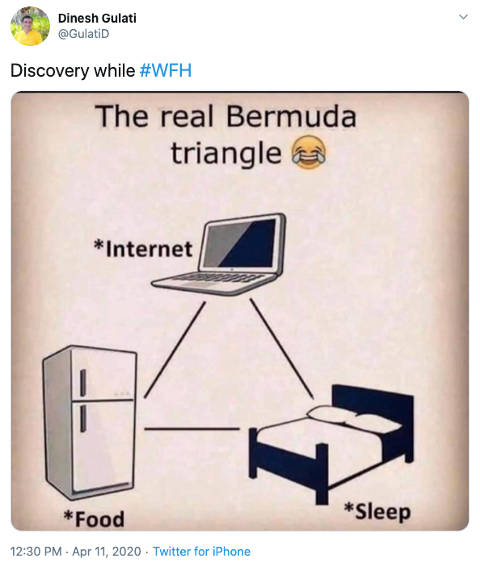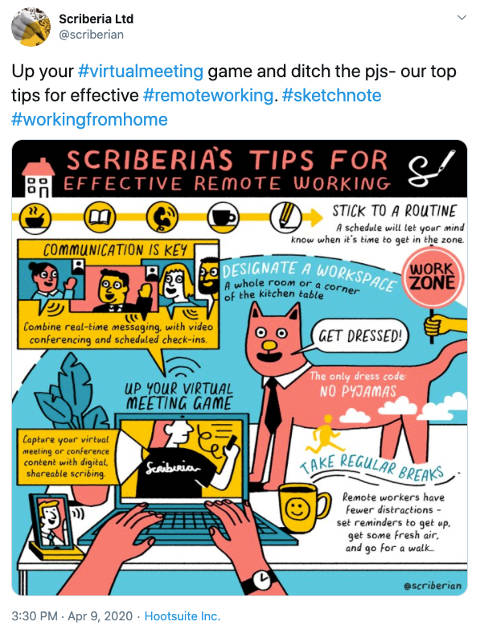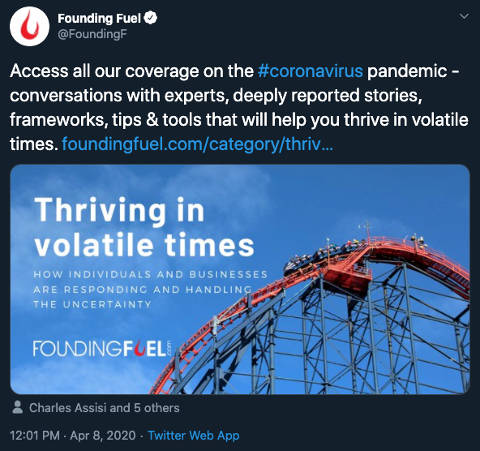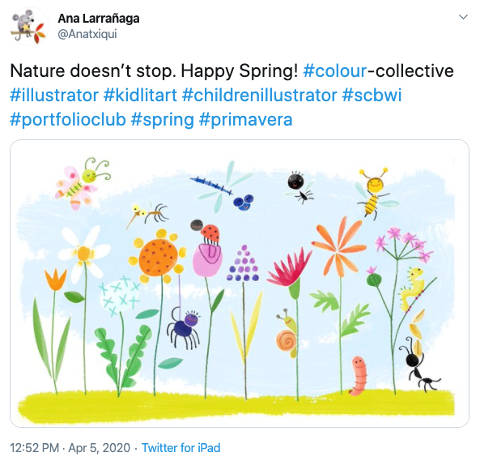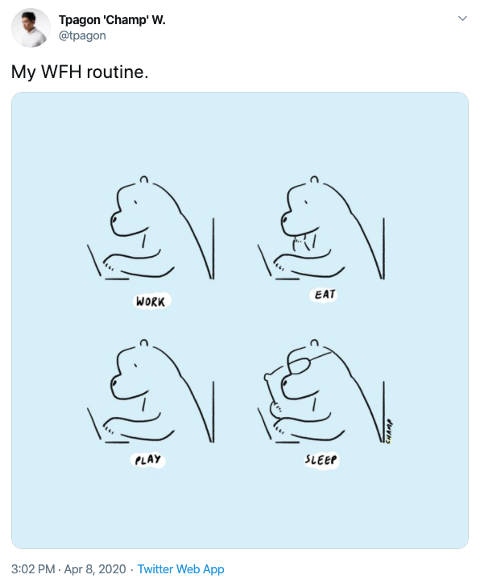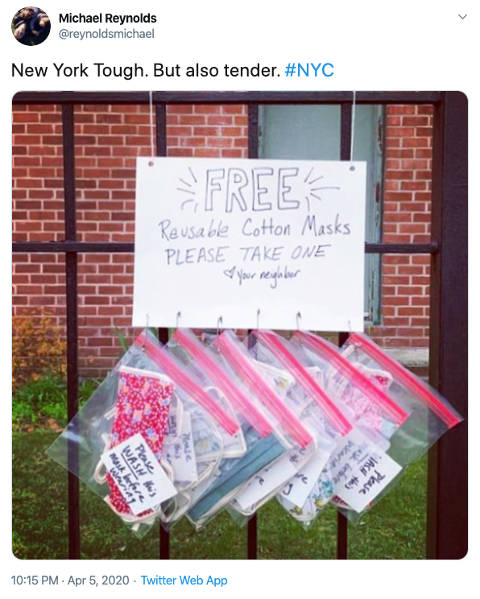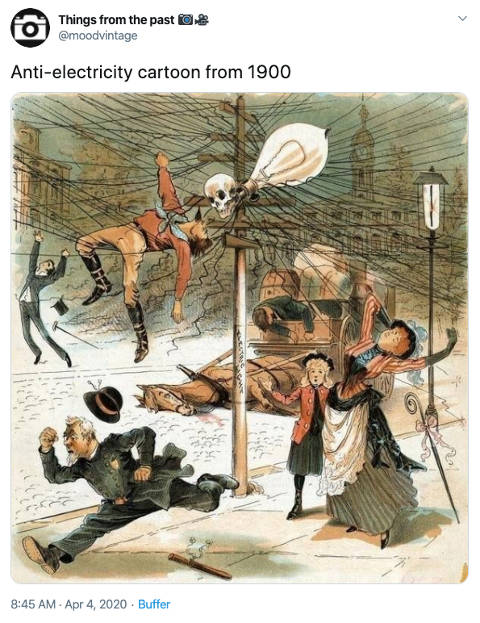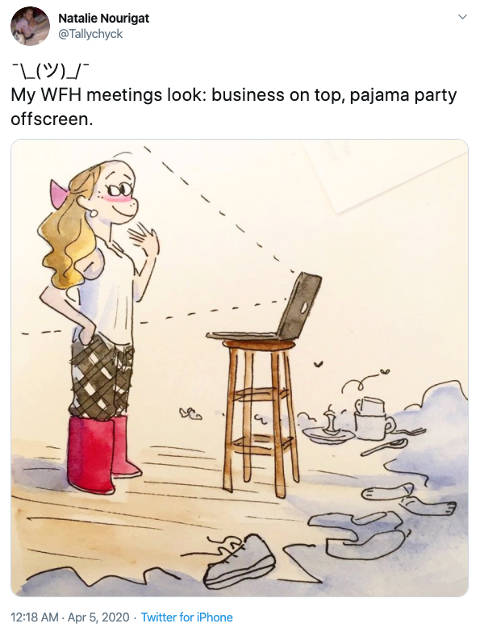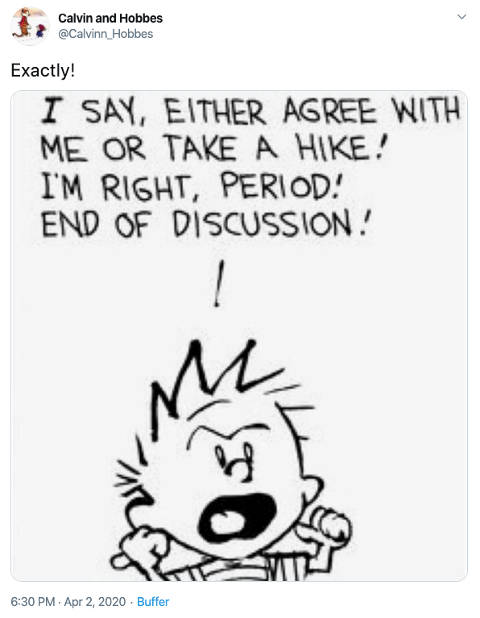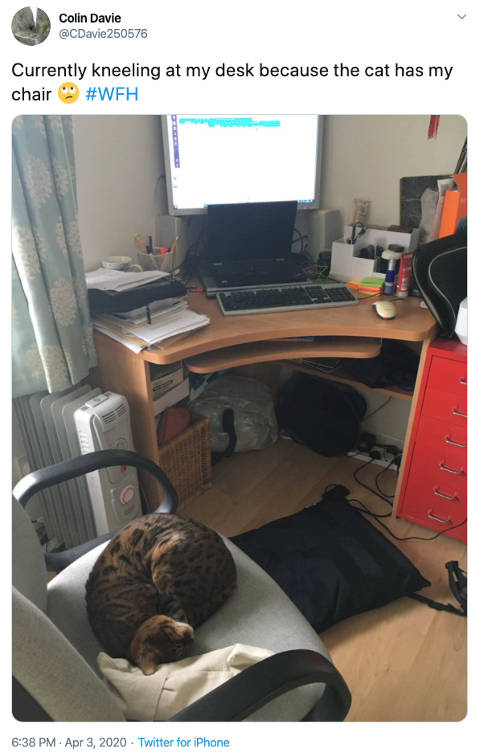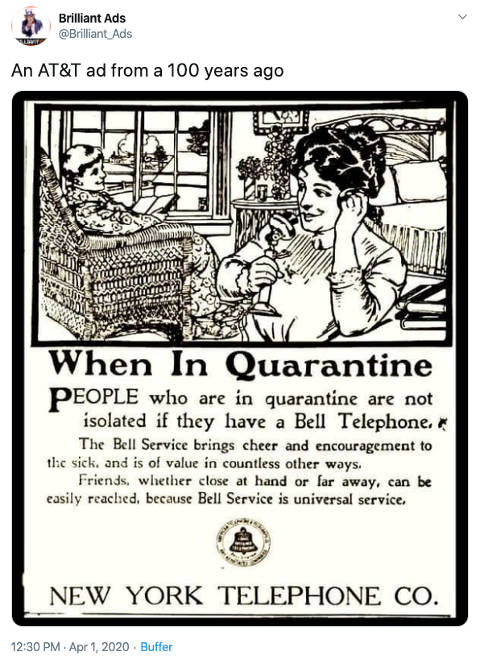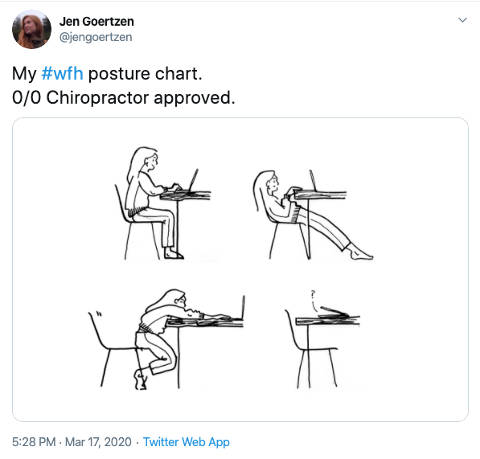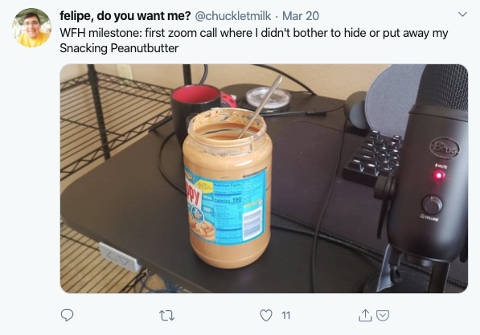[Photo by Christina @ wocintechchat.com on Unsplash]
Good morning,
In Manifesto for a Moral Revolution: Practices to Build a Better World, Jacqueline Novogratz, founder and CEO Acumen, a non-profit global venture capital fund, writes:
“Young people sometimes ask, ‘But what if I dare and then fail?’ I failed more times than I can count. I moved to Cote d’Ivoire and was met with outright rejection from those I had hoped to serve. Yet I learned from my failures, and came to understand that to rule out failure is to rule out success.
“With each experience, the good, the bad, and even the ugly, I added tools to my toolbox. More important, I honed my understanding of myself and how others perceived me, preparing to listen, learn, and work in partnership. I began to comprehend that the world does not need another hero—sustained change results from multiple heroic acts across a community—and that it was my job to help others shine.
“Of course, there are times when nothing seems to be working when you don’t understand what is going on around you, and no one trusts you enough to tell you. But what separates those who dabble in feel-good endeavours and those who actually nudge the world forward has nothing to do with intellect, connections, or specific skills. The ones whose actions and ideas produce positive consequences are the ones who stay in the game.
“Try. Fail. Then try again. Follow the thread as it unspools. Just start.”
Those who want to make an impact, in moments of self-doubt, are faced with the question ‘am I merely pursuing a feel-good endeavour or am I helping the world move forward?’ Even the most confident leaders and entrepreneurs have these moments of self-doubt because things often go in the opposite direction. The only way to resolve it is to stay in the game.
Have a great Unlocked week ahead.
Learn to negotiate... with kids
In Harvard Business Review Mary Kern and Terri R. Kurtzberg take on a tough subject—negotiating with kids—and offer a number of practical suggestions. As you read it, you realise that it might just work with adults too. (For everyone has a kid in them?) Here’s one tip:
- Embed choice. Instead of a single offer, two or three choices, framed in terms of their priorities, make it easier for your kids to say yes. Choice gives a sense of control over both the process and outcome. A parent ordering takeout mastered this technique: I announced where we would be ordering from instead of opening the floor for debate, but allowed each child to choose a dish. This one small change sidestepped an ongoing moment of tension in our house.
Get the sequencing right
One of the biggest dangers in getting excited about digital education is that we might ignore two prerequisites for it to even start working. Access to infrastructure. Skills to use them effectively. In an interview with News 18, Sonajharia Minz, the new vice-chancellor of Sido Kanhu Murmu University (SKMU) in Dumka, Jharkhand, draws our attention to that. Minz says:
“Till date, some districts in Odisha have no roads and electricity. If digital education becomes the final medium of teaching in the post-lockdown phase, we will be consciously depriving and eliminating a section which does not have access to this platform. This kind of education and teaching-learning requires skills…
“Right now, schools have been asked to deliver their content through devices like phones, but think of the family with one phone and four children. For them it’s an everyday dilemma of who would get the phone for school lessons of the day?”
Prepare yourself
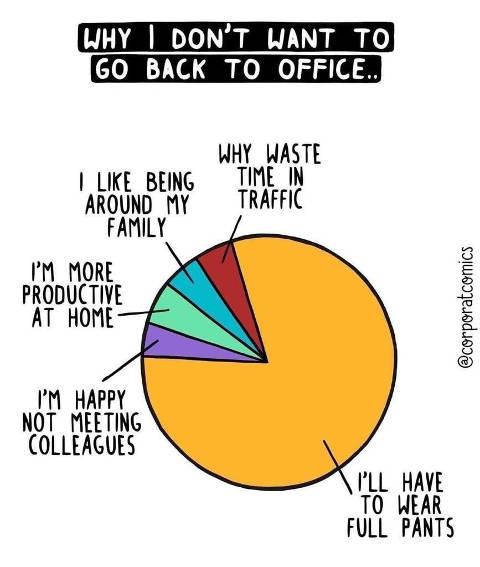
(Via WhatsApp)
What will you miss most post-lockdown? Share it with us. Or post on Twitter, and tag us @foundingf. Or join our Slack channel and post it there. If you aren’t there already, here is the invite code.
And if you missed previous editions of this newsletter, they’re all archived here.
Bookmark Founding Fuel’s special section on Thriving in Volatile Times. All our stories on how individuals and businesses are responding to the pandemic until now are posted there.
Warm regards,
Team Founding Fuel
May 31: Do your ears a favour, get the right headphones; seek support for emotional fitness; pivot
Good morning,
Historians tend to think in terms of decades and centuries, and when they turn their gaze on the present, they see what’s happening with greater clarity. It’s no surprise then that Yuval Noah Harari wrote this about the state of leadership back in March.
“Today humanity faces an acute crisis not only due to the coronavirus, but also due to the lack of trust between humans. To defeat an epidemic, people need to trust scientific experts, citizens need to trust public authorities, and countries need to trust each other. Over the last few years, irresponsible politicians have deliberately undermined trust in science, in public authorities and in international cooperation. As a result, we are now facing this crisis bereft of global leaders that can inspire, organise and finance a coordinated global response.”
The riots in the US and the migrant crisis here in India are just two tragic examples of the erosion of trust between humans, and the dangerous lack of leadership.
It takes character, courage and selflessness to be a leader. In Leaders Eat Last: Why Some Teams Pull Together and Others Don't, Simon Sinek offers a thought-provoking definition:
“Leaders are the ones who run headfirst into the unknown. They rush toward the danger. They put their own interests aside to protect us or to pull us into the future. Leaders would sooner sacrifice what is theirs to save what is ours. And they would never sacrifice what is ours to save what is theirs. This is what it means to be a leader. It means they choose to go first into danger, headfirst toward the unknown. And when we feel sure they will keep us safe, we will march behind them and work tirelessly to see their visions come to life and proudly call ourselves their followers.”
This pandemic has exposed the faultlines that exist in our society, and it has also shed light on the competence (or the lack thereof) of the leadership at many levels. It’s our collective responsibility to fix both.
Have a great Sunday.
We have put together something special for you today.
Do your ears a favour, get the right headphones
Hours on the phone and on Zoom are now a regular part of the day. The Founding Fuel team starts the day with an hour-long team call on Zoom, and ends the day with another catch-up that can go up to an hour-and-a-half. And there are other Zoom sessions in between. Here’s what we’re using.
Bose QC 35 II: “This one is an upgrade from my Bose QC 3.0 that has served me well for over a decade. I’d bought the QC 3.0 for my frequent international travels. The active noise cancelling feature was a major draw. It has an on-the-ear fit—it basically sits on top of the ears, making it easy to wear for extended periods of time. I have used other over-the-ear models, but nothing beats the QC 3.0—for audio clarity, mild bass, the soft ear cups, and the fit on the ear.
“Since this model is discontinued, my ideal replacement would be a Bose QC 35 II—for the active noise cancelling, mid-bass, superior mic, and wearing comfort. I am undecided about using Bluetooth for video calling, but this wireless headphone comes with a cable you can plug in.” - CS Swaminathan: (Price: Rs 24,959 | Details)
Sennheiser PC 8 Over-Ear USB VOIP Headphone with Mic (Black): “You need to be careful of how much the ears can take when you are plugging in for calls (how many hours are you planning to have it on—I do about 5-6 hours on Zoom every day). I considered the Bose QC 35 II and other bluetooth headsets, but I toned down my needs and went for Sennheiser. It doesn’t give the same kind of output, but it is light on the head and the ears—and on the pocket! I too went for a non-Bluetooth option—I mean, one that can be used only with a laptop.
“It is easy on the ears and the audio is reasonably clear for people on the other side—even though my place can get noisy.” - Kavi Arasu (Price: Rs 2,990 | Details)
Apple AirPods: “If you use Apple products, AirPods is a good option for two reasons. It fits in your ears very well. Most AirPods owners have exchanged stories about how they searched for their AirPods only to realise they were sitting in the ears. Once you have paired it with all your devices—iPhone, iPad, MacBook and Mac—switching between them is easy. It’s especially useful when you have a WhatsApp call on the phone with a friend quickly followed by a Zoom video call on the desktop with colleagues. Charging the Airpods is surprisingly fast.
“I haven’t tried AirPods Pro. Its active noise cancellation feature has a huge fan following. However, it’s much more expensive and prone to fall out when one moves.” - NS Ramnath (Price: Rs 13,190 | Details)
Seek support for emotional fitness
First Round takes a deep dive into Dr. Emily Anhalt’s approach to building emotional fitness. Here’s a key insight:
“An Olympic athlete wouldn’t be expected to reach their full potential without a coach. But for some reason, many founders think that they should be able to soldier on and shoulder their emotional burdens without any support.”
Pivot
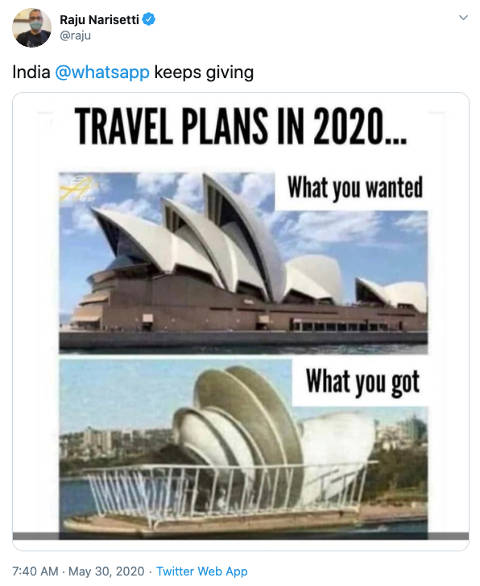
(Via Twitter)
Where will you take your first holiday once we have beaten the virus? Share it with us. Or post on Twitter, and tag us @foundingf. Or join our Slack channel and post it there. If you aren’t there already, here is the invite code.
And if you missed previous editions of this newsletter, they’re all archived here.
Bookmark Founding Fuel’s special section on Thriving in Volatile Times. All our stories on how individuals and businesses are responding to the pandemic until now are posted there.
Warm regards,
Team Founding Fuel
May 30: See the big picture, watch out for cybercriminals, dress up for the occasion
Good morning,
In an interview to The New York Times in 1996, Albert Uderzo, the co-creator of Asterix, speculated on what made the series so successful. ''It's a puzzle to me why Asterix happened the way it did. Rene (Goscinny) and I had previously created other characters with as much passion and enthusiasm, but only Asterix was a hit. I think it's perhaps because everyone recognizes himself in the characters. The idea of the weak who defeat the strong appeals. After all, we all have someone stronger lording it over us: the government, the police, the tax collector.''
Uderzo’s insight explains why Asterix has a universal appeal, and why for almost everyone the fascination with the diminutive character with a formidable moustache starts very early in life and continues through adulthood. Yet, the very first Asterix book sold only 6,000 copies, and the tenth sold more than a million copies. Today, of course, the franchise spans toys and games, movies, merchandise and a theme park.
Goscinny died in 1977 when he was taking an exercise stress test. He was 51. Uderzo died this March of Covid-19. He was 92. Earlier this week, four of his original drawings were auctioned off to benefit hospitals treating coronavirus. They fetched 390,000 euros, underscoring the strong legacy he had built over the years.
In his 1996 interview, Uderzo told the newspaper, “I'm the puppeteer who hides behind the puppet. I don't sell myself. I'm not the star.”
But, now, we all know he is one.
Have a great Saturday.
Three things that are top of mind for us today.
See the big picture
Aarogya Setu, India’s contact tracing app, has been hitting the headlines regularly, most recently when its owners published the source code of the app on Github. In an 18-slide deck, NS Ramnath explains the key issues around contact tracing apps in general and Aarogya Setu in particular. Here’s the key takeaway:
“Technology is often just one piece in a jigsaw puzzle. To solve a problem at a systemic level, other pieces—often harder to crack, boring to implement, thankless at the end—have to fall in place. This is often ignored by both fans and critics of technology solutions.”
Watch out for cybercriminals
Earlier this week The Times of India reported that online fraudsters and cybercriminals have been busy with scams during the lockdown, cheating people. The police force is busy with Covid-19. Many people are stressed out. These vulnerabilities are a perfect gateway for them to indulge in social-engineering and defraud people.
A recent longform piece in Wired magazine offers a fascinating view of how things work on the other side through the story of Marcus Hutchins, a hacker.
Here are two of the many crucial paragraphs in the story:
“Hosting shady servers or stealing a few Facebook passwords or exploiting a hijacked computer to enlist it in DDoS attacks against other hackers—those hardly seemed like the serious offenses that would earn him the attention of law enforcement. Hutchins wasn't, after all, carrying out bank fraud, stealing actual money from innocent people. Or at least that's what he told himself. He says that the red line of financial fraud, arbitrary as it was, remained inviolable in his self-defined and shifting moral code.”
Eventually, Hutchins crosses that red line.
“That last demand in particular gave Hutchins a deeply uneasy feeling, he says. Web injects, in Hutchins' mind, had a very clear purpose: They were designed for bank fraud. Most banks require a second factor of authentication when making a transfer; they often send a code via text message to a user's phone and ask them to enter it on a web page as a double check of their identity. Web injects allow hackers to defeat that security measure by sleight of hand. A hacker initiates a bank transfer from the victim's account, and then, when the bank asks the hacker for a confirmation code, the hacker injects a fake message onto the victim's screen asking them to perform a routine reconfirmation of their identity with a text message code. When the victim enters that code from their phone, the hacker passes it on to the bank, confirming the transfer out of their account.”
Dig deeper
Twitter Thread
Story: The Confessions of Marcus Hutchins, the Hacker Who Saved the Internet
[Note: Indrajit Gupta is working on a first person account of how he fell for an online crime, and how he is going through the complicated maze of banks, cybercriminals and the overworked police department to trace the money, freeze the accounts, and hopefully recover the money. Watch this space.]
Dress up for the occasion

What does your Zoom collection look like? Share it with us. Or post on Twitter, and tag us @foundingf. Or join our Slack channel and post it there. If you aren’t there already, here is the invite code.
And if you missed previous editions of this newsletter, they’re all archived here.
Bookmark Founding Fuel’s special section on Thriving in Volatile Times. All our stories on how individuals and businesses are responding to the pandemic until now are posted there.
Warm regards,
Team Founding Fuel
May 29: Know thyself, communicate—with collective pronouns, take care of your bookshelf
Good morning,
In The Best Care Possible: A Physician's Quest to Transform Care Through the End of Life, Ira Byock shares an insightful statement from anthropologist Margaret Mead, which you might have read as a WhatsApp forward. Byock writes: “Caregiving is fundamental to human life. It can be considered a species-specific characteristic. Anthropologist Margaret Mead was once asked what she considered the earliest evidence of civilization. She answered that it was a human thigh bone with a healed fracture that had been excavated from a fifteen-thousand-year-old site. For an early human being to have survived a broken femur, living through the months that were required for the bone to heal, the person had to have been cared for—sheltered, protected, brought food and drink. While other animals care for their young and injured, no other species is able to devote as much time and energy to caring for the most frail, ill, and dying of its members.”
While it’s inspiring, caregiving is not easy. It can be stressful, physically and emotionally. “Caring for someone who is physically or cognitively frail is physically and emotionally exhausting. Caregivers often feel isolated and are at high risk for depression, anxiety, and physical illness. This is particularly true when caregivers are elderly spouses who can fall, hurt their backs, or suffer heart attacks or flares of heart failure. As caregivers' quality of life falters, their own health care costs soar and their risk of dying prematurely increases. Stress among caregivers is ubiquitous. Indeed, for millions of adult children and spouses, care-giving has become a chronic condition in itself.”
Often, we give a lot of celebratory attention to the contribution that caregivers make, but too little to the fact that they also need the very same levels of care and attention they provide to others.
Have a good day!
Three things that are top of mind for us today.
Know thyself
On Tuesday, Twitter applied its fact-checking notice to two tweets by US President Donald Trump. Trump wasn’t amused. On Thursday, a Republican senator Josh Hawley dashed off a letter to Twitter CEO Jack Dorsey and shared a screenshot of his notice to the tech giant. His tweet read: “Why should @twitter continue to get special treatment from the government as a mere distributor of other people’s content if you are going to editorialize and comment like a publisher? Shouldn’t you be treated like a publisher?”
This was waiting to happen. Last year, NS Ramnath at Founding Fuel called out the difficulty in donning too many hats.
“Twitter is not one, but three,” he pointed out then. “It’s a protocol to send messages. It’s an app, providing a certain kind of experience to users. It’s also a media company, with goals such as promoting “good conversations”. At one level, it has democratised content generation, taken the power away from the elite. At another level, it holds too much power in its own hands. Twitter simply cannot adhere to Weiser’s first principle (Build it as safe as you can, and build into it all the safeguards to personal values that you can imagine) if it wants to be all these. It gets too complicated.
Communicate—with collective pronouns
In MIT Sloan Management Review, Paola Cecchi-Dimeglio, a behavioral and data scientist and the CEO and founder of the decision-making consulting firm People Culture Drive Consulting Group, shares some insights from a project her firm did for one of her clients. In these troubled times, they found, employees “wanted to feel a sense of safety and security about the future of their jobs.” To make the employees feel they belonged to the organisation, leaders will have to have an inclusive vision, and convey that vision to their entire team. In communication, everything—format, language and frequency—matters. She writes:
“Employees pay more attention to certain messengers than others. In this crisis, hearing from the CEO on Monday morning via a short video message can be particularly impactful. Setting the direction and priorities of the organization, including how it is adapting to the new operating environment, what measures it is taking to support workers, and occasional updates on official health guidance, can all contribute to a more fearless workforce. In addition, by using collective pronouns and language, leaders can help reinforce a sense of safety and moral support among workers.”
Take care of your bookshelf
Since the dawn of Zoom calls, bookshelves have been hogging much attention. But, none have been as obsessive as the person who runs the Twitter handle @BCredibility.
Here’s a recent post.
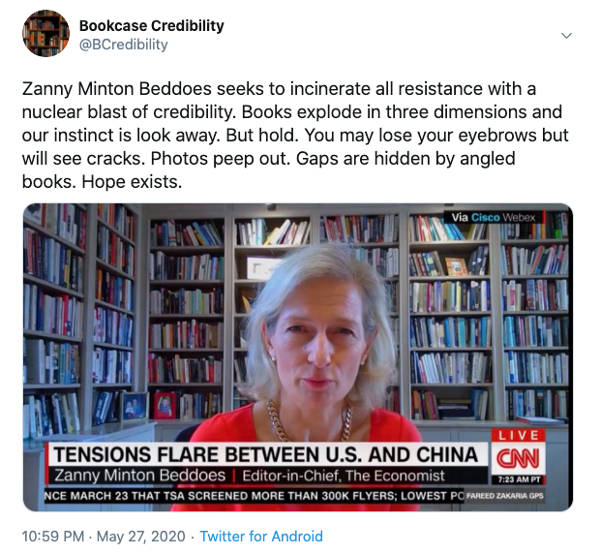
How many books do you have in your home library? And how many of them have you read? Share the ratio with us. Or post on Twitter, and tag us @foundingf. Or join our Slack channel and post it there. If you aren’t there already, here is the invite code.
And if you missed previous editions of this newsletter, they’re all archived here.
Bookmark Founding Fuel’s special section on Thriving in Volatile Times. All our stories on how individuals and businesses are responding to the pandemic until now are posted there.
Warm regards,
Team Founding Fuel
May 28: Collaborate, go virtual, create your own space
Good morning,
In Presence: An Exploration of Profound Change in People, Organizations, and Society, Peter M. Senge writes: “If you bring a certain kind of open, moment-to-moment, nonjudgmental awareness to what you’re attending to, you’ll begin to develop a more penetrative awareness that sees beyond the surface of what’s going on in your field of awareness. This is mindfulness. Mindfulness makes it possible to see connections that may not have been visible before. But seeing these connections doesn’t happen as a result of trying—it simply comes out of the stillness.”
Big changes hit us at a pace most of us are not used to these days. It’s hard not to keep reacting, as if we are playing a video game which penalises us for every second of inactivity. Yet, Senge points us to the value of being still, of observing without judging. It’s important, but not easy.
American psychologist Marshall Rosenberg once said: “The Indian philosopher J Krishnamurti once remarked that observing without evaluating is the highest form of human intelligence. When I first read this statement, the thought, ‘What nonsense!’ shot through my mind before I realised that I had just made an evaluation.”
Have a good day!
Here are three things we found interesting.
Collaborate
Since the lockdown, businesses, academia, state agencies and society have been innovating at a tremendous pace. We have pointed to some of them in this newsletter. But, what might one learn from what’s happening right now? In Founding Fuel, Rishikesha T. Krishnan & Srivardhini K. Jha offer six lessons one could draw. One of them is: “Collaboration and open innovation are even more valuable than before, particularly to appropriate the value out of innovation.” They write:
“Mylab hit the headlines in India for being the first company to offer an ICMR-certified PCR-based test kit to check for the coronavirus. Yet, Mylab was able to exploit the real potential of its product only when the Serum Institute, India’s largest vaccine manufacturer and also one of the largest in the world, became its strategic partner. One of Serum Institute’s distinctive advantages is scale—that is why it is part of multiple global initiatives to produce vaccines against the coronavirus. Adar Poonawalla, CEO of the Serum Institute, quickly helped Mylab tie up with biopharma major Syngene to ensure that some of the critical inputs to the product are readily available indigenously. All this happened within the space of two weeks. Coupled with Mylab’s expansion of its own capacity, this enabled it to expand production of testing kits to 200,000 per day by the middle of May 2020.
“Similarly, AgVa Healthcare, a Delhi-NCR-based producer of innovative low-cost ventilators, was able to scale-up manufacture of ventilators to 10,000 units a month thanks to a tie-up with Maruti Suzuki, India’s largest manufacturer of passenger cars. Without this scale, AgVa would be unable to fully exploit its innovative design.”
Go virtual
WSJ reports how some businesses—including WeTransfer, a file-sharing company, and Enel SpA, an Italian energy company—are using virtual offices to recreate some of the experiences that tend to happen in physical offices. The accidental meetings that take place near coffee machines, or the serendipitous conversations in the corridors, for example. Even academic institutions are adopting them.
WSJ writes: “The School of Communication Arts in London is on its second simulation since it closed its physical doors on March 16. Marc Lewis, the college’s dean, has committed to spending £10,000 on testing virtual office products to host lectures and keep connected to students.
“Students now use a platform called Walkabout to traverse their own digital offices—a perk they don’t receive in the real world—as well as hangouts such as a bar and a smoking area. Avatars don’t drink or smoke there, but the décor is designed to encourage more casual, spontaneous conversation. The hangout areas also act as de facto meeting spaces if other rooms are occupied.”
Create your own space
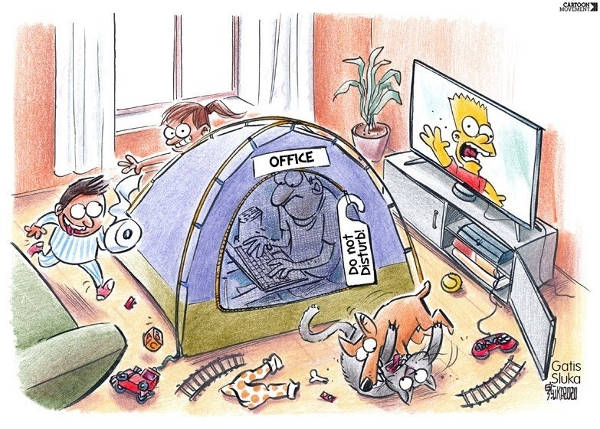
(Via Gatis Sluka / Facebook)
How are you managing? Share your tips with us. Or post on Twitter, and tag us @foundingf. Or join our Slack channel and post it there. If you aren’t there already, here is the invite code.
And if you missed previous editions of this newsletter, they’re all archived here.
Bookmark Founding Fuel’s special section on Thriving in Volatile Times. All our stories on how individuals and businesses are responding to the pandemic until now are posted there.
Warm regards,
Team Founding Fuel
MAY 27: BRING PEOPLE TOGETHER, EXPERIMENT, DON’T MULTITASK
Good morning,
In Better: A Surgeon's Notes on Performance, Atul Gawande writes:
“I did not write until I became a doctor. But once I became a doctor, I found I needed to write. For all its complexity, medicine is more physically than intellectually taxing. Because medicine is a retail enterprise, because doctors provide their services to one person after another, it can be a grind. You can lose your larger sense of purpose. But writing lets you step back and think through a problem. Even the angriest rant forces the writer to achieve a degree of thoughtfulness.
“Most of all, by offering your reflections to an audience, even a small one, you make yourself part of a larger world. Put a few thoughts on a topic in just a newsletter, and you find yourself wondering nervously: Will people notice it? What will they think? Did I say something dumb? An audience is a community. The published word is a declaration of membership in that community and also of a willingness to contribute something meaningful to it.
“So choose your audience. Write something.”
Dr Gawande’s prescription is good for any day. It’s especially good for these days when there is a pressing need to step back, think through the problems deeply and get a clearer understanding of our larger purpose.
Have a good day!
Here are three things we found interesting.
Bring people together
In a conversation at Wired, Arielle Pardes points out to a number of companies that plan to make remote working the norm—Twitter, Shopify, Facebook and others. But there are exceptions too, like Apple. Pardes says: “Apple, which has notoriously asked its employees to come into the office every day no matter what, it has a very meeting-dominant culture, has not made any overtures toward remote work. In fact, Apple is one of the companies that is encouraging workers to come back sooner rather than later. So it remains to be seen what the net effect of this is.”
Steve Jobs not only believed in face to face meetings, but also in serendipitous meetings inside offices. In Creativity Inc, Ed Catmull writes, “Steve’s first pass at a design was based on some peculiar ideas he had about how to force interaction among people. At an off-site staff meeting to discuss these plans in 1998, several people rose to complain about his intent to build a single women’s and a single men’s restroom. Steve relented, but he was clearly frustrated that people didn’t understand what he was trying to do: Bring people together out of necessity.”
Experiment
In our series of conversations that explore reset opportunities across businesses, Devangshu Dutta, chief executive of Third Eyesight, suggested that at a time when fashion trade shows were not happening, the apparel industry should start experimenting with virtual catwalks with live models.
Teen Vogue profiles Anifa Mvuemba who organised a show using 3D models on Instagram. Teen Vogue writes: “The designer selected Instagram as her platform in order to create access and give everyone a front row seat to the detail and delicacy of the clothes. ‘We know that some people may never experience a fashion week or Hanifa showcase, so we wanted to show up for our audience where they show up for us on a daily basis. That’s when Instagram became the obvious choice.’ Shortly after the show, screen recordings quickly made their way to Twitter and went viral.”
Twitter: https://twitter.com/nkirurka/status/1264020595295092739?
Don’t multitask
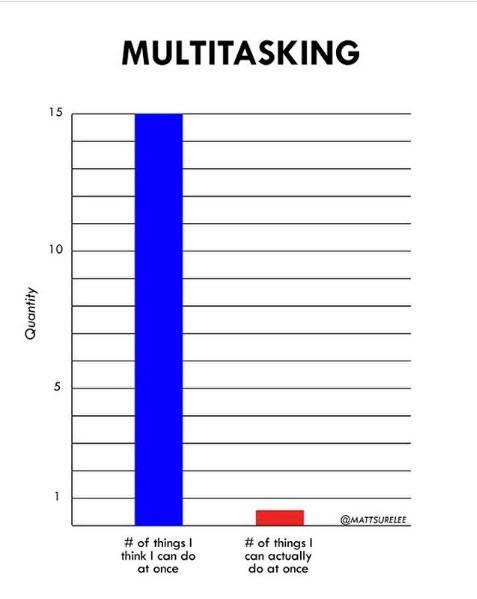
(Via WhatsApp)
Do you multitask? Tell us why, or why not. Or post on Twitter, and tag us @foundingf. Or join our Slack channel and post it there. If you aren’t there already, here is the invite code.
And if you missed previous editions of this newsletter, they’re all archived here.
Bookmark Founding Fuel’s special section on Thriving in Volatile Times. All our stories on how individuals and businesses are responding to the pandemic until now are posted there.
Warm regards,
Team Founding Fuel
May 26: Beware of narcissistic leaders, bridge the digital divide, focus right
Good morning,
In Zero to One: Notes on Startups, or How to Build the Future Peter Thiel writes: “People are scared of secrets (“something important, but unknown, something hard to do but doable”) because they are scared of being wrong. By definition, a secret hasn’t been vetted by the mainstream. If your goal is to never make a mistake in your life, you shouldn’t look for secrets. The prospect of being lonely but right—dedicating your life to something that no one else believes in—is already hard. The prospect of being lonely and wrong can be unbearable.”
This fear is one of the four reasons Thiel gives to explain why the world has stopped believing in secrets, stopped taking big bets, and settled for incrementalism.
The big question the world faces today is whether the coronavirus pandemic has reset our ambitions. Once we win our fight against the virus, will we start aiming high? Find a cure for cancer in five years? Advance sustainable development goals by a few years? Cut greenhouse gas emissions faster than we hoped for?
Have a fantastic day and week ahead!
Here are three things we found interesting.
Beware of narcissistic leaders
In Founding Fuel’s conversation on Labour Reset: The Foundations for a Just, Equitable & Humane Society, Arun Maira defined the ethical reasoning thus: “Ethical reasoning means it’s not about me, it's about us. And unfortunately, in business, we say, ‘look after the business. If the business is okay, if your shareholders are okay, then somehow, by some invisible hand, everybody's going to be okay. That is unethical selfish reasoning.”
For narcissistic leaders it’s not even about business, it’s about them. And it has a negative impact. Stanford Insights reports:
“Field studies have shown that narcissistic CEOs are more likely to engage in fraud and other types of white-collar crime, manipulate earnings, and pursue aggressive tax avoidance. And a 2013 study of US presidents found that those who scored higher on the narcissism scale were more likely to abuse their authority (not to mention, on a personal level, their marriage vows).
“Along with Bernadette Doerr of UC Berkeley, O’Reilly recently published the results of three experiments showing that narcissistic people in general have lower levels of integrity—meaning their words and deeds do not align—and that that they are more likely to lie, cheat, and steal in order to prove their special status.”
Bridge the digital divide
When Pinki Gupta, headmistress of Navyug School, Darbhanga House in Delhi, decided to lead her school’s efforts to teach students remotely, she knew it was an important step—even a missed day in school is hard to catch up, leave alone two months. But the transition was not easy. The Better India chronicles her journey.
“Leela Devi, mother of fifth grader Abhishek, shares that she had to ask her relatives to recharge her phone with a ‘data pack’ as they were in debt of forty thousand rupees this year. Their sole bread earner, her husband, lost his job in January. She described with sadness how she dug up old notebooks and tore their empty pages to stitch them together and make a new notebook for her son.
“Ram Singh, father of fifth grader Anamika, says that he had to initially borrow a mobile phone from his neighbour for Anamika’s studies. He would have to leave home in the mornings for his work as a driver and Anamika would not have access to his phone. But now, with a fixed morning schedule when Anamika is expected to use her phones, he does not have to borrow a neighbour’s device.”
There is a growing realisation that some of the problems associated with working/learning from home might not be easy to solve. Their persistence might push people back to schools and offices. At the same time, a large set of people would have discovered the benefits of digital. The mental shift most will be making is from digital vs physical to digital and physical.
Focus right
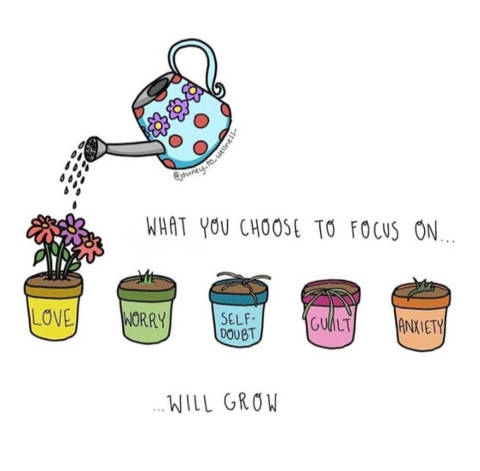
(Via WhatsApp)
How do you keep worry, self-doubt, guilt and anxiety from growing? Share your tips with us. Or post on Twitter, and tag us @foundingf. Or join our Slack channel and post it there. If you aren’t there already, here is the invite code.
And if you missed previous editions of this newsletter, they’re all archived here.
Bookmark Founding Fuel’s special section on Thriving in Volatile Times. All our stories on how individuals and businesses are responding to the pandemic until now are posted there.
Warm regards,
Team Founding Fuel
May 25 edition: Consider the opportunity cost of WFH, play it in reverse, make a statement
Good morning,
After he published A Force for Good: The Dalai Lama's Vision for Our World in 2015, Daniel Goleman was asked by HBR in an interview: “You’ve remarked that the Dalai Lama is a very distinctive kind of leader. Is there something we could learn as leaders ourselves from his unique form of leadership?”
Here’s a summary of Goleman's reply.
- Have a broad vision: The Dalai Lama is not beholden to any organisation. He thinks in terms of generations and of what’s best for humanity as a whole. So, he can take on the largest challenges, rather than small, narrowly defined ones. The lesson for us is to ask ourselves if there is something that limits our vision—that limits our capacity to care. And is there a way to enlarge it?
- Listen to all: He gathers information from everywhere. He meets with heads of state, and he meets with beggars. He’s getting information from people at every level of society worldwide. This casting a large net lets him understand situations in a very deep way—he can analyse them in many different ways and come up with solutions that aren’t confined by anyone.
- Be compassionate: The scope of the Dalai Lama’s compassion is an ideal that we could strive for. It’s pretty unlimited. He seems to care about everybody and the world at large.
The coronavirus crisis has reinforced these lessons by highlighting how closely all of us are connected. The growing discomfort we feel while working from home, the pangs of guilt that hit us when we see suffering of migrants and the poor, and the way our hearts cheer up when we listen to stories of courage and compassion are testament to the important lesson that Goleman has distilled from the life of the Dalai Lama.
Explore: How to Live a Good Life: A Guide to Choosing Your Personal Philosophy
Have a great week ahead
Consider the opportunity cost of WFH
Microsoft boss Satya Nadella recently cautioned against over celebrating the rise in productivity of employees working from home. Meetings start and end on time, he said. But, he misses the softer aspects of making connections with the person sitting next to you by talking for two minutes before and after the meetings.
In Mint, Rama Bijapurkar and Smita Affinawal show the other side of the picture, and that also offers us the same warning. They write:
“Decision-makers, likely older, with older children, better paid, hence living in larger houses with better quality household help, are deciding on WFH from their own contexts, oblivious of employee contexts of smaller homes shared by more family members now also having to double as work spaces, small children demanding attention when they see a parent, and lower quality household help. As for it being a working woman’s dream, ask them and you will find not all women can manage expected productivity and WFH—disturbing her is the default option if she is at home (surprising how problems resolve themselves when you are at the office!)”
Play it in reverse
Responding to Piyul Mukherjee’s audio / text piece on Netflix Party yesterday (in which she took her listeners back to social watching of movies at IIT Bombay), Anirudha Dutta, India Macro Analyst at Capital Group, narrates his IIT Kharagpur (KGP) experience.
“The cry in KGP used to be ‘Tarapado’. It was such a KGP thing that legend has it that even in remote corners of the world, a lonely KGPite would sometimes shout Tarapado in a movie theatre and would be delirious if someone else shouted back from the crowd, which was quite a common occurrence. The said Tarapado, who was employed in the lab I think of the electrical engineering department, passed away last year or thereabouts. KGP legend says he once played an entire movie in reverse to become the immortal legend he was.”
Make a statement
With your masks
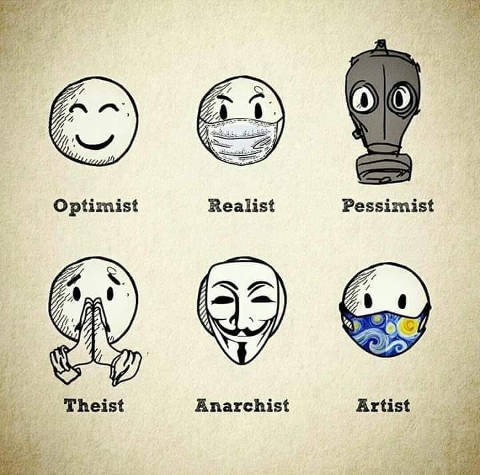
(Via WhatsApp)
What’s your favourite mask design, so far? Share it with us. Or post on Twitter, and tag us @foundingf. Or join our Slack channel and post it there. If you aren’t there already, here is the invite code.
And if you missed previous editions of this newsletter, they’re all archived here.
Bookmark Founding Fuel’s special section on Thriving in Volatile Times. All our stories on how individuals and businesses are responding to the pandemic until now are posted there.
Warm regards,
Team Founding Fuel
May 24: Take a break (by looking back), operate within the circle of competence, communicate visually
Good morning,
In one of his last papers, Prof Sumantra Ghoshal dealt with the question of corporate scandals and the role management theories played in propagating them. He wrote:
“A theory of subatomic particles or of the universe—right or wrong—does not change the behaviours of those particles or of the universe. If a theory assumes that the sun goes around the earth, it does not change what the sun actually does. So, if the theory is wrong, the truth is preserved for discovery by someone else. In contrast, a management theory—if it gains sufficient currency—changes the behaviours of managers who start acting in accordance with the theory. A theory that assumes that people can behave opportunistically and draws its conclusions for managing people based on that assumption can induce managerial actions that are likely to enhance opportunistic behaviour among people. A theory that draws prescriptions on corporate governance on the assumption that managers cannot be trusted can make managers less trustworthy. Whether right or wrong, to begin with, the theory can become right as managers—who are both its subjects and the consumers—adapt their behaviours to conform with the doctrine.”
Prof Ghoshal’s words resonate so well even today because the bad management theories, the wrong assumptions we make about people have not gone away. They persist in our minds and manifest in several ways—in our treatment of migrant workers, in the way companies have been firing employees over Zoom conversations, in the reluctance to accept the fact that the shape of the new economy we build should be very different from the one we have today.
Over the past few weeks and months, the Founding Fuel team and community have captured these concerns in stories and conversations. In case you missed it earlier, here are five.
- What employers don’t know about employee monitoring, by Charles Assisi
- Stories of compassion from a cauldron in Surat’s textile hub, by Piyul Mukherjee
- The used and discarded workers of India, by Arun Maira
- Suspending labour laws means paving a road to nowhere, by K Ramkumar
- The Satara uprising, by Anmol Shrivastava
Have a great Sunday.
Take a break (by looking back)
Thirty-two years ago, Arun Maira took some time off from his busy life in Mumbai to travel to Kashmir for a hiking expedition to Tarsar Lake. He kept a diary during that trip. Here’s a story and a poem from his diaries.
“I turned into my sleeping bag, and shut the tent flaps tight, to keep the cold out, and dreamt of the lake, blue in the sun, that the brochure had promised. I was awakened at night by the sound of thunder, rain pounding on the tent, and flashes of lightning piercing the dark. In the morning, the guide stuck his head in, to say that we would be locked in until the rain ceased. And, if the rain did not stop within two hours, we would have to return without reaching our destination, so that we could get to Srinagar in time for my flight to Mumbai. And back to my busyness.
“Then a miracle happened, and grace descended. I became no longer anxious about deadlines. It was like a ‘satori’—the flash of insight that Zen masters inspire—a sudden enlightenment. A poem emerged in my mind.
Peace
I planned the peak in the sun
I woke with rain on my tent
I switched off the engine
There was peace within
Operate within the circle of competence
The Atlantic spoke to some of the fans of Elon Musk about his tweets on the pandemic which included making bizarre predictions about how many people the virus will infect and downplaying its dangers. One of them is Ben Hallert, who owns Tesla stocks, admires SpaceX and loves talking about rockets. He had this to say about his idol.
“Sometimes it just seems like the smarter people are, the more vulnerable they are to overestimating how much they know about something outside of their specialty. If I’m an expert in X, then why wouldn’t I be an expert in Y?”
It’s an echo of what Plato said centuries ago. “Because they were good workmen they thought that they also knew all sorts of high matters, and this defect in them overshadowed their wisdom” (Apology)
Communicate visually
If you are wondering why your kids talk in emojis…
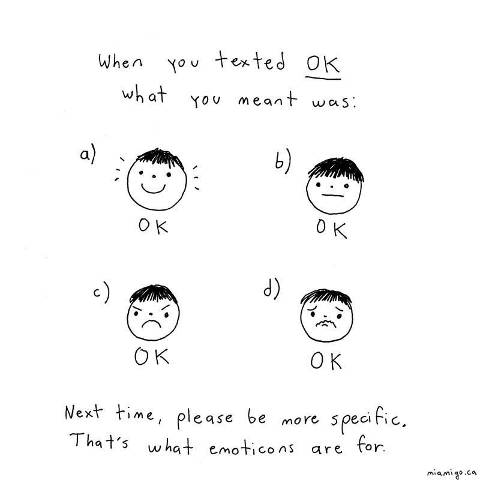
(Via High Intelligence Office on Facebook)
Take a minute to check your phone and let us know what your most used emojis are. Or post on Twitter, and tag us @foundingf. Or join our Slack channel and post it there. If you aren’t there already, here is the invite code.
And if you missed previous editions of this newsletter, they’re all archived here.
Bookmark Founding Fuel’s special section on Thriving in Volatile Times. All our stories on how individuals and businesses are responding to the pandemic until now are posted there.
Warm regards,
Team Founding Fuel
May 23: Keep up with the nextgen; explore, be fast; be aware of your biases
Good morning,
When Russi Mody passed away in 2014, some of the saddest drops of tears were shed by the workers at Tata Steel. He cared for them deeply. Firdose Vandrevala, one of the many leaders he identified and nurtured, recounted an incident to Prince Mathews Thomas for a Forbes India obit. Mody visited a plant where Vandrevala was the superintendent. “He just visited the workers’ toilets, found them neat, clean and hygienic, patted me on my back, said ‘Well done’, and left. He believed that if you took care of the workers, they would take care of the company.”
Mody’s own values and conviction came from JRD Tata who mentored him during his early days. Tata told him, “Russi, it’s not important to be the best steelmaker in the nation. It’s more important to do the best for the people who make it possible.”
Some of these stories are inspiring. They also carry a deeper lesson: It takes a long, long time and committed leadership to build such a culture that respects people. To paraphrase an investment adage, “the best time to start building a good corporate culture is 20 years back. But then the second-best time is now.”
Have a great Saturday.
Keep up with the nextgen
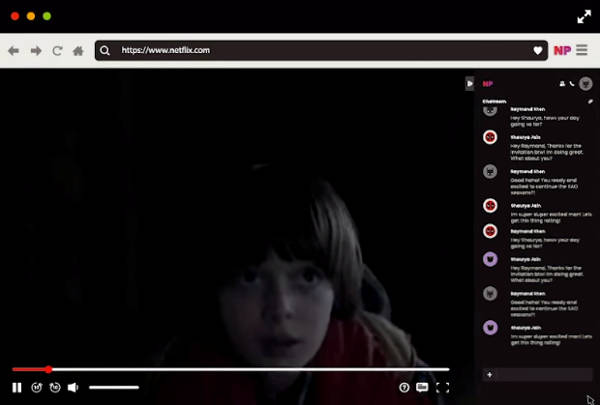
Piyul Mukherjee untangles the latest online phenomenon—Netflix Parties
“The more crazy and horrifying the streaming video, the more likely it will be viewed and shared over NP.
“In staid at-home lockdown times, chaos is a welcome break.
“Movie reviewers are behind the times. IMDb scores do not reflect the true picture of NP popularity. Nor does Rotten Tomatoes.
“Even Wikipedia that so blissfully threw out Encyclopaedia Britannica a while back, is behind the times. It still believes NP stands for ‘Non-deterministic Polynomial time’.
“During lockdown, at midnight, our whole old generation is likely to be caught napping. Not NPing.
“NP is fast emerging as the new Boroline, the balm of the next generation.”
Listen to the full explainer (6 minutes)
Participate in our Twitter poll
Explore, be fast
When the US-China trade conflict heated up under Donald Trump, many in India believed that India could benefit from their fight. It didn’t work that way. The eternal optimists expected something similar when China started shutting down its cities and towns, factories and ports in the wake of the coronavirus epidemic there. This time, capital went out of China but went to smaller countries such as Vietnam and Bangladesh. It has been very true for the apparel industry.
Last month Founding Fuel spoke with some of the best minds from the industry. Their insights apply to other industries as well.
Vineet Mehra: “For India, exporting means Western Europe and America. There is a huge market out there. What about Australia? What about Latin America?”
Devangshu Dutta: “We're a mercantile society. And yet, most of our best merchants are sitting in London, Hong Kong, Singapore, New York, Paris. If we can make it easier for them to be merchants based in India, we will see a lot more business flow into India.”
Deven Pabaru: “Somebody who's lean on inventory will bounce back much faster. This dovetails with digitization, with how agile you are. Your agility has to be planned for.”
Be aware of your biases
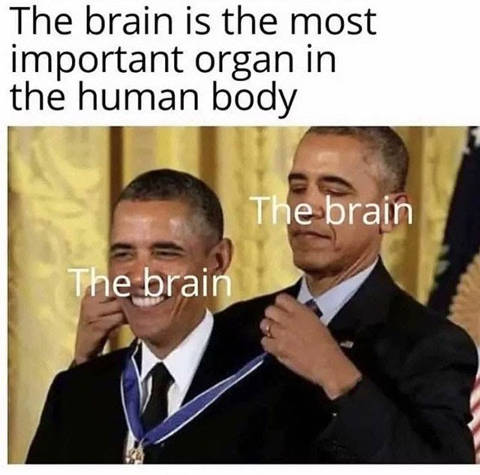
(Via WhatsApp)
What are your favourite tricks to overcome your own biases? Share your tips with us. Or post on Twitter, and tag us @foundingf. Or join our Slack channel and post it there. If you aren’t there already, here is the invite code.
And if you missed previous editions of this newsletter, they’re all archived here.
Bookmark Founding Fuel’s special section on Thriving in Volatile Times. All our stories on how individuals and businesses are responding to the pandemic until now are posted there.
Warm regards,
Team Founding Fuel
May 22: Rethink leadership, humanise your communication, find synergy
Good morning,
One of the most defining images of our times is that of a small kid fast asleep on a trolley bag even as his mother pulls it on a long road back home. It has now become a metaphor for the migrant labour crisis, which in turn is a symptom of our collective failure to create a just, equitable and humane society.
At Founding Fuel, as we discussed with our network, and among ourselves, it became evident that the crisis we face today has deeper roots. And, it’s our responsibility, our collective responsibility, to course correct.
The topic of yesterday’s deep conversation captured our hope and aspirations: Labour Reset: The Foundations for a Just, Equitable & Humane Society.
To discuss this we had a stellar panel including, Dr JJ Irani, former managing director of Tata Steel; Dinesh Trivedi, former union minister for railways; Arun Maira, former chairman of Boston Consulting Group and a former member of the Planning Commission; Partha Bhattacharya, former chairman of Coal India; and CK Sajinarayanan, national president of the Bharatiya Mazdoor Sangh (BMS), the country's largest trade union.
Besides the Founding Fuel team, the participants included some of the finest minds and leaders from business, academia and civil society. After listening to the panel for an hour, the participants broke into smaller groups, discussed a couple of key questions, and with their feedback the panel continued the discussion.
A couple of themes persisted throughout the two hour discussion. That we are facing an unprecedented crisis, the crisis emerged out of the problems that cannot be solved in silos, or by any individual or a group, we need to work together, and work differently—with compassion, with a moral purpose, and with determination. We can use this crisis to lay the foundation for a just, equitable and humane society.
The conversation was deep, insightful and inspiring. And we will soon be sharing a video recording of the event. Once it’s up, we would love to listen to your feedback, fully aware that we are all in this together.
Besides that, here are three things we found interesting.
Rethink leadership
As businesses experiment with collaborative tools and remote working technologies, and as employees get better at working from home, we will soon be asking some fundamental questions.
If it’s possible to collaborate effectively with people whom you don’t see face to face, and if the boundaries between office and home are getting erased, what’s stopping people from becoming gig workers, and what’s stopping businesses from getting their work done entirely through an army of ever changing contract workers?
In fact, the very same question came up a few years ago, when Founding Fuel worked with SPJIMR to organise the b-school’s Industry-Academia Conclave. The question was blunt. Is the concept of an employee dead? The answers were insightful and have gained relevance over time.
Prof Mohanbir Sawhney, Kellogg School of Management: The idea that all employees are free agents is futuristic. However, there is virtual free agency within organisations as employees collaborate virtually. Besides, you are responsible for your own learning agenda. Learning is becoming more and more self-driven. There is more ownership.
Larry Paulson, vice president and president, Qualcomm India: If you say the employee is dead what replaces it? If you think you're going to fill your system up with a hundred thousand independent contractors, doing what they want to do on a daily basis, that will never work.
Haresh Chawla, partner, True North: I don't think the employee is dead. I think leadership, the way we used to run it, is dead. Earlier, CEO, middle management, employee vantage points were different. But now everybody has the same information. So why should a CEO be in a better position to take a natural repeatable decision than his employee? So, I think the rules of leadership have to change.
Watch the full video:
Humanise your communication
In a Harvard Business Review article titled, ‘Don’t Let Digital Transformation Make You Less Human’, Martin Lindstrom tells this story from 2015.
“When the Baltic Sea froze over in 2015, it really was a case of force majeure, but Maersk’s customers still complained. The call center agents tried to explain, often without success. But then the company had its ship captains take photos of the difficulty of navigating through the ice. It posted the photos on a Twitter account, ‘WinterMaersk’, and cell agents pointed people to the account. Many customers suddenly appreciated what it took to deliver their cargo and weren’t so upset over delays. The company gave that newfound sympathy partial credit for securing an uptick in orders the following year.
Find synergy

But don’t try this at home. (Via WhatsApp)
How are you managing to keep yourself in top shape for concalls? Share your tips with us. Or post on Twitter, and tag us @foundingf. Or join our Slack channel and post it there. If you aren’t there already, here is the invite code.
Bookmark Founding Fuel’s special section on Thriving in Volatile Times. All our stories on how individuals and businesses are responding to the pandemic until now are posted there.
Warm regards,
Team Founding Fuel
May 21: Learn with your hearts, keep a journal, thank the teachers
Good morning,
In Solving Tough Problems: An Open Way of Talking, Listening, and Creating New Realities, Adam Kahane writes:
“To solve a complex problem, we have to immerse ourselves in and open up to its full complexity. Dynamic complexity requires us to talk not just with experts close to us, but also with people on the periphery. Generative complexity requires that we talk not only about options that worked in the past, but also about ones that are emerging now. And social complexity requires us to talk not just with people who see things the same way we do, but especially with those who see things differently, even those we don’t like. We must stretch way beyond our comfort zone.”
Some of the problems we are trying to solve—poverty, inequality, climate change—have always been wicked problems. The coronavirus pandemic has made them not only tougher but also immediate. One only has to look at the tragic images of migrants crowding at a location to get their coupons for a seat in trains, or, having given up on the state, society and market to take care of them, walking hundreds of kilometres to be close to their families to realise that we are all closely connected.
These images are only symptoms of deeper problems. We can’t wish them away. How are we to solve them? Adam Kahane would suggest that we start by listening to people who are ‘not like us’.
Let’s keep our hearts open.
Learn with your hearts
Meeta Sengupta, writer, speaker and advisor on education, shares ten insights that emerged out of online classes across countries and all levels. These lessons also reveal something deeper about how human beings learn and evolve. One of them highlights how learning is essentially social. Sengupta writes:
“When we learn, it is the emotional component that is added to the learning experience that is more sticky than the content. Experiential learning experts will tell you that a play performed on say, Shivaji, or Lady Diana, will have given the students a deeper understanding of the issues that played out in history, than merely knowing the story. Teachers and school heads who have conducted online lessons report that student engagement is so much higher on the social aspects of the classes. They appreciate the care, the concern, and the real aspects of learning together much more than normal dry lectures.”
However, social learning is not just about social chit chat, she writes. It’s about “making the world a better place—which is what it should have been all along.”
[Note: We are happy to share that we have invited Meeta Sengupta to take a stab at a new interesting dilemma as part of our Sounding Board column. You can read the archives here.]
Keep a journal
When decades happen in a few months, there is always something interesting and important going on that demands our attention. Thus, we are constantly staring at our screens—catching up on something or catching up with someone, collecting information that we hope will help us survive and give us an edge. When we pause to take a breath we wonder what’s happening to our lives and get worried. And we end up jumping back to our work as if it’s an escape.
In a fascinating piece in ESPN, Michael Phelps reveals:
“When I was swimming, the pool was my escape. I would take all that anger and use it as motivation. But now that escape is gone. I've learned in those moments it's important to try to take a step back. Take a deep breath. Go back to square one and ask yourself: Where these emotions are coming from? Why are you so angry? That's something I learned in treatment. That's something I try to teach my three boys. But when you're in that mood, you don't always want to do what's ‘right’ or what you know you should do. I try to write notes on my mirror with a dry-erase marker. There are motivational quotes throughout my office I use to help me. And I journal. I have 20 to 30 pieces of scrap paper all over where I write things down that pop into my head or I want to remember to help me later.”
Thank the teachers
Here’s a tribute to teachers that’s making the rounds on WhatsApp, Instagram and Twitter.
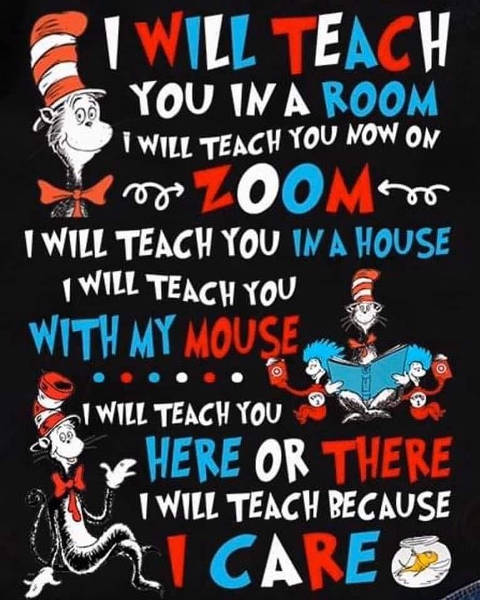
Have you seen ‘the cat in the hat’ before? Tell us about that experience. Or post on Twitter, and tag us @foundingf. Or join our Slack channel and post it there. If you aren’t there already, here is the invite code.
And if you missed previous editions of this newsletter, they’re all archived here.
Bookmark Founding Fuel’s special section on Thriving in Volatile Times. All our stories on how individuals and businesses are responding to the pandemic until now are posted there.
Warm regards,
Team Founding Fuel
May 20: Embrace uncertainty, be inclusive, cut the carbs
Good morning,
In Bulletproof Problem Solving: The One Skill That Changes Everything, authors Charles Conn and Robert McLean, who have decades of experience as consultants with McKinsey, write:
“Over the course of our careers, we have seen the focus of organisational capability aspirations shift through distinct eras: from strategy to execution to complex problem-solving. The 70s and 80s were characterised by an intense interest in strategy development. That was displaced by an era from the 90s onward that focused on execution, including deep attention to getting things done, as exemplified by the book Execution by Ram Charan and Larry Bossidy, and a number of books on business process redesign. However, a ruthless focus on execution assumes you have the strategic direction right and can adapt to new competition, frequently from outside your industry. This can no longer be assumed.

“As this new era of the problem-solving organisation takes hold, we expect it will trigger even more interest in how teams go about sharpening complex problem solving and critical thinking skills.”
The coronavirus pandemic has compressed decades into a few months and has demolished some of the fundamental assumptions we have made about the world. It means only one thing. The borders between the three phases have vanished, and business leaders today will have to focus on all the three: strategy, execution and complex problem-solving.
That’s the challenge we face today, and you will find some answers in our Thriving in Volatile Times collection. Do take a look, and share your views with us.
Embrace uncertainty
The latest column by Charles Assisi starts suspensefully. “Soon after the lockdown was enforced, a practising psychologist told me he was bracing to counsel people impacted mentally by it. I filed that conversation away, thinking I’d write about it sometime, once corresponding data had emerged. What I hadn’t imagined was that 50-odd days into the lockdown, it would hit so close to home.”
It has an important insight to offer.
“In the current crisis, there is fear and uncertainty. All of us deal with uncertainty in different ways. People like me adopt a know-it-all approach. That is why, I guess, I find myself scouring for data. Existing data has failed me. I need new data to help me comprehend the world.
“(Leo) Babauta would say I am setting myself up for failure. Instead, he suggests, acknowledge the uncertainty, and the fear. Doing that is half the battle won.”
Be inclusive
The News Minute reports that Tamil Nadu plans to distribute 81,000 transparent masks to around 13,500 persons with disabilities and their relatives, friends, colleagues and classmates, which will allow them to communicate safely.
This is how it looks.
It has been our effort to reach out to every person with different abilities. Tamil Nadu becomes the first State to pilot transparent masks that enable lip reading for children, parents and their teachers @CMOTamilNadu @DrVSarojaoffl @socialpwds @Vijaykarthikeyn pic.twitter.com/RkBlJG2glo
— Johny Tom Varghese (@JohnyTvarghese) May 17, 2020
Cut the carbs
Keeping yourself fit is important these days, but this is not how you do it.
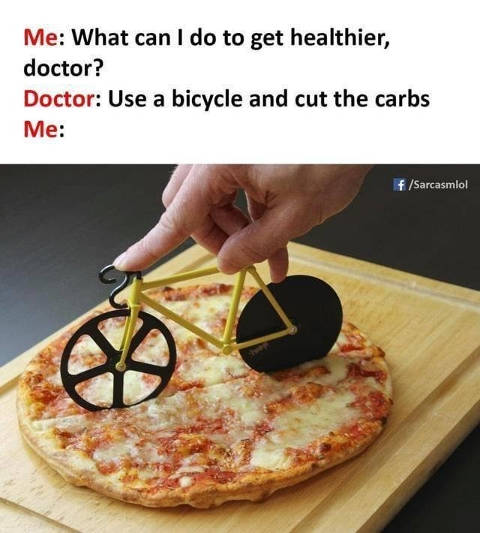
(Via WhatsApp)
How are you keeping yourself fit during the lockdown? Share your tips with us. Or post on Twitter, and tag us @foundingf. Or join our Slack channel and post it there. If you aren’t there already, here is the invite code.
And if you missed previous editions of this newsletter, they’re all archived here.
Bookmark Founding Fuel’s special section on Thriving in Volatile Times. All our stories on how individuals and businesses are responding to the pandemic until now are posted there.
Warm regards,
Team Founding Fuel
May 19: Create well-being, go mobile, simply fly
Good morning,
In Deep Work: Rules for Focused Success in a Distracted World, Cal Newport writes:
“Deep work, of course, is not limited to the historical or technophobic. Microsoft CEO Bill Gates famously conducted ‘Think Weeks’ twice a year, during which he would isolate himself (often in a lakeside cottage) to do nothing but read and think big thoughts. It was during a 1995 Think Week that Gates wrote his famous ‘Internet Tidal Wave’ memo that turned Microsoft’s attention to an upstart company called Netscape Communications.
“And in an ironic twist, Neal Stephenson, the acclaimed cyberpunk author who helped form our popular conception of the Internet age, is near impossible to reach electronically—his website offers no e-mail address and features an essay about why he is purposefully bad at using social media. Here’s how he once explained the omission: ‘If I organise my life in such a way that I get lots of long, consecutive, uninterrupted time-chunks, I can write novels. [If I instead get interrupted a lot] what replaces it? Instead of a novel that will be around for a long time … there is a bunch of e-mail messages that I have sent out to individual persons.’ ”
During the lockdown, when we are working from home, it might seem impractical (and ironic) to suggest to keep your electronic items away. But, that might just be the right thing to do, so we don’t miss out on the work that needs to be done with zero distractions.
If you are wondering how, our Masterclass with Nir Eyal has some practical tips.
Create well-being
In his latest essay, Arun Maira explains why withdrawing constitutional protections of Indian workers, apparently to attract foreign investors, is fundamentally flawed. He writes:
“A faulty paradigm had become ascendant amongst economists around the world since the 1980s. It propagated the view that governments are a problem, and that social welfare weakens economies. It decoupled economies from societies. In this paradigm, humans are only statistics in economists’ calculations; they are tools to grow GDP, and disposable when they can be replaced by more productive (and less emotional) machines. This paradigm strayed away from the fundamental purpose of progress in human civilization—which is not to grow the size of economies, but to create well-being for human beings. And ‘leave no one behind’ as the Sustainable Development Goals (SDGs) aspire for.”
Go mobile
In 2018, Big Basket ran a pilot using vending machines from a company called Kwik24 in a few large residential buildings in Bangalore. The idea was to let the residents use a cashless unmanned store that can operate 24X7 right inside the complex. The pilot was a success. 90% of the customers who tried it came back. Eventually, Big Basket acquired Kwik24 and was looking to install them in more apartment complexes.
Then came the pandemic and the lockdown.
Now, Big Basket has quickly borrowed an idea from the banking sector—mobile ATMs. Banks used trucks carrying the ATMs to serve a cluster of villages.
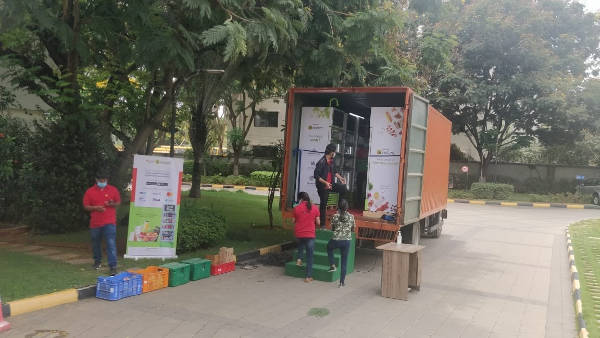
(A Big Basket truck with vending machines at a residential complex in Bangalore. Photo by CS Swaminathan)
Big Basket trucks come with vending machines stocked with grocery and limited vegetables and fruits. The vending machines operate through an app on the customer’s phone. Customers scan the shelves with their phones for the shelves to open. When they pick an item, it’s automatically added to their digital shopping cart. When they leave the truck, IoT sensors take note, and bill amount is deducted automatically.
Simply fly
We didn’t get it on WhatsApp, we kid you not. These are three slides from Masayoshi Son’s Softbank’s earnings presentation (pdf).
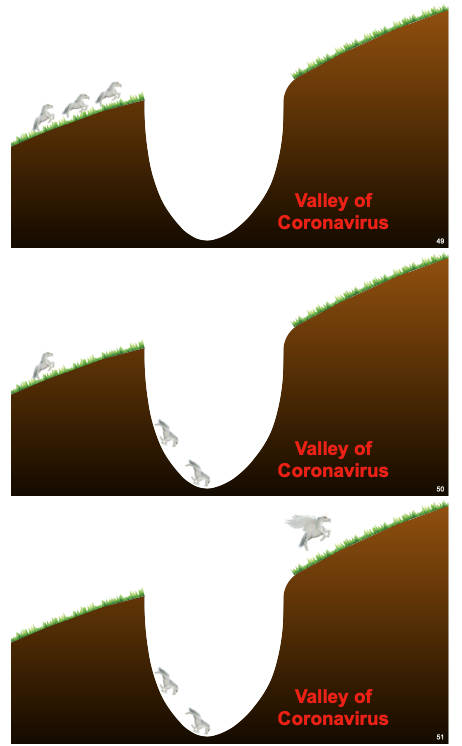
How are you navigating the valley of coronavirus? Share your stories with us. Or post on Twitter, and tag us @foundingf. Or join our Slack channel and post it there. If you aren’t there already, here is the invite code.
And if you missed previous editions of this newsletter, they’re all archived here.
Bookmark Founding Fuel’s special section on Thriving in Volatile Times. All our stories on how individuals and businesses are responding to the pandemic until now are posted there.
Warm regards,
Team Founding Fuel
May 18: Read wisely, but not too much; watch out for reputational risk; focus on what you can control
Good morning,
In his classic text, Management: Tasks, Responsibilities, Practices, Peter F. Drucker talks about the importance of mistakes and failures.
“A performance record must include mistakes. It must include failures. It must reveal a man's limitations as well as his strengths. And there are as many different kinds of performance as there are different human beings. One man will consistently do well, rarely falling far below a respectable standard, but also rarely excel through brilliance or virtuosity. Another man will perform only adequately under normal circumstances but will rise to the demands of a crisis or a major challenge and then perform like a true ‘star’. Both are ‘performers’. Both need to be recognised. But their performances will look quite different.
“The one man to distrust, however, is the man who never makes a mistake, never commits a blunder, never fails in what he tries to do. He is either a phony, or he stays with the safe, the tried, and the trivial.”
One of the impacts of the pandemic might show up in the way we respond to mistakes and failures. Stressed out, averse to taking risks, and vigilant, we might be stricter than usual about others’ and our own mistakes. Drucker would say, we shouldn’t be.
Have a great week ahead.
Here are three things we hope you will find useful and interesting.
Read wisely, but not too much
On Founding Fuel, Charles Assisi has put together a high-quality media consumption list for you based on a number of conversations and much thought. He explains the idea behind the compilation thus:
“Much like our mind and body needs food, our soul needs good content.
“Now, the thing about food is, there’s a lot of it out there. And that a lot of food is not good. Because there’s good food and junk food. And what’s junk must be avoided.
“Convention has it the more content we consume, the smarter we get. But if the food analogy be extrapolated here, how absurd this assertion is makes itself obvious. More is not good. Instead, it makes our minds stupid and depletes the soul—much like junk food makes our bodies obese.
“The challenge we now face is to sift through to find what we absolutely need.”
Watch out for reputational risk
Two or three months down the line, will you walk into a restaurant that you have never heard about? Or pick up a food item with a brand name you are not familiar with? The coronavirus pandemic has made us all very wary about the safety of food items. Food-fraud will make us even more indignant, customers will be unforgiving, and authorities will be stringent.
All these point to a big opportunity, a report in Bloomberg argues, citing examples from China.
- Walmart, which has 400 stores in China, uses blockchain to track pork, and will use the technology for more products.
- Zhong An Information and Technology Services uses the tech to track chickens from coop to the store.
- Alibaba Group will work with food suppliers in Australia and New Zealand.
The story also warns that technology cannot completely solve the problem. It will be a cat and mouse game, as it is with most frauds and security issues.
Focus on what you can control
It’s updated post-lockdown period.
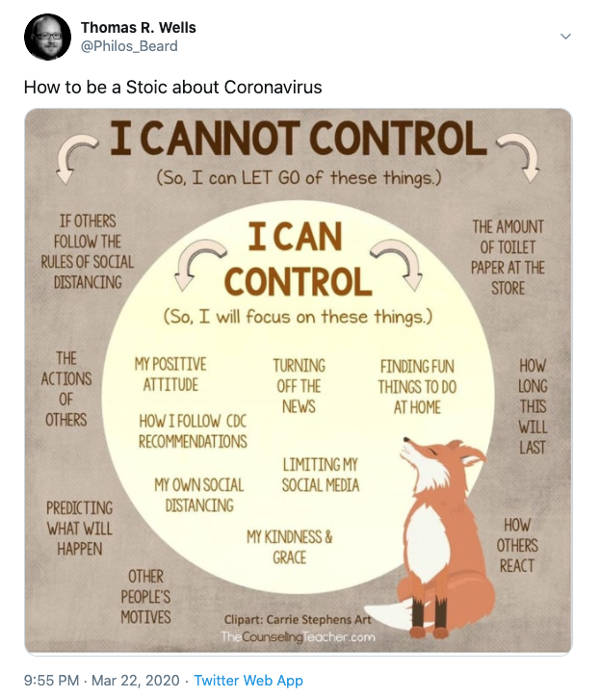
(Via Twitter)
One of the suggestions here is to turn off the news. Will you? Why or why not? Please tell us about it. Share your stories with us. Or post on Twitter, and tag us @foundingf. Or join our Slack channel and post it there. If you aren’t there already, here is the invite code.
And if you missed previous editions of this newsletter, they’re all archived here.
Bookmark Founding Fuel’s special section on Thriving in Volatile Times. All our stories on how individuals and businesses are responding to the pandemic until now are posted there.
Warm regards,
Team Founding Fuel
May 17: Be a valuable leader; ask 'why not both?'; be kind, be creative
Good morning,
In a 2013 discussion paper, Human Asset Strategies in Manufacturing Sector, the Planning Commission and Bain & Co quoted an earlier report on an approach to human resource management.
“Human resources are of critical importance for the growth of knowledge and technology, value addition, and improvement of competitiveness in manufacturing through processes of continuous improvement. The human resource is the only ‘appreciating resource’ in a manufacturing system—it is the only resource that has the motivation and ability to increase its value if suitable conditions are provided, whereas all other resources—machines, building, materials, etc.—depreciate in value with time. The best enterprises view their people as their prime asset and the source of their competitive advantage.”
The discussion paper goes on to say, “When human resource management is approached from this perspective, primacy is given to good industrial relations, skill development and retention of talent, with an emphasis on driving productivity rather than on reducing the cost of labour. Looking at India’s workforce challenges in terms of developing human assets may help to engage all relevant stakeholders in a more collaborative process and drive consensus on the issues and trade-offs identified above.”
As the country debates suspension of labour laws by some states, it’s key to go back to basics. Don’t treat labour as if it’s just a number, a replaceable commodity, but as human beings who need to be treated with respect, love and dignity. Don’t treat laws as necessary and sufficient condition to run your business. It’s necessary, but not sufficient. To build “a more just, equitable and humane society” we need to do a lot more.
How does one take this forward? At Founding Fuel, we are putting together a bunch of practical ideas that will help all of us through the journey. We will keep you updated.
Wish you a happy Sunday
Here are three things we found interesting.
Be a valuable leader
In The Wall Street Journal, Sam Walker, author of The Captain Class: A New Theory of Leadership, writes about The Last Dance, a docuseries on Chicago Bulls, and takes a stab at the eternal question on its charismatic superstar Michael Jordan. Was he a brilliant leader, or a merciless tyrant? His answer is interesting:
“On the elite teams I’ve known, the real leaders are rarely superstars. They work quietly, in and out of public view, doing the messy, thankless, unglamorous jobs that bind teams together. ‘The Last Dance’ hasn’t changed my mind about that. Michael Jordan may have been the biggest personality and most valuable player on the Bulls. But he wasn’t the most valuable leader.”
Who, then was its most valuable leader? The team’s captain Bill Cartwright.
“As a captain, Cartwright’s job was to rebuild something Jordan had constantly undermined: the team’s connection and camaraderie. He was a mentor to younger players, who called him ‘Teach’.
“ ‘My role was to be an anchor,’ Cartwright said in a 2016 interview for my book, which profiled leaders of elite sports teams. ‘It was about stability. I’m the guy who was always there early for practice, stayed after, talked to guys and took care of myself.’ ”
Ask ‘why not both?’
Richard Stengel, author of Mandela's Way: 15 Lessons on Life, Love and Courage, said in an interview: “I used to ask him questions like, ‘You embraced military manoeuvres as a revolutionary because you thought you could topple the government or [because] you just wanted good PR for the fact that you guys were frightening?’ His answer used to be, ‘Why not both?’ For Nelson Mandela, it’s never either, or. It’s always and, and both.”
In an interview with Anuradha SenGupta, Karan Johar indicated that it’s a good strategy for the film industry too, which is debating on the question, theatrical release, or OTT (over-the-top, or streaming media services).
“Both are very empowered verticals of entertainment. Both are very strong pillars. Both have an audience base… worldwide it has been acknowledged and accepted that an OTT platform release is also going to give you the strength, going to give you the numbers, the access, the watchability factor. It’s all going to be achieved. So there is a lot of power in the OTT platform as well. And there is tremendous power in cinema. So both can coexist.”
Be kind, be creative
We found this on Twitter, a living examples of the Dalai Lama's words: “Be kind whenever possible. It's always possible.”
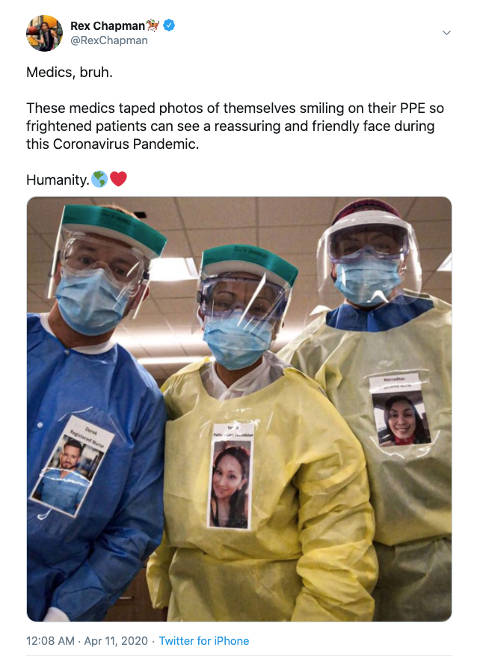
Have you noticed simple acts of kindness around you? Tell us about it. Share your stories with us. Or post on Twitter, and tag us @foundingf. Or join our Slack channel and post it there. If you aren’t there already, here is the invite code.
And if you missed previous editions of this newsletter, they’re all archived here.
Bookmark Founding Fuel’s special section on Thriving in Volatile Times. All our stories on how individuals and businesses are responding to the pandemic until now are posted there.
Warm regards,
Team Founding Fuel
May 16: Study data and say it with charts, learn from the virus, thank the healthcare workers
Good morning,
In The Elephant Catchers: Key Lessons for Breakthrough Growth, Subroto Bagchi shares a story from his Wipro days. When Wipro initiated Six Sigma, the company chose Motorola to train the senior management on the know-how. One of the guiding principles of Six Sigma was to embrace quality in a personal way. Azim Premji took the project as his own. Bagchi writes:
“He considered meetings as his product or service, and participants in the meetings as his customers. At the end of every meeting, Premji started giving out feedback forms that rated the quality of the meeting on various parameters. The forms were returned to 'Mission: Quality', where we analysed them and went back to Premji on the defect levels of the meetings and a root-cause analysis so that his meetings could be 'measured, analysed, controlled and improved' as per the principles of TQM. The exercise excited curiosity and drew chuckles in the beginning but soon the entire organisation got the message that at Wipro quality was taken extremely seriously and could never be compromised on in any area of work.”
Bagchi's point is, every change demands personal commitment from the leader.
Here are three things we found interesting:
Study data; say it with charts
After the Crimean War ended, Florence Nightingale, who had by then become famous as 'lady with the lamp', sailed back to England. Her work didn't stop. Joshua Hammer writes in Smithsonian Magazine:
“With William Farr, a mentor and noted government statistician, she gathered data from military hospitals in Constantinople that verified what she had long suspected: Nearly seven times as many British soldiers had died of disease in the Crimean War than in combat, and the deaths dropped dramatically once hospitals at the front were cleaned up. She also collated data from military hospitals in Great Britain, which revealed that these facilities were so poorly ventilated, filthy and overcrowded that their mortality rates far exceeded those at Scutari following the changes implemented by the Sanitary Commission. ‘Our soldiers enlist to death in the barracks,’ she wrote.”

Here's one of the charts Farr and Nightingale published to show that disease killed more soldiers.
Learn from the virus
In Spectator, Rory Sutherland, vice chairman of Ogilvy UK, and author of Alchemy, points out what the coronavirus can teach us about complexity. He writes:
“Behaviour is contagious because we catch it from other people. Much of what we do results from unconscious mimicry of others around us. As in virology, people’s susceptibility varies. If you do not own a microwave now, it is unlikely that you will ever buy one—you are effectively immune. Sometimes, too, a behaviour spreads rapidly at first, but dies off equally fast—as with leg-warmers, deely-bobbers and wine boxes.”
The idea that much of "what we do results from unconscious mimicry of others around us" has a huge influence on some of the smartest people, including Peter Thiel. Thiel picked it up from René Girard, his professor at Stanford, and developed his contrarian investment philosophy around that idea. One of the lesser-known projects of the Thiel Foundation is Imitatio, “conceived as a force to press forward the consequences of René Girard’s remarkable insights into human behaviour and culture."
Dig deeper
Thank the healthcare workers

(Via WhatsApp, art by Banksy)
Do you have stories about these super-heroes? Share your stories with us. Or post on Twitter, and tag us @foundingf. Or join our Slack channel and post it there. If you aren’t there already, here is the invite code.
And if you missed previous editions of this newsletter, they’re all archived here.
Bookmark Founding Fuel’s special section on Thriving in Volatile Times. All our stories on how individuals and businesses are responding to the pandemic until now are posted there.
Warm regards,
Team Founding Fuel
May 15: Focus on culture, seek systemic change, practice physical distancing
Good morning,
In Listening for Well-Being, Arun Maira writes about an interesting dilemma:
“When I was in college over 50 years ago, I participated in a debate. The subject was Bertrand Russel’s famous comment: ‘I would rather be Red than dead.’ I got the subject slightly wrong. I thought it was, ‘I would rather be read than dead.’ Those who had got it right spoke about the pros and cons of communism. Some went deeper to debate whether one should give up one’s convictions to survive and join the Reds if to oppose them would be fatal.
“Mistaking red for read, my concern was with the dilemma of a person who wants to change the tide. He must speak up and be heard to have any influence on public values. However, if by being heard, he risks being permanently silenced before he can influence any change, then what is the use of speaking up? On the other hand, if he chooses to conform so that he can survive to be heard, what will he say? What will become of his own values?”
Maira tells this story in today’s context when many believe that to be heard one has to dumb down, shout and sensationalise. But what if you want to make a case for deep listening, dialogues and deliberation?
It’s a dilemma worth thinking about when the importance of deep listening, dialogues and deliberation has never been higher, and the tendency to dumb down has never been stronger.
Three things we found interesting:
Focus on culture
Hygiene, distancing, screening, and masks have become the four pillars of strategy to fight the coronavirus across the world. Atul Gawande, surgeon and author, writes in The New Yorker that we have to include one more. Culture. “It’s one thing to know what we should be doing; it’s another to do it, rigorously and thoroughly,” he writes:
"Culture is the fifth, and arguably the most difficult, pillar of a new combination therapy to stop the coronavirus. People tend to focus on two desires: safety and freedom; keep me safe and leave me alone. What Doyle says she needs her people—both staff and residents—to embrace is the desire to keep others safe, not just themselves. She needs them to say, ‘I’m worried about my sore throat, and I am going to stay home.’ Or ‘I am O.K. with being reminded to pull my mask up.’ That is the culture of the operating room. It’s about wanting, among other things, never to be the one to make someone else sick."
Seek systemic change
Mithali Raj, who made her ODI debut in 1999, and now captains the Indian women's national cricket team, shares what changed in Indian women's cricket over the last 20 years. (For context, as Sanjay Manjerekar puts it, women’s cricket “has sky rocketed in the last few years”.) Mithali's answer has some crucial lessons for businesses aiming to nurture women leaders.
Mithali says: There are many factors that played a role in getting women’s cricket where it is.
- Access to better grounds. Earlier, women were playing in underprepared wickets, etc.
- Better training facilities. Earlier, they practiced in cement wickets.
- Access to international stadiums for even domestic cricket. It elevates the game.
- Access to academies—helps you get enrolled when you are younger, and you get personal, one-on-one coaching in better facilities.
- Better contracts. Ensures higher earning for players from humble backgrounds. Earlier, we have lost good players because the potential to earn money was low.
- Managers and coaches. Earlier, women's cricket had a single coach and a manager. Now it's almost the same as the men’s team.
In short, better infrastructure, better training, better pay, better management bandwidth.
Watch the full interview.
Practice physical distancing

(Via WhatsApp)
How easy has it been for you to practice it? Do you carry an umbrella? Share your answers with us. Or post on Twitter, and tag us @foundingf. Or join our Slack channel and post it there. If you aren’t there already, here is the invite code.
And if you missed previous editions of this newsletter, they’re all archived here.
Bookmark Founding Fuel’s special section on Thriving in Volatile Times. All our stories on how individuals and businesses are responding to the pandemic until now are posted there.
Warm regards,
Team Founding Fuel
May 14: Do what’s right, adapt, pivot
Good morning,
After the initial excitement about video conferencing and webinars, there is a general feeling of wariness about virtual meetings and conversations. “Zoom fatigue” is now a serious subject of study for psychologists. #Webinaritis is a popular hashtag on Twitter. And students in some universities in the East and in the West have been demanding refunds because they are not happy with online lectures.
Making online learning more engaging, more meaningful and immensely valuable is a big challenge of these days. At Founding Fuel, long before the coronavirus pandemic hit the world, we have been working to solve the problem. Our Masterclass series is a result of those efforts.
More recently, we tried a refreshingly new format—Thinking Room. It uses some of the features offered by Zoom. But, it’s never about technology alone. Technology comes to life only when it comes in contact with people. And the idea behind Thinking Room is to bring together a small group of leaders and let the insights emerge organically, building on each other’s experiences and ideas.
We are happy to present the inaugural session of Thinking Room, led by Kaushik Gopal, a business psychologist who has worked as an executive coach and a consultant in leadership. Please watch it, and let us know what you think.
Three things we found interesting.
Do what’s right
Berkshire Hathaway's Ajit Jain once said he likes working with Warren Buffett because Buffett “gives importance to the quality of decisions made before the outcome is known and not to the outcome itself.” However, it’s tough to assess the quality of decisions. What everyone else is doing might be a good indicator for which restaurant to eat when you go to a new place, but, often it’s not a good guide for ethical decisions. As a quote attributed to St Augustine goes, “Wrong is wrong, even if everyone is doing it. Right is right, even if no one is doing it.”
In a fascinating conversation with Shiv Nadar Foundation’s Saurav Adhikari, Harvard professor Srikant Datar shares a lesson he learned early on from his father. He says:
“My father taught my brother and me to be disciplined and to always act honorably with courage and integrity. And I remember a story from my childhood that I still reflect on to this day.
“I must have been 12 or 13 years old and was invited by a friend to a birthday party at the racecourse. And we wanted to have a little fun betting. My friend told me, bring your own money. I thought that was a fun idea so I asked my father if he would give me five rupees. He quickly and firmly said, ‘no’. I told him that it would be too embarrassing for me to go to the party without money, and I wouldn't go.
“He said, ‘Well, that's your decision, but let me tell you why I am saying no.’ It was not because he was worried that I would lose the money. In fact, he said, if he was sure that I would lose, he would give me the money in a heartbeat. His big worry was that I would win and learn from it a terrible lesson about how easy it was to earn money that way.
“And he said, it’s your call now. But, let me tell you that if you understand why I am saying no, then you should go to the party because there will be many times in your life when you might be the only one who takes a particular stand. When that is the case, think about what is right. Don't just follow what others are doing.”
Adapt
In our inaugural Thinking Room series led by Kaushik Gopal, Ipsita Dasgupta, a senior executive in digital media and sports said, “There are two underlying characteristics of leaders that make a big difference in a time like this. One is clarity of thought—ability to separate signals from noise, or find patterns in chaos. The second is the ability to adapt. Who knew that you have to develop a skill set to understand how to make senior employees comfortable with working at their home—manage their household chores, and deliver.”
Watch the clipping or Watch the full session or listen to the audio version
Pivot
When things don’t go as you planned.
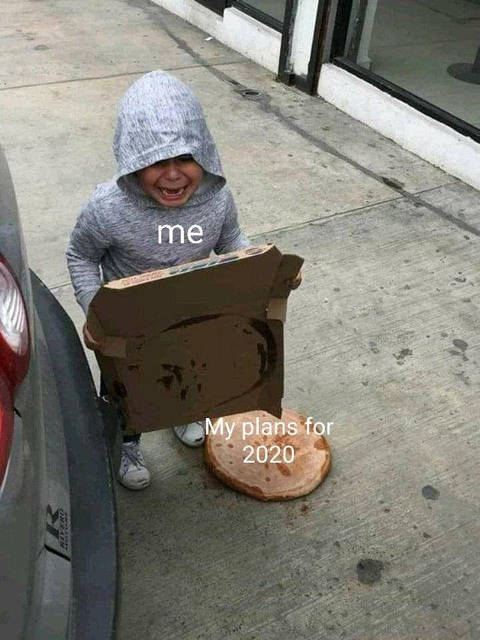
(Via WhatsApp)
What have you changed your mind on during the pandemic? Reflect. Share your answer with us. Or post on Twitter, and tag us @foundingf. Or join our Slack channel and post it there. If you aren’t there already, here is the invite code.
And if you missed previous editions of this newsletter, they’re all archived here.
Bookmark Founding Fuel’s special section on Thriving in Volatile Times. All our stories on how individuals and businesses are responding to the pandemic until now are posted there.
Warm regards,
Team Founding Fuel
May 13: Get ready for big tech + elite university combo, stay connected, take care of yourself
Good morning,
In 1964, a cyclone hit the coast of southern India, damaging the Pamban bridge that connected Rameswaram to the mainland. The task of reconstructing the bridge was handed over to a 31-year-old engineer. He was given three months to finish the task. It seemed impossible, because the girders—all 126 of them—had fallen into the sea, and no one knew how long it would take to manufacture and deliver fresh girders. Maybe months.
Instead of waiting for new girders, the young engineer enlisted the help of local fishermen to spot the fallen girders in the bed of the sea and used cranes to lift them up. He finished the task in 43 days. (He received a cash award of Rs 1,000 from the railway minister for his achievement).
The name of the engineer, of course, is E Sreedharan, who went on to build Konkan Railways and Delhi Metro, in record time, setting new standards for execution.
In the post-pandemic world, speed is the new mantra, as individuals, businesses and governments find themselves forced to adjust to the new world. The big lesson from Sreedharan is that speed also comes from the ability to spot and surface what’s already available with us, instead of waiting for something new.
How are you marrying speed with scale? Please share your answers with us.
Here are three things we found interesting.
Get ready for big tech + elite university combo
Prof Scott Galloway, one of the sharpest observers of tech business, predicts that higher education in the post-Covid world won’t be the same again. Driven by their own needs and constraints, big technology firms like Google, Apple and Facebook will join hands with elite universities such as Harvard, MIT and Stanford. And that will have ripple effects on institutions lower down in the food chain. In an interview with New York magazine, Galloway says:
“In ten years, it’s feasible to think that MIT doesn’t welcome 1,000 freshmen to campus; it welcomes 10,000. What that means is the top-20 universities globally are going to become even stronger. What it also means is that universities Nos. 20 to 50 are fine. But Nos. 50 to 1,000 go out of business or become a shadow of themselves. I don’t want to say that education is going to be reinvented, but it’s going to be dramatically different.
“Ultimately, universities are going to partner with companies to help them expand. I think that partnership will look something like MIT and Google partnering. Microsoft and Berkeley. Big-tech companies are about to enter education and health care in a big way, not because they want to but because they have to.”
Stay connected
Life Hacker has some practical tips on how to avoid burnout during these days. One of them is about staying connected. Rachel Fairbank, writes:
“We may have to practice physical distancing, but that doesn’t mean we can’t be creative about staying connected with others. When it comes to preventing burnout, strong social connections are key.
“As Sheryl Ziegler, [a psychologist] suggests, in addition to friends and families, lean on online communities that might share some of your concerns. Whatever your situation is, whatever your struggles are, there are people out there who can relate. Make sure to prioritise these connections, as they will help buffer you from burnout.”
Take care of yourself
As lockdown continues, there is a growing concern about mental health. For many, the simple act of dressing well injects a sense of control.

(Via WhatsApp)
What’s your favourite hack to beat the lockdown blues? Share your answer with us. Or post on Twitter, and tag us @foundingf. Or join our Slack channel and post it there. If you aren’t there already, here is the invite code.
And if you missed previous editions of this newsletter, they’re all archived here.
Bookmark Founding Fuel’s special section on Thriving in Volatile Times. All our stories on how individuals and businesses are responding to the pandemic until now are posted there.
Warm regards,
Team Founding Fuel
May 12: Look both ways, respect the next-gen, be on time
Good morning,
In The Hard Thing About Hard Things: Building a Business When There Are No Easy Answers, Ben Horowitz writes, “When hiring a management team, most startups focus almost exclusively on IQ, but a bunch of high-IQ people with the wrong kind of ambition won’t work... At a macro level, a company will be most successful if the senior managers optimise for the company’s success (think of this as a global optimisation) as opposed to their own personal success (local optimisation).”
A management team with the right kind of ambition is important.
He goes on, “nothing motivates a great employee more than a mission that’s so important that it supersedes everyone’s personal ambition. As a result, managers with the right kind of ambition tend to be radically more valuable than those with the wrong kind.”
Here’s a question. What does “global optimisation” mean in these dire times? Is it merely optimising for your company? Or is it optimising for the society, for your business is very much a part of the society?
Share your answers with us.
Here are three things we found interesting.
Look both ways
Suspension of labour laws by a few states has kicked up a lot of debates. Some argue that it will encourage businesses. In his latest essay, K Ramkumar points out that the laws confer rights not only for employees, but also for employers; and they place obligations not only on employers, but also on employees and trade unions.
“In 1993, when we negotiated a wage settlement under the Industrial Disputes Act, at Lipton India’s Kidderpore factory in Kolkata, with three trade unions (CITU, INTUC and NLCC), the unions agreed to as high as 40% productivity improvements in order to make the factory competitive with other modern factories. They also agreed to reduce the workforce by 25% through a voluntary retirement scheme. Hence, to say that trade unions and employees do not cooperate and agree to onerous obligations in order to save a business and employment, is not universally true.
“As someone who spent 32 years managing trade unions, let me tell you that they by and large played by this norm, barring a few exceptions. Now, it will be free-for-all, every day.
“So, in the final analysis, far from enabling entrepreneurs, this ill-thought-through misadventure will disturb industrial peace, unleash conflict of unimaginable proportions, and will demand the state to now become an open militia of the employers to protect them.”
Respect the next-gen
Watching Nandan Nilekani’s interviews on television or on YouTube videos one might not go away with the impression that he is humble. But, those who have worked with him closely often count humility as one of his key qualities. Among them is Siddharth Shetty, who has worked with Nilekani on the Account Aggregator model. When asked why he thinks so, he replied, “You might be the youngest person in the room, but when you say something, Nandan listens.” Nilekani is 64. Shetty is in his early 20s.
In a short video on Facebook, ace commentator Harsha Bhogle shares how he manages the generation gap: “My approach is to respect every generation that comes in... I enjoy seeing this new generation coming up in my profession... I see a lot of talent in young India, you've got to respect that talent. If you keep telling them, you know what things were in our time they switch off immediately. So ask them what they think. Respect them, encourage them. And then I think the generation gap becomes really easy”
Be on time
We found this on Twitter:
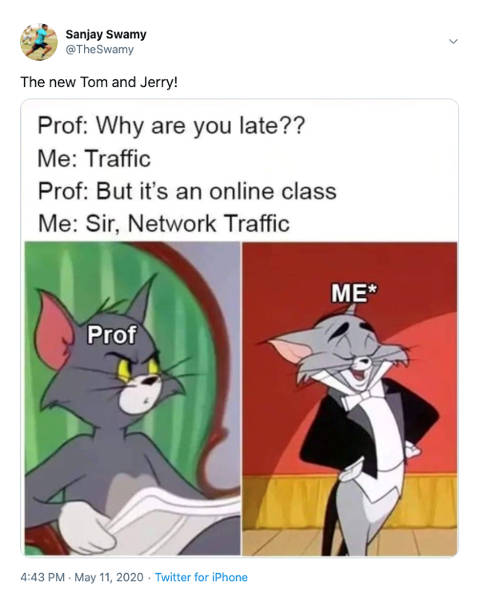
What’s the most interesting excuse you’ve heard from those who come late to video conferences? Share your answer with us. Or post on Twitter, and tag us @foundingf. Or join our Slack channel and post it there. If you aren’t there already, here is the invite code.
Bookmark Founding Fuel’s special section on Thriving in Volatile Times. All our stories on how individuals and businesses are responding to the pandemic until now are posted there.
Warm regards,
Team Founding Fuel
May 11: Listen deeper, be fast, think inside the box
Good morning,
In his 2015 book, Leveraging Human Capital: A Practitioner’s Perspective, K Ramkumar writes about what will drive the conflict between capital and labour in the next few decades.
“The obsession with labour productivity to the exclusion of everything else, coupled with the levels of inequity that have seeped into compensation between the top management and the coalface-level employees, in both services and manufacturing industries, is setting up the new fault lines for the next 30 years. In developed economies where capital productivity is largely driven by automation, there is ominous shrinking of productive hours of labour (35 to 40 hours a week). Higher per capita personal savings, if not wealth and a social security net arising out of state welfare orientation, is making employees demand more work-life balance, a euphemism for leisure.
“The new conflicts are going to be driven by the old provocations: wage equity, employment security, growth, wealth creation, leisure, dignity and quality of life.”
As India rushes to restart the economy, some state governments have been relaxing or suspending labour laws. These conflicts are real today. In a forthcoming essay on Founding Fuel, Ramkumar will explore their implications. The essay has this dire warning: “Hold your celebrations for a storm is brewing on the horizon.”
We wish you a good week ahead.
Here are three things we found interesting.
Listen deeper
There’s a story about a man, who used to hear cries of children from the house of his new neighbour every day in the morning starting exactly at 7 am. It was not loud, but he could hear it if he stood at a particular window in his house. The cries went on for half an hour and then it would stop. One weekend, he bumped into his neighbour and asked him about the strange cries he heard every morning. The neighbour was apologetic, and then he went on to explain that he is a paediatrician. He records the cries of the children and listens to it every morning to look for patterns—did a child with a stomach ache cry differently from a child with ear pain? “Children can’t express their symptoms like you and I can, and I have to understand them through their cries,” he explained.
In a New York Times column, a doctor, Marjorie S. Rosenthal, explains how telehealth is changing her practice. One of the insights is about learning, sharpening some of the skills. Rosenthal writes:
“Some of the changes we make and the new skills we develop during this pandemic will be worth sustaining long after it is over. I am learning to listen for when it is my turn to speak, to diagnose rashes on a phone screen, to identify emotions from words and tone as much as from facial expressions. I am working on building trust over the phone.”
[Note: We are working on a package on telemedicine. We will share the details soon. Watch this space.]
Be fast
Talking to Microsoft CEO Satya Nadella, Accenture CEO Julie Sweet says your ability to execute fast will be a fundamental change in how companies operate in the new world. Sweet says:
“One of the things that has been key is also speed. So you take healthcare which is not known to be fast, and you think about how we put a million users of an entire country's health system on Team in a week; when you think about the work that we did together with Rolls Royce, and a consortium in the UK to change their ability to produce ventilators. And we did that in days, not months.
“I think we have not yet seen the profound implications of what it means to be competitive in the new world, based on the ability to achieve these things at speed and I think that's going to be a fundamental change in how companies operate.”
Think inside the box
We found this interesting example of a restaurant enforcing physical distancing:
Found any interesting examples of how companies find their way around coronavirus? Share your answer with us. Or post on Twitter, and tag us @foundingf. Or join our Slack channel and post it there. If you aren’t there already, here is the invite code.
Bookmark Founding Fuel’s special section on Thriving in Volatile Times. All our stories on how individuals and businesses are responding to the pandemic until now are posted there.
Warm regards,
Team Founding Fuel
May 10: Be agile, draw lines fast, track your free time
Good morning,
In his classic text, Management: Tasks, Responsibilities, Practices, Peter Drucker offers this warning.
“A man should never be appointed to a managerial position if his vision focuses on people’s weaknesses rather than on their strengths. The man who always knows exactly what people cannot do, but never sees anything they can do, will undermine the spirit of his organisation.”
As the coronavirus infection continues to spread, every day brings bad news—caused by virus, caused by lockdown, or by one of the many other disasters including floods, giant hornets, locusts and industrial accidents. All these make it hard to see the positive in the world when even the word ‘positive’ has a bad connotation.
It’s a reason why we should take time to focus on the strengths—within us and around us.
Have a great Sunday.
Here are three things we found interesting.
Be agile
In a piece on how to run a business during a pandemic with no vaccine in sight, McKinsey narrates a story of a Chinese car rental company. It lost 95% of its business during the lockdown, but managed to recover 90% of the lost business within seven weeks. What did it do right? McKinsey writes:
“They invested in micro-customer segmentation and social listening to guide personalisation. This led them to develop new use cases. They discovered, for example, that many tech firms were telling employees not to use public transportation. The car-rental company used this insight to experiment with and refine targeted campaigns. They also called first-time customers who had cancelled orders to reassure them of the various safety steps the company had taken, such as “no touch” car pickup. To manage the programme, they pulled together three agile teams with cross-functional skills and designed a recovery dashboard to track progress.”
Draw lines fast
Former McKinsey boss Dominic Barton often speaks about compartmentalisation as a key skill for leading in this century. We might be facing eight different existential problems, but when we are working on something—even if it’s not one of those eight problems—we should be able to shut down everything else, and focus on the task at hand. That skill is all the more important during remote working.
BBC has an insightful piece on what sets the successful remote workers apart. One of those is the ability to draw a hard line between work and leisure. In normal times, the long commute from home to office does the trick. But now, the transitions have to be faster.
“The most productive remote workers also know they don’t have to be tethered to their desks in order to set boundaries and delineate work from leisure. They’re better at what are called ‘micro-transitions’ between tasks and environments, says Jean-Nicolas Reyt, assistant professor of organisational behaviour at McGill University in Montreal.”
Track your free time
We hope it’s not this bad for you:
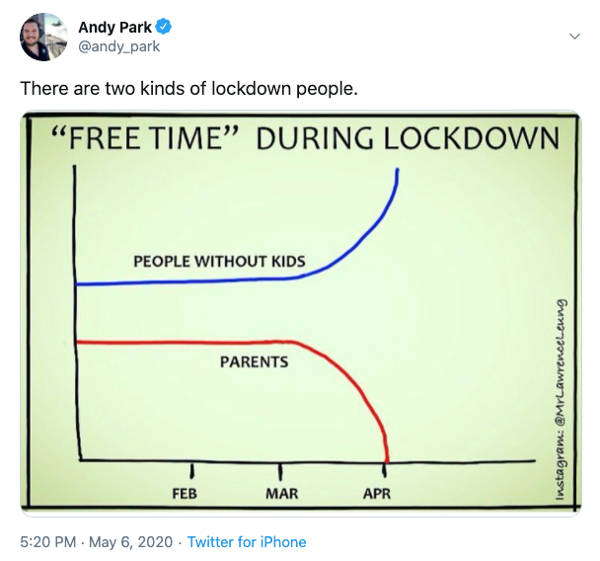
How many hours do you get for yourself every day? One, two, more? Share your answer with us. Or post on Twitter, and tag us @foundingf. Or join our Slack channel and post it there. If you aren’t there already, here is the invite code.
Bookmark Founding Fuel’s special section on Thriving in Volatile Times. All our stories on how individuals and businesses are responding to the pandemic until now are posted there.
Warm regards,
Team Founding Fuel
May 9: Recognise the value of “many small changes”, rework your supply chain, innovate
Good morning,
In his magisterial biography of Steve Jobs, Walter Isaacson quotes Jobs on what drives him. Jobs says:
“I didn't invent the language or mathematics I use. I make little of my own food, none of my own clothes. Everything I do depends on other members of our species and the shoulders that we stand on. And a lot of us want to contribute something back to our species and to add something to the flow.
“It's about trying to express something in the only way that most of us know how—because we can't write Bob Dylan songs or Tom Stoppard plays. We try to use the talents we do have to express our deep feelings, to show our appreciation of all the contributions that came before us, and to add something to that flow. That's what has driven me.”
As we enter yet another weekend during the pandemic, let’s reflect on what drives us. And have those drivers changed in the last few weeks?
Here are three things we found interesting today.
Recognise the value of “many small changes”
At one point in the history of business, there was a big competition between two management ideas: reengineering and TQM, or total quality management. Reengineering aimed for radical, breakthrough improvement in a business process. TQM aimed at small, sustained improvements. A version of that is playing out as the world fights coronavirus. Game changers vs small improvements. In HBR, Gary P. Pisano makes a case for “a large set of small improvements.”
“Big improvements in health care outcomes typically come from many incremental improvements. A vaccine doesn’t have to be 100% effective to make a big dent in a disease. (Remember, the flu vaccine typically reduces risks by 40% to 60%, not 100%.) The same is true for drugs. It is hard to think of any drug that is 100% effective for all patients. Many drugs lead to only small marginal improvements in patient outcomes. But if a disease is prevalent enough, such small improvements translate into many lives saved.
“And let’s remember, many improvements in medical outcomes have nothing to do with technology or drugs; they come from better patient management practices. Figuring out when the best time to intubate a patient or whether to put them on their stomach rather on their back is unlikely to make headlines, but it can lead to better outcomes.”
Rework your supply chain
Zomato has some useful pieces of advice for restaurants, including the need to keep the menu dynamic, reimagining recipes and reducing wastage. In the long run, they should also consider more fundamental shifts. Zomato writes:
“Large restaurants will have to invest significant efforts to re-work their supply chains beyond traditional mandis to more organised and predictable suppliers. This would mean leveraging technology to connect with farmers, millers or brands directly, and removing intermediaries. In the long run, this will not only bring down costs but also make sure that the bar on hygiene and quality keeps getting pushed.”
Dig deeper
Food supply chain disruptions that may affect the restaurant industry - Zomato
The Satara uprising - Founding Fuel
Innovate
Here’s a physical distancing jugaad we found on Twitter.
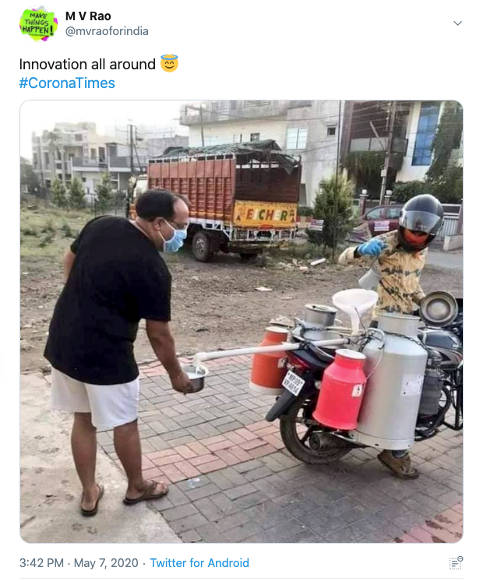
Did you notice any local innovation around you? Share them with us. Or post on Twitter, and tag us @foundingf. Or join our Slack channel and post it there. If you aren’t there already, here is the invite code.
Bookmark Founding Fuel’s special section on Thriving in Volatile Times. All our stories on how individuals and businesses are responding to the pandemic until now are posted there.
Warm regards,
Team Founding Fuel
May 8: Stand by your values, think about your ecological footprint, imagine
Good morning,
In Shoe Dog: A Memoir by the Creator of Nike, Phil Knight writes about how he found success in selling shoes.
“My sales strategy was simple, and I thought rather brilliant. After being rejected by a couple of sporting goods stores (‘Kid, what this world does not need is another track shoe!’), I drove all over the Pacific Northwest, to various track meets. Between races I’d chat up the coaches, the runners, the fans, and show them my wares. The response was always the same. I couldn’t write orders fast enough.
“Driving back to Portland I’d puzzle over my sudden success at selling. I’d been unable to sell encyclopedias, and I’d despised it to boot. I’d been slightly better at selling mutual funds, but I’d felt dead inside. So why was selling shoes so different? Because, I realised, it wasn’t selling. I believed in running. I believed that if people got out and ran a few miles every day, the world would be a better place, and I believed these shoes were better to run in. People, sensing my belief, wanted some of that belief for themselves.
“Belief, I decided. Belief is irresistible.”
What do you believe in? That’s your sweet spot.
Here are three things we found interesting today.
Stand by your values
Recently, Indian Twitter was abuzz comparing the lay-off announcements by two different companies—Mukesh Bansal’s Curefit, and Brian Chesky’s Airbnb. Many felt Chesky displayed empathy and generosity. McKinsey’s Raju Narisetti held him up as an example of “how leaders should write all-staff notes that are difficult to write.”
A Stanford Insights piece quotes leadership and communications specialist David Demarest saying it goes back to core values.
“In the aftermath of the crisis, a company that stood by its values and weathered the storm will be in a better position to attract talent as well as investors and business partners. There are ripple effects when companies don’t just say what they’re going to do, but actually do what they say.”
Think about your ecological footprint
The lockdown has surfaced some good news about the environment. Indian IT services companies TCS and HCL Tech have announced that a good chunk of their employees will primarily work from home in the coming years, potentially cutting down commute and air pollution it creates.
In Quartz, Matt Butner and Jayni Hein of NYU's Institute for Policy Integrity write, “the vanishing of the daily commute has brought to light the burden of cars and trucks on health and the environment. As an intentional effort to reduce greenhouse gas emissions, at low cost to society, policymakers and businesses should continue to encourage working from home for jobs that allow it, even after the coronavirus crisis has receded.”
However, it’s not all good news. WSJ reports that some large businesses are pressing a pause button on sustainability. “Today, every occupant of every C-suite is trying to figure out what they’re willing to throw overboard as the economic storm spawned by the pandemic is swamping their ships. Businesses that were planning to help save the world are now simply saving themselves.”
Dig deeper
Remote work is a huge opportunity for high-impact climate policy - Quartz
Sustainability was Corporate America’s buzzword. This crisis changes that. - WSJ
Imagine
We found this on Twitter:
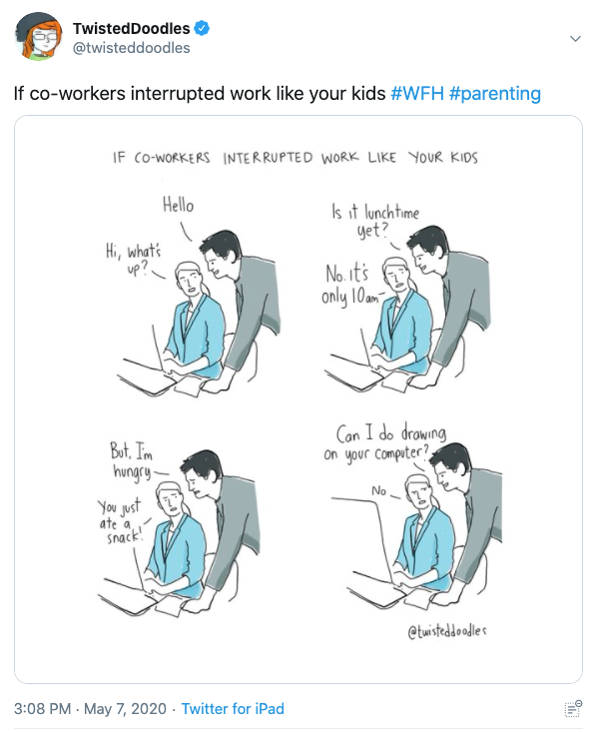
How are you managing your kids’ study at home? Share your hacks with us. Or post on Twitter, and tag us @foundingf. Or join our Slack channel and post it there. If you aren’t there already, here is the invite code.
Bookmark Founding Fuel’s special section on Thriving in Volatile Times. All our stories on how individuals and businesses are responding to the pandemic until now are posted there.
Warm regards,
Team Founding Fuel
May 7: Communicate the ‘why’, think deeper about online education, innovate
Good morning,
All of us at Founding Fuel are delighted to announce that our colleague NS Ramnath (Ram to us) has been granted the Bharat Inclusion Research Fellowship for 2020. When news came in, all of us convened virtually to applaud him from our homes with coffee and tea mugs in hand. Ram is both erudite and warm at once.
This is one among the eight Fellowships granted by the Bharat Inclusion Initiative, a part of IIM Ahmedabad's Centre for Innovation Incubation and Entrepreneurship, and is intended to generate a deep knowledge of the needs, habits, preferences and constraints of the financially underserved segment in India.
Ram will study six industrial clusters in Tamil Nadu: Chennai, Vellore, Madurai, Coimbatore, Tiruppur and Tirunelveli. He will listen to entrepreneurs in these clusters and tell their stories over the next few months. Here are more details about the fellowship.
As his narratives take shape, we will publish them on Founding Fuel as well.
Here are three things we found interesting today.
Communicate the ‘why’
Many of us are familiar with Simon Sinek’s brilliant talk, Start with Why. Great leaders such as Steve Jobs, Martin Luther King Jr and the Wright brothers inspired action not by telling us how, but by communicating the why. In a recent HBR piece, Nancy Duarte, gives some practical advice on how to go about this during these stressful times. She writes, it’s also about empathy.
“Answering why is an act of empathy and adds a layer of persuasion to your communications. When people know why they’re being asked to do something, they’re much more likely to do it.
“In times like these, your customers and your employees need your wisdom and leadership more than ever, and you have a unique opportunity to move them forward in the midst of uncertainty.”
Think deeper about online education
As we balance work from home and children’s education from home, here’s a reality we all have to confront. Spending too much time in front of the screen is not a good idea, but we might not have any options. Hindustan Times quotes Dr Kanika Ahuja, who teaches psychology at Delhi’s Lady Shri Ram College:
“Increased screen time can cause increased sedentary behaviour in children and teens, decreased metabolism, disturbance in sleep cycle, more distractibility and perhaps lower well-being… The key question is how much is too much? We have no clear answers. There is an urgent need for research in India considering that a large part of education will be shifted online for at least 1-2 years.”
There are no clear answers now, a reason why this needs to be taken all the more seriously.
Innovate
We found this on Twitter:
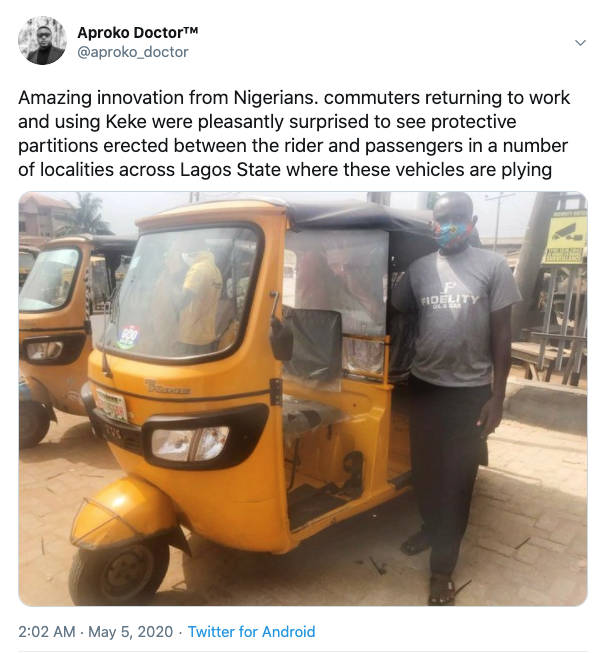
How are you preparing for the post-lockdown commute? Share your answer with us. Or post on Twitter, and tag us @foundingf. Or join our Slack channel and post it there. If you aren’t there already, here is the invite code.
Bookmark Founding Fuel’s special section on Thriving in Volatile Times. All our stories on how individuals and businesses are responding to the pandemic until now are posted there.
Warm regards,
Team Founding Fuel
May 6: Decentralise, sustain what worked during the lockdown, stock your bookshelves
Good morning,
In Mindset: Changing The Way You think To Fulfil Your Potential, Carol Dweck says people with a ‘growth mindset’ view hard work very differently from those who have a fixed mindset. She writes:
“Malcolm Gladwell, the author and New Yorker writer, has suggested that as a society we value natural, effortless accomplishment over achievement through effort. We endow our heroes with superhuman abilities that led them inevitably toward their greatness. It’s as if Midori popped out of the womb fiddling, Michael Jordan dribbling, and Picasso doodling. This captures the fixed mindset perfectly. And it’s everywhere.
“People with the growth mindset, however, believe something very different. For them, even geniuses have to work hard for their achievements. And what’s so heroic, they would say, about having a gift? They may appreciate endowment, but they admire effort, for no matter what your ability is, effort is what ignites that ability and turns it into accomplishment.”
Dweck’s book inspired Microsoft chief Satya Nadella so much that he made ‘growth mindset’ the core of Microsoft’s transformation he led soon after he became the CEO. During these days, when most of us crave to go back to the ‘good old days’, a growth mindset might show us new paths to a better world.
Here are three things we found interesting today.
Decentralise
The coronavirus pandemic has clearly shown why it’s important to decentralise. For example, Chennai’s Koyambedu vegetable market used to be hailed as one of the largest perishable goods markets in Asia. It has now become the epicentre of infection, spreading the virus to other districts in Tamil Nadu. It did not learn from other towns, which, sensing the danger, had spread their central markets into four or five open grounds around the city. As the number of coronavirus cases increased, the state had to shut the entire market down. But, no lessons were learnt. It simply shifted its location to Thirumazhisai, about 17 kilometres away from Koyambedu.
In Down to Earth, Shivali Jainer and Dhruv Pasricha argue that decentralisation works better across segments—water supply, wastewater and health infrastructure. “In Panaji, the municipality collects biodegradable waste every day and non-biodegradable waste twice a week, which promotes community compost,” they write.
Dig deeper
Amid Koyambedu mess, Madurai and Tiruchy slow to decentralise markets
Here's what decentralised planning teaches us to curb pandemics
Sustain what worked during the lockdown
McKinsey has eight things CEOs can take to ensure a safe and successful relaunch of economic activity. Here’s one of the suggestions.
“In many situations, the crisis has been an opportunity to strengthen relationships with large customers and solidify the supplier ecosystem. Having navigated through this collective ordeal, many companies can strengthen partnership relations with all the stakeholders in their environment. In some business segments, dramatic productivity gains and agility have been achieved. For leaders, it is now important to determine which of the developments imposed by circumstance may have generated value, financially, operationally, and for their people. Some of these could then be incorporated into future thinking about the reorganisation of work and reinventing the business model.”
Stock your bookshelves
For they seem to have become an essential prop for Zoom conferences and webinars.

(Via: Grant Snider)
What is the most interesting book in your bookshelf? Share your answer with us. Or post on Twitter, and tag us @foundingf. Or join our Slack channel and post it there. If you aren’t there already, here is the invite code.
Bookmark Founding Fuel’s special section on Thriving in Volatile Times. All our stories on how individuals and businesses are responding to the pandemic until now are posted there.
Warm regards,
Team Founding Fuel
May 5: Empower caring leaders; be humble, because you may have to change; focus on what’s important
Good morning,
The Fifth Discipline Fieldbook connects ethics and learning this way: “To meet your ethical responsibilities, you must conduct your activities as learning—exploring, discovering, experimenting—activities. Learning depends absolutely on being able to acknowledge specific uncertainties—unsettled questions for which we will never know the answers…
“In themselves, acknowledging specific uncertainties and embracing error will engender honesty and integrity. And they are the operational preconditions for resilience—the capacity to adjust and change.”
The ongoing pandemic is one of the worst crises that we, as human beings, faced at least in the last several decades. It has also accelerated some of our learnings and has given us a deeper respect for the process of learning itself.
How are you institutionalising it?
Here are three things we found interesting today.
Empower caring leaders
As they work from home, many complain about the blurring lines between the professional and personal, as if they don’t want that line to get erased. In an insightful essay in The Correspondent, Tanmoy Goswami says that this very phenomenon, under a caring leader, can make professional lives better. But it’s not going to be easy. Goswami writes:
“With the boundaries between office and home dissolving, the pressure to maintain two distinct personalities that so many experienced in the pre-pandemic world is also receding. In the new world, employers will need to be ready for employees demanding to be seen as messy, complex individuals who live messy, complex lives—not as machines who can leave their unproductive or inconvenient parts at home, or stop themselves from bringing up ‘awkward’ topics at work because doing so is not ‘professional’.
“To steer workplaces through this change, employers will have to create and empower a cadre of caring leaders.”
Be humble, because you may have to change
As countries across the world imposed lockdown to contain the spread of coronavirus, Sweden took a different approach, letting things be (except for special care to the elderly). The decision was controversial. Anders Tegnell, Sweden’s chief epidemiologist who devised the country’s strategy, took most of the heat. And he has held on to the approach with an ideologue’s determination despite criticism from technocrats and politicians outside Sweden. However, in his interviews, he comes across as anything but ideological. The Independent quotes one such interview.
“In an interview with the newspaper Aftonbladet,..Tegnell said health officials were constantly reviewing evidence on the effectiveness of the strategy.
“ ‘I'm not convinced at all. We are constantly thinking about this… What can we do better and what else can we add on?’ Mr Tegnell said.
“ ‘I think the most important thing all the time is to try to do it as well as you can, with the knowledge we have and the tools you have in place. And to be humble all the time because you may have to change.’ ”
Focus on what’s important
Facebook arguments mostly aren’t.
What’s your biggest time hog? Share your answer with us. Or post on Twitter, and tag us @foundingf. Or join our Slack channel and post it there. If you aren’t there already, here is the invite code.
Bookmark Founding Fuel’s special section on Thriving in Volatile Times. All our stories on how individuals and businesses are responding to the pandemic until now are posted there.
Warm regards,
Team Founding Fuel
May 4: Reframe, read, and reflect
Good morning,
In Platform Scale: How an Emerging Business Model Helps Startups Build Large Empires With Minimum Investment, Sangeet Paul Choudary draws our attention to the world of ants and bees to make an important point about platforms. He writes: “Every food-seeking ant and honey-seeking bee knows what to do at a micro-level when it finds what it is looking for. The ant’s trail and the bee’s dance sparks a coordination of actions across the entire group. Larger outcomes emerge as a consequence of these seemingly insignificant actions.”
“Platforms can be designed based on a set of rules, but they emerge of their own accord,” he writes. “Platforms need structured business architecture, but they must allow for emergent behaviour, some of which may redefine the architecture and lead the platform in an entirely new direction.”
As businesses and governments rush to try out new technologies for the post-COVID world, they must give adequate attention to the idea of emergence, and the possibility that it could take something in an entirely new direction.
Often these new behaviours cannot be anticipated. What will you do, as a leader, to prepare your team and your organisation for ‘emergence’?
Have a great week ahead.
Reframe
In a recent online lecture entitled Insights from Positive Psychology: How People, Companies, and Nations Can Grow from the COVID-19 Crisis, NYU Stern professor Jonathan Haidt, started with two questions.
- Would you say that this pandemic is among the worst things to have happened to humanity in the last 50 years?
- If you could wave a magic wand and stop that first viral transmission where it jumped from a bat to some other person or animal, would you stop that?
Haidt’s answer to the first question is a clear yes, and to the second, a ‘yes’ with trepidation. Reason. Antifragility.
Thanks to the COVID-19 crisis, our risk of extinction, our risk of a mega catastrophe, is a lot lower today than it was back in January. In The Economist, Bill Gates said that the coronavirus is going to cause all kinds of breakthroughs and that's just on the medical side. Think about the institutional side, the political side, the economic side, research in all kinds of ways. We will be much more ready now, the chance of being wiped out by a virus is now much lower. We might even say that the coronavirus is a giant inoculation for all of humanity against future viral diseases and other threats that require global cooperation.
“So I ask you again,” Prof Haidt said, “is this among the worst things to have happened to us?
Well, yes, but would you wave that wand? Would you erase it so it didn't happen? Too soon to tell.”
Sometimes reframing an issue will lead us to very different conclusions about the world.
Read
The Washington Post has a feature on the role Bill Gates has played both in warning about such a pandemic in 2015 and in helping us return to normalcy. One of his weapons is his deep knowledge.
Here’s the golden quote from Gates: “When I spend billions of dollars on something, I have a tendency to read a lot about it”.
It seems to have only intensified these days. “Gates has consumed medical journal articles about testing, treatments and vaccines for the virus. He’s talked at length with immunologists, epidemiologists and social scientists about slowing the coronavirus’s spread,” the article says.
It quotes Brad Smith, president, Microsoft, who has worked with Gates for over 26 years: “I will always remember listening and thinking, ‘Oh, my gosh, he can go just as deep in talking about mosquitoes, as he did in talking about software code.’ ”
Reflect
Parveen Kaswan, an Indian Forest Service officer, offered this perspective about human beings’ place on Earth.
Has this pandemic made you reflect deeply about this interconnected universe? Share your thoughts with us. Or post on Twitter, and tag us @foundingf. Or join our Slack channel and post it there. If you aren’t there already, here is the invite code.
Bookmark Founding Fuel’s special section on Thriving in Volatile Times. All our stories on how individuals and businesses are responding to the pandemic until now are posted there.
Warm regards,
Team Founding Fuel
May 3: Look for changes in supply and demand side behaviour, hire now, exercise caution
Good morning,
In his fascinating biography Eyes on the Street: The Life of Jane Jacobs, Robert Kanigel tells us how her approach to economics differed from the conventional approach.
“Conventional macroeconomics. she felt, hewed to faulty premises. You want to understand the causes of prosperity, the dynamics of decline? Well, said economists from Adam Smith on, you look to national economies as the ‘salient entities’—England, not London; Russia, not St. Petersburg. Smith had titled his pathbreaking book of 1776 The Wealth of Nations, and nations, big and small, had remained the focus of economists since. But the nation, said Jane, was too large a unit of study, obscuring insight rightly gained only at smaller scale. Nations comprised cities, rural districts, poor regions and rich; at this larger scale, telling details of economic life were lost in numbers and facts bundled up for measuring whole countries, like ‘gross national product.’”
It’s easier to see the wisdom of Jacobs today, as we consider the possibility of a big shift from global to local. With green, orange and red zones, the focus is on how to revive the economy within a district, within a city, within a village. From a macro view, even an entire village might look like a cog in a wheel. However, when we start from a city or a village, we start respecting the value of individuals.
Have a fantastic Sunday.
Look for changes in supply and demand side behaviour
Recently, Founding Fuel had organised a Masterclass with Sangeet Paul Choudary. A panel of distinguished guests also joined our team to quiz Sangeet. Here’s one of the key takeaways from the masterclass.
How is behaviour changing on the demand side and the supply side? What’s getting concentrated or commoditised?
- Eg. Netflix. Because theatres have shut down, there’s more demand for streaming. That gives studios an extended opportunity to test new business models. On the supply side, for network TV, live events (such as sports) have stopped. So network TV will license content from streaming players.
- Eg. Disney. How can it replace or augment the experience of going to an amusement park? What core assets does Disney have that it can use to create and deliver value to customers through digital platforms? Unleash interactivity with Disney characters? Disneyland experience through games?
- Eg. Restaurants. On the demand side, customers don’t go to restaurants. On the supply side, restaurants in prime real estate might shut down if the lockdown continues. Will aggregators invest in dark kitchens, hiring chefs from the restaurants and creating the right products using data?
Hire now
In Harvard Business Review, Claudio Fernández-Aráoz calls this a “once-in-a-century hiring opportunity”. Here’s a piece of practical advice:
“Ask your top leaders to list three to five great players they would have liked to have hired over the past five years and then check in with those people.
“These will probably be individuals they frequently deal with (as suppliers, advisors, clients), or even assessed as past potential candidates. In your next executive team meeting, discuss everyone’s selections, rank them in terms of attractiveness for and to your company, and agree on who to contact. It’s possible that many will now be open to considering an offer because their circumstances have changed.”
Exercise caution
There’s much to learn from the world of fruits.
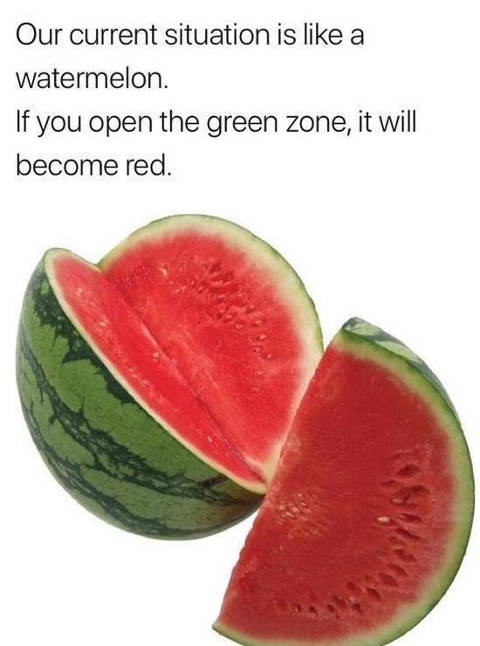
(Via WhatsApp)
What are your favourite metaphors? Tell us about them. Or post on Twitter, and tag us @foundingf. Or join our Slack channel and post it there. If you aren’t there already, here is the invite code.
Bookmark Founding Fuel’s special section on Thriving in Volatile Times. All our stories on how individuals and businesses are responding to the pandemic until now are posted there.
Warm regards,
Team Founding Fuel
May 2: Be inspired, find meaning, apply
Good morning,
The second commandment in Don Keough’s The Ten Commandments for Business Failure is Be Inflexible. In that chapter, among other things, he tells the story of Digital Equipment Corporation.
“Founded in 1958 by a couple of brilliant engineers out of MIT, Ken Olsen and Harlan Anderson, at its peak in the 1980s, DEC was the second-largest computer company in the world with about one hundred thousand employees and a highly vaunted reputation for technological genius. They were one of the first businesses connected to the Internet and they created AltaVista, one of the first comprehensive search engines. They had internal e-mail long before its market value was recognised. Work on an MP3-type personal music player began in their research centre. In short, they were ahead of their time in many areas. What brought them down was the conviction that they had the one right approach. Everything they did was ‘DEC-centric,’ very proprietary. For all their brilliance, the DEC founders simply refused to adapt to the new, broader-based structure of the computer business. Piece by piece the company was sold off, the last of it in 1998, though I understand the logo survived for a short while in an IT company in India.”
It’s easy to imagine why DEC founders refused to adapt. Building a business is tough. And you cannot build one without standing like a rock, defending certain things. But at some point the very same quality might turn out to be a leader’s undoing. The key, then, is to understand when to stand like a rock, and when to flow like a river.
Here are three things we found interesting.
Be inspired
In a fascinating conversation with Pragya Tiwari at Algebra, The Arts & Ideas Club, Ashish Vidyarthi narrates the story of his life, in theatre, in cinema—over 200 movies in 12 languages—and most recently, as a leadership trainer and executive coach with brutal honesty and useful insights. The statement he makes towards the end captures the arc of his own career.
“What is available to us is not just stuff that we didn't do but the possibility of actually achieving and doing things that really inspire us. For too long we have lived a life of aspiration [I want to have] that car and that bungalow and that position.
“On the other hand, we can ask, ‘Can I be inspired by that restaurateur? What a wonderful restaurant that person is running, and can I be inspired and open my own yoga class?’ Then we were doing something that speaks to us rather than living a life that somebody else is living.”
Note: Ashish will be in conversation with our team for the Founding Fuel community on Zoom shortly. Watch this space.
Find meaning
In a New York Times column, Kristin Wong offers a number of tips on staying optimistic when everything seems wrong. One of the ways is to think about what matters to you the most. She writes:
“In a classic study on trauma, subjects wrote about their traumatic experiences for 15 minutes a day. Those who were able to find meaning from their experiences reported less stress, more positive moods and fewer illnesses than subjects who simply wrote about their everyday experiences.
“ ‘The pandemic can create an opening for us to emerge from it with a heightened sense of purpose,’ Ms. Stephanie Marston, [a psychotherapist] said, adding, ‘as well as increased compassion for the struggles of others.’ Again, this doesn’t mean being naïve or insufferably positive about current events. ‘But when we approach this challenge with confidence or hope, we’re likely to do better and be able to transform difficult experiences into important lessons,’ she said.”
Apply
Here’s something for Bruce Lee fans.
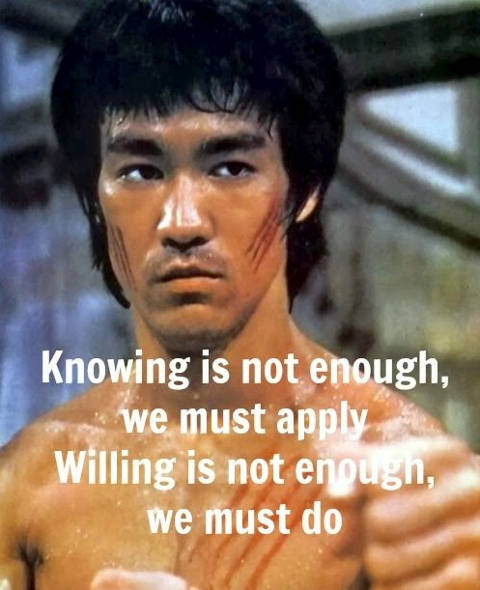
(Via WhatsApp, which isn’t as bad as people say)
Who are your favourite philosophers? Tell us about them. Or post on Twitter, and tag us @foundingf. Or join our Slack channel and post it there. If you aren’t there already, here is the invite code.
Bookmark Founding Fuel’s special section on Thriving in Volatile Times. All our stories on how individuals and businesses are responding to the pandemic until now are posted there.
Warm regards,
Team Founding Fuel
May 1: Build capacity which can respond fast, be aware of salience bias, maximise conversation
Good morning,
In Failing to Succeed, a fascinating account of India’s first e-commerce company, its founder K. Vaitheeswaran shares a number of low-cost customer acquisition ideas he and his team tried at Indiaplaza.com. One of them goes like this:
“I once walked out of the Mumbai airport looking for my cab and spent several minutes closely studying the various pick-up boards held by car drivers. Immediately, we hired interns in Bengaluru, Mumbai, Delhi, Chennai, Hyderabad, Kolkata, Pune and Ahmedabad for a period of six months. These interns, mature men wearing white chauffeur-type uniforms, pretended to be drivers and spent weekdays at airports from morning to evening, holding boards to pick up non-existent passengers with Indiaplaza.com printed in bold. The passenger names would be generic and common like K. Srinivasan, Atul Srivastava, Ahmed Khan, Giridhar Prasad, John D’Souza, Shalini Shekar and so on, and thousands of passengers coming out would stare closely at these boards and (we hoped) they would remember the brand Indiaplaza.com.”
Entrepreneurs tend to be so obsessed with their businesses that they see everything with the lens of making their business succeed. What lens do you use?
Here are three things we found interesting.
Build capacity which can respond fast
Our team had a fascinating conversation on the future of the apparel industry with Devangshu Dutta, Vineet Mehra and Deven Pabaru. Here’s a summary of one of the points made by Dutta towards the end of the session.
“If it takes you months to convert your concept into a product, you really are living with hope. Because you're projecting out into the future, thinking that this product would be sold and you have no way of predicting. So if you can actually respond instead to the market, that gives you a margin of safety and that requires a complete rejigging of thinking.
“It is most expensive to have finished products sitting in the store, which may or may not sell. It is less expensive for it to be sitting in a distribution centre because you've not added the retail cost to it. It is lower if it is sitting in the factory. It is even lower and the risk is lower if it is just fabric, rather than the garment. And the least cost is having capacity, which can respond.”
Be aware of salience bias
Yesterday, India’s chief economic advisor Krishnamurthy Subramanian spoke to a group of doctors about his life, worldview, and the impact of the novel coronavirus on the economy. He sounded a cautionary note on extrapolation. [It was moderated by Dr Rajagopal Raghunathan who runs ISB's course 'A Life of Happiness and Fulfillment' on Coursera.]
“There are many questions about whether we will ever go to watch movies in a theatre or eat outside in restaurants. In behavioural economics, there is this human bias which all of us get subjected to in our decision making. It’s called salience bias, where we overweigh evidence that just pops out on us, and recent evidence ends up popping out a lot more than evidence that actually is from a little farther in history. Whenever we do extrapolations we may just overweigh significantly and say, ‘Oh, you know, this is how it's going to be’. This happens when we are in normal times. We keep extrapolating and say there’s no crisis going ahead, we're going to continue in normal times. And then when we get into a crisis we think we will continue to be in a crisis. We have to recognise is that the truth always is somewhere in between.”
Maximise conversation
Some good tips on virtual meetings:
How do you conduct virtual meetings? Share your tips with us. Or post on Twitter, and tag us @foundingf. Or join our Slack channel and post it there. If you aren’t there already, here is the invite code.
Bookmark Founding Fuel’s special section on Thriving in Volatile Times. All our stories on how individuals and businesses are responding to the pandemic until now are posted there.
Warm regards,
Team Founding Fuel
April 30: Be the lead learner, be proactive, connect the dots
Good morning,
One of the most powerful quotes in Robert Pirsig’s Zen and The Art of Motorcycle Maintenance goes like this. “The true system, the real system, is our present construction of systematic thought itself, rationality itself, and if a factory is torn down but the rationality which produced it is left standing, then that rationality will simply produce another factory. If a revolution destroys a systematic government, but the systematic patterns of thought that produced that government are left intact, then those patterns will repeat themselves in the succeeding government.”
As we debate about how the COVID-19 pandemic will change the world we live in, it might be worth going one step deeper. Will WFH replace offices? The answer is not in whether we found new joys, new benefits in working from home, but it is really in the rationality that produced the offices in the first place. Are some of the reasons for the huge campuses, centralised workspaces still valid? Have some evaporated?
Have a good day!
Here are three things we found interesting.
Be the lead learner
Insead Knowledge has a report on a recent webinar by Prof Declan Fitzsimons on leading in a crisis. Fitzsimons highlighted the key role learning plays in leading during this time.
- “You do need to be the best learner in the room. Vulnerability should be connected to an ethos of learning. How that links to leadership is, I'm the lead learner in the room. I don't know [more] than everyone in the room, I'm surrounded by experts who know what they're doing in their areas. I can't possibly know what they do. If we think that leadership is knowing everything and knowing more than other people do, we're really in trouble.”
- “If you're not vulnerable, it means you're not learning and if you’re not learning, what are you doing in the room? Because in complexity and in crises, being the fastest learner is going to help you recover fastest from the crisis”
Be proactive
One of the points that came up during a fascinating panel discussion on how to reset global supply chain in the textile business organised by The Association of Nift Alumni was India’s low market share compared to Bangladesh and Vietnam despite being good in both the basics and in fashion. Edward Hertzman, founder and president of Sourcing Journal, USA, said the key is to change the mindset. “If you're waiting for a buyer to call you and say ‘here is a hundred thousand pieces of X’, that is wishful thinking. The people that are successful today have to take on the role of design and product development, and go to retailers and say here oh here's five jeans, here are five knits. Because you will have fewer resources and you have to do more.”
[The Founding Fuel team will be in a conversation on the impact of COVID-19 on the apparel industry, with two distinguished members of the sector.
Devangshu Dutta is chief executive of Third Eyesight, a specialist management consulting firm. He has played a stellar role as founding member of the Executive Council of NIFTA, the association of National Institute of Fashion Technology (NIFT) alumni. To provide a deeper understanding, he has been instrumental in organising a high impact series of webinars including the one above.
Vineet Mehra is the third generation owner of Huechem Textiles, which owns the men's innerwear and sportswear brand chromozome. The best selling brand is primarily sold across all major retail outlets in the country like Lifestyle, Spar, Metro, Reliance, Star Bazaar and More, and e-commerce portals like Amazon and Myntra. The company also makes private label menswear, womenswear and kidswear for various clients like Westside, Shoppers Stop, etc. Mehra has a manufacturing unit in Tirupur and a hands-on understanding of the retail, garments and textile industry.
We will share a recording of the conversation with you soon.]
Connect the dots
It sometimes takes a lockdown to see the connection between a computer and a fridge.
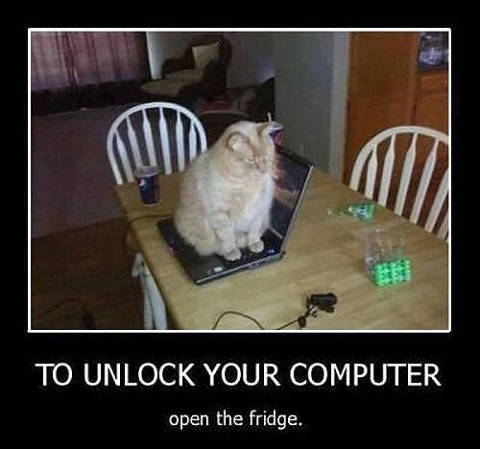
(Via WhatsApp)
What did your pet teach you during the lockdown? Share those with us. Or post on Twitter, and tag us @foundingf. Or join our Slack channel and post it there. If you aren’t there already, here is the invite code.
Bookmark Founding Fuel’s special section on Thriving in Volatile Times. All our stories on how individuals and businesses are responding to the pandemic until now are posted there.
Warm regards,
Team Founding Fuel
April 29: Engage with government, acknowledge that some problems are tough, don’t drink from a firehose
Good morning,
In Upstream: How to Solve Problems Before They happen, Dan Heath narrates the story of Dr Marcus Elliott, a sports physician who was hired by New England Patriots to treat the players who were very prone to hamstring injuries. Elliott believed prevention was better than treatment, and better training could prevent injuries from taking place. He observed and designed specific training for players who were at high risk. It worked. The number of injuries dropped drastically.
Heath quotes Elliott: “You don’t wait for these bad things to happen. Instead, you look for the signal that there’s a risk there, and then you act on it. Because if you wait for the bad things to happen, you can never quite put things back together the way they were before.”
Good managers believe that their job is to solve problems. But, the best managers understand that their job is to prevent problems from happening in the first place. And to do that they focus on the upstream. Like Marcus Elliott did.
Have a great week ahead.
Engage with government
Rahul Matthan, in his superb podcast series, Ex Machina, spoke to Pramod Varma, chief architect of Aadhaar, on a range of topics around technology and society. Here’s a summary of two points he made, particularly relevant for these days.
On a small group of technocrats influencing big changes in the government: It’s a genuine concern. So, we ask the government to publish drafts (strategy documents, technology architecture, etc), get public opinion, get them to comment on it, get government agencies to organise workshops. You can always take a stand that I don’t like this crowd, and I will sit on Twitter and complain about it. But someone needs to step up. You can’t say because somebody will complain about it I won't do anything about it.
On weak state capacity and powerful tech: What’s the alternative? Google? Reliance? I don’t know, but it doesn’t seem to be better to me. If the capacity is weak, and we must make sure we supplement the capacity, and not stand outside, complain that they don't have capacity and not do anything about it. I would rather help to improve in terms of privacy, design and security. Everybody must step in to volunteer, help give feedback. We get very little feedback. Generally, when you put out public consultation papers for privacy you get a lot of feedback, but for a tech architecture, we don't get much. Surprisingly so.
Acknowledge that some problems are tough
Helping children with their remote learning, while trying to get your own work done, for example. The New York Times reports:
“A former teacher, Ms. Pinckney-Lewis lays out the schedule for her son, Gavin, a first-grader with special needs, every morning on coloured pieces of construction paper. Red is English, orange is math, blue are his breaks. She previews his video lessons to make sure they aren’t too long and makes notes about when to end them herself if necessary.
“And yet, despite her background in education, she said, ‘I have complete and total anxiety.’ ”
Don’t drink from a firehose
This is from the Twitter account of Sivakumar Surampudi, group head - agri business, ITC Ltd. If you are wondering if there is a right pace, a right way and a right quantum to learn, we have lined up something for you. Watch this space.
How do you resist the temptation to sign up for yet another webinar? Share your tips with us. Or post on Twitter, and tag us @foundingf. Or join our Slack channel and post it there. If you aren’t there already, here is the invite code.
Bookmark Founding Fuel’s special section on Thriving in Volatile Times. All our stories on how individuals and businesses are responding to the pandemic until now are posted there.
Warm regards,
Team Founding Fuel
April 28: Engage your customers even if you have nothing to sell; be a crew member, not just a passenger; find a balance
Good morning,
In a Harvard Business Review essay, Laura Huang, professor at HBS and the author of Edge: Turning Adversity into Advantage, advises considering two questions before we trust our gut on big decisions.
First, ask what’s the level of “unknowability”? “Reserve your intuition for those decisions that go beyond routine, where calculations of probabilities and risks are not only unrealistic, they are infeasible.”
Second, ask what’s the context? “If you’re operating in an environment where successful mental models and schemas have already been developed and proven and can be replicated in a new context, focus on method and execution.” Otherwise, go by your gut.
In the present context, with so much uncertainty around, whether to trust our gut or not could be one of the most important decisions we will have to make.
Have a great week ahead.
Engage your customers even if you have nothing to sell
Auroville.com, the online store for many businesses based out of the township near Pondicherry, has temporarily stopped its operations due to the coronavirus pandemic. Its newsletters are a great example of how you can help your stakeholders (customers, employees, investees) find useful ways to bring a sense of purpose and meaningful activity and reflection, especially at a time of great stress and anxiety.
For example, in a newsletter, the Auroville.com team asked us to ponder over the question, “Why are we so afraid of everything that is new?” It offered a model to fill with things we would like to do. The things we are most comfortable with will go into the innermost circle, and less comfortable ones in the outer circles. They are all in constant movement, and you have to visit the circles every week.

It’s not selling anything, but initiatives such as this strengthens the connection with customers.
Be a crew member, not just a passenger
The New York Times has a fascinating video op-ed by Nicole Stott, a retired Nasa astronaut, who spoke about her days in a spaceship and the strange feeling she had during her spacewalk. She says:
“I remember thinking, oh my gosh. I am like all by myself out here and the farthest person away from Earth, and feeling a little bit alone, and yet more connected to everyone around me than I had before too. I knew that there were people that had my back. Even though I couldn’t see them, I knew there were a lot of people that were caring about what was happening to me. The way we peacefully and successfully achieve our missions on a space station is the same way we should be doing it down here on Earth. We need to be behaving like crew members on Spaceship Earth and not just passengers. And that’s what I think is really going to carry forward after all this.”
Find a balance
We found this on Twitter. This is from Harvard Professor Laura Huang.
How are you managing the conflicting demands from work and home? Share your tips with us. Or post on Twitter, and tag us @foundingf. Or join our Slack channel and post it there. If you aren’t there already, here is the invite code.
Bookmark Founding Fuel’s special section on Thriving in Volatile Times. All our stories on how individuals and businesses are responding to the pandemic until now are posted there.
Warm regards,
Team Founding Fuel
April 27: Track the future, help others find strength, dress up and keep fit
Good morning,
In a deeply insightful essay nine years ago, Ben Horowitz wrote about the loneliness leaders feel when things go bad. “In your darkest moments as CEO, discussing fundamental questions about the viability of your company with your employees can have obvious negative consequences. On the other hand, talking to your board and outside advisors can be fruitless. The knowledge gap between you and them is so vast that you cannot actually bring them fully up to speed in a manner that’s useful in making the decision. You are all alone.”
Horowitz goes on to give a number of practical suggestions to manage yourself. But his most important advice comes at the end. He writes:
“Whenever I meet a successful CEO, I ask them how they did it. Mediocre CEOs point to their brilliant strategic moves or their intuitive business sense or a variety of other self-congratulatory explanations. The great CEOs tend to be remarkably consistent in their answers. They all say: ‘I didn’t quit.’”
This is the time to hold on.
Have a productive week ahead.
Track the future
McKinsey warns that the future is not what it used to be. It’s changing the shopping habits of people. In China for example, “new customers and markets—specifically individuals aged 36 and over and residents of smaller, less prosperous cities—have begun to shop online in greater numbers.”
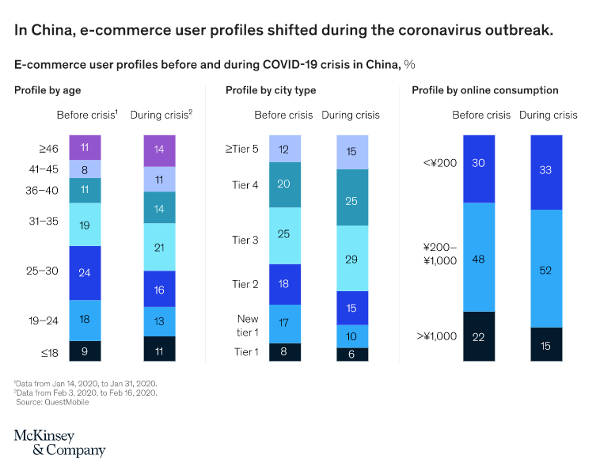
Meanwhile, WSJ points to a KPMG report saying every year, Indians spend $57 billion on about 12 million weddings. It supports millions of workers—caterers, makeup artists, decorators, musicians. Under lockdown, the scale and size of weddings have come down. Will they be back with a vengeance? Or will they be more subdued?
Help others find strength
In HBR, Ron Carucci shares an anecdote about his client. His client had to comfort one of her anxious and deeply worried direct reports who wanted to know when it would all end. So, she responded by suggesting it could be mid-May. It ended up creating false hope among her team. Carucci writes, she should have instead said, “I wish I knew when this would all be over. But your question made me wonder about a deeper question: What part of this have you found to be the most difficult?”
“This would have allowed her team member to uncover, and ideally work through, deeper concerns,” Carucci wrote.
Dress up and keep fit
We got this on WhatsApp with a comment, “four stages of lockdown”:

What do you do to keep yourself fit? Share it with us. Or post on Twitter, and tag us @foundingf. Or join our Slack channel and post it there. If you aren’t there already, here is the invite code.
Bookmark Founding Fuel’s special section on Thriving in Volatile Times. All our stories on how individuals and businesses are responding to the pandemic until now are posted there.
Warm regards,
Team Founding Fuel
April 26: Blend physical and digital infrastructure, connect to the larger purpose, follow science
Good morning,
In his memoir, Mind Master: Winning Lessons From A Champion’s Life, Viswanathan “Vishy” Anand dwells upon an age-old question in chess. How many moves ahead should one look while playing? Anand writes, “the basic answer is that if the path ahead is like a highway and you simply have to follow it, then it’s possible to see far ahead since it’s a straight road before you. The alternative is entering a dense thicket, where after every step there is a choice of three or four steps, and you have to evaluate which one you are going to choose—and that’s not all. For each step you take, your opponent has three or four responses, which you will again have to counter individually. In these kinds of positions, you invariably see less. In fact, the longer the calculations, the higher the chances of making a mistake.”
Looking at the uncertainty all around us, one might be tempted to focus just on the next two or three steps, evaluating multiple responses for each of those.
However, fortunately, life is less like a game of chess, and more like stock market investment, in one crucial way. It might be hard to predict how a share might move today, but, as most value investors would agree, we can predict its long-term direction. Then again, a value investor can afford to totally ignore short-term price movements, but in the real world we have to worry about the next steps too.
That’s our challenge.
Wish you a happy Sunday.
Blend physical and digital infrastructure
The New York Times reports that just in the past month, over 4,000 malicious websites have cropped up to dupe people into sharing their personal data. The trigger is the huge relief programme announced by the Trump administration. Using this data scamsters pose as their victims, often people who need the relief the most, and swindle their money away.
Meanwhile, in India, The Economic Times reports that India used its network of 1.36 lakh post offices and 1.86 lakh Aadhaar-enabled micro ATMs to distribute Rs 412 crore to beneficiaries in mostly rural and unbanked areas.
There has been a lot of debate over digital vs. physical over the last few years, which has indeed intensified under the lockdown. However, effective delivery of services often involves both.
Connect to the larger purpose
In HBR, Francesca Gino and Dan Cable refer to a study of decision making at Nasa in the 1960s by Wharton professor Andrew Carton. Prof Carton found that employees saw “a stronger connection between their work and Nasa’s ultimate aspirations”. They were not saying, “I’m building electrical circuits” or “I’m mopping floors” but “I’m putting a man on the moon.”
Gino and Cable write that during the lockdown, it’s imperative for leaders to discuss questions on personal purposes with their team, and see how they align with the organisation’s purpose. A sense of purpose can boost employees’ coordination and collective enthusiasm.
Follow science
This obviously is a spoof, but it sets right some of the serious misconceptions about curing coronavirus.
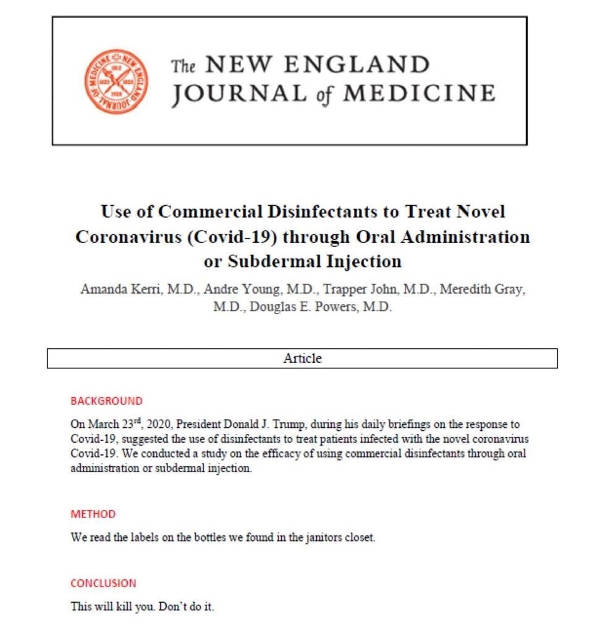
(Via WhatsApp)
What’s your most authoritative source for tracking the new coronavirus? Share them with us. Or post on Twitter, and tag us @foundingf. Or join our Slack channel and post it there. If you aren’t there already, here is the invite code.
Bookmark Founding Fuel’s special section on Thriving in Volatile Times. All our stories on how individuals and businesses are responding to the pandemic until now are posted there.
Warm regards,
Team Founding Fuel
April 25: Do deep work, involve the community, make it visual
Good morning,
India has been on a war against household pollution for decades. Household pollution primarily comes from using dry fuel and disproportionately impacts women, children and the elderly, giving them respiratory diseases and causing early deaths. One of the ways to solve the issue is by giving them LPG cylinders. Another way is to install chimneys. That’s what an NGO working in a remote village tried. It installed chimneys above the stoves. It seemed to work. Then, something strange started happening. In almost all those houses, the roofs started collapsing. They investigated and found that the village was in a termite-infested area. Earlier, the smoke from the stoves killed the termites in the beams supporting the roofs. The chimneys took the smoke directly outside. Termites came back. The beams became weak. Roofs started collapsing.
Whenever we try to solve a problem, the law of unintended consequences asserts itself. We can’t avoid it. However, keeping the feedback loops strong, willing to make midcourse corrections, and being agile will help.
What changes did you make in the past? What might be the unintended consequences of those changes? Should you be worried? Such reflections help.
Here are three things we found interesting.
Do deep work
AR Rahman, a much-loved musician and technophile, has some practical advice to get things done while working from home. The Hindu quotes him saying:
“I keep all phones, ringers and emails off while working. I’ll be in the middle of something and suddenly get a message reading ‘pay your taxes!’ which will totally distract me. I know it’s tough to survive without phones, but just for that one hour, you need to dive deep into your inner consciousness and focus on work with a radar around you. That’s more than enough.
“Make the above a pattern and get back to people after finishing your work, so they know not to disturb you during such times.”
Involve the community
The Correspondent hosted a fascinating conversation with a diverse group of experts on how COVID-19 is worsening inequality and what we can do about it. One of the key themes was the important role community plays in providing solutions.
James Hargreaves, London School of Hygiene and Tropical Medicine: “I would like to see the conversation move very quickly to what national and international action can be taken with a longer term view. How can we create an ‘enabling environment’ to support people to protect themselves. There are no easy answers here. But it has to involve communities, to recognise the many influences on people's behaviour, and not accept a limited range of policy responses.”
Rochelle Burgess, UCL Centre for Global Non-Communicable Diseases: “How do we challenge ourselves to think differently and act differently, most likely in solidarity—to change the story that COVID-19 tells about humanity? Part of me thinks we can't wait for governments to act—community mobilisation in local ways will be the only tangible way that we stem this tide. Perhaps as it always has been.”
Dig deeper (To access the conversation, please do use the code shared by our good friend Tanmoy Goswami on Twitter)
Make it visual
We spotted these deep questions on Twitter:
Do you take sketchnotes? Share them with us. Or post on Twitter, and tag us @foundingf. Or join our Slack channel and post it there. If you aren’t there already, here is the invite code.
Bookmark Founding Fuel’s special section on Thriving in Volatile Times. All our stories on how individuals and businesses are responding to the pandemic until now are posted there.
Warm regards,
Team Founding Fuel
April 24: Take care of your people, find ways to honour your commitment, make a statement
Good morning,
In an essay published in Strategy + Business, Daniel Akst meditates on what lessons one might learn from Albert Camus’ 1947 book, The Plague. Set in French Algerian city of Oran fighting a plague, the novel explores deeper questions on life and purpose. Akst writes, “Today, with astonishing suddenness, the whole world looks like Oran. Our plague is new, but it raises the same old questions. What matters? Why do we live? How serious are we about our values?”
Akst implores us to give deep thought to these important questions, and align the answers to our businesses.
Here are three things we found interesting.
Take care of your people
A webinar organised by TiE Delhi on how F&B businesses operate during COVID-19 offered some interesting insights into how businesses such as Bigbasket (which sells grocery online), Licious (fresh meat, online), ID Foods (best known for idli and dosa batter, sold via retailers). PC Musthafa, co-founder and CEO of ID Foods, said this pandemic helped him understand what he was doing wrong earlier, and make his operations more efficient. ID continued to operate during the lockdown, with the factory workers staying in dormitories. He got doctors to speak directly to his workforce about the nature of the virus and the risks. There is so much misconception about it, he said. Similarly, many ID employees are migrant workers staying away from their families. Musthafa and his team spoke to their family members and took them into confidence. Those things helped, he said.
“You can look at this as a crisis or a challenge. If you look at this as a challenge, you will innovate,” he said. The conversation also featured Hari Menon of Bigbasket, Vivek Gupta of Licious and Sahil Barua of Delhivery.
Find ways to honour your commitment
There has been a stream of news about some businesses revoking offers they made during campus placements. Internship opportunities have mostly vanished. WSJ has a report on how some companies are managing internships during the lockdown by moving them online. It quotes a Michigan State University official: “For many employers, their internship programme is critical to their talent pipeline for future open positions.”
The story goes on to say, “Moelis & Co., an investment bank in New York, shortened its summer internship programme to four weeks online beginning in early July. At the same time it revamped the internship programme, the bank also extended full-time job offers to all of its undergraduate and M.B.A. summer interns, promising them jobs that start in 2021.”
Make a statement…
With your masks. It looks like this will be a common sight in shopping districts after the lockdown.

(Via Whatsapp)
Share your mask photos with us. Or post on Twitter, and tag us @foundingf. Or join our Slack channel and post it there. If you aren’t there already, here is the invite code.
Bookmark Founding Fuel’s special section on Thriving in Volatile Times. All our stories on how individuals and businesses are responding to the pandemic until now are posted there.
Warm regards,
Team Founding Fuel
April 23: Get things done under constraints, plan your replacement, and experiment
Good morning,
In Meltdown, Why Our Systems Fail and What We Can Do About It, Chris Clearfield and András Tilcsik write, “We tend to celebrate intuition and self-confidence, want to hear good news, and feel comfortable around people who look and think like us. But managing complex, coupled systems requires the opposite—careful and humble decision making, the open sharing of bad news, and an emphasis on doubt, dissent, and diversity.”
As we face a meltdown today, in part because of the tightly coupled global systems, and when there is a deep desire to seek comfort in strong leaders and decisive actions, it is also a good time to take a pause and reflect on the statement that calls for humility, doubt, and diversity.
Have a great day.
Here are three things we found interesting.
Learn to get things done under constraints
Hindustan Times carried a fascinating PTI story of a history teacher in Ahanda village in West Bengal’s Bankura district. He continues to teach history even during the lockdown. His students are located 200 km away in Kolkata. What makes the story fascinating though is that every morning he climbs up a tree, and perches on a wooden plank to take the class. The reason, this is the best place to get a decent cell phone connection in his village. The adventures of the teacher, 35-year-old Subrapati, highlights the state of infrastructure in the country, but it also says something about India’s ability to work under severe constraints to get things done.
Working under constraints is something that we have to brace ourselves for in the foreseeable future.
Plan your replacement
To talk about succession is never a comfortable conversation even in pragmatic organisations. Some of them found a way to discuss it by turning the question ‘what if you are hit by a truck tomorrow’ into a cliche. However, with the pandemic, the question, ‘what if you are hit by a virus’ is not only real but also immediate. Some organisations are working on it at multiple levels. WSJ reports:
“At IAC/InterActive Corp., parent company of web sites such as Vimeo and Dotdash, executives maintain a document noting who could step into a role within 24 hours, said Chief Executive Joey Levin. If there is not a clear successor, the company notes who could take over on a temporary basis, or who may be ‘one to two positions away from being ready to fill in that role,’ he said.”
Experiment
With food, when you can. You would have had idlis, but have you ever had...
Share your food photos—with description—with us by mail. Or post on Twitter, and tag us @foundingf. Or join our Slack channel and post it there. If you aren’t there already, here is the invite code.
Bookmark Founding Fuel’s special section on Thriving in Volatile Times. All our stories on how individuals and businesses are responding to the pandemic until now are posted there.
Warm regards,
Team Founding Fuel
April 22: Build a borderless organisation, keep your stakeholders close, protect your ears
Good morning,
In Transforming Systems, Why the World Needs a New Ethical Toolkit, Arun Maira writes, “great leaders have the capability to look inside themselves, to examine their own motives for action and their own prejudices too. They have the submarine-like capability to go beneath the waterline within their own minds.”
In the book, Maira goes on to quote Gandhi’s famous talisman. But along the way, he hints at an effective tool that Gandhi used, something that might come handy especially at a time of crisis. “Gandhi was a great note-keeper. He listened to his mind and recorded his reflections, questions and insights.”
What are your thoughts on keeping a journal? Do you write down your reflections, questions and insights as you look around and see ‘decades happening in weeks’? Feel free to write to us about your experience.
Have a great day.
Here are three things we found interesting.
Build a borderless organisation
In his earnings call with analysts, Tata Consultancy Services CEO Rajesh Gopinathan highlighted an initiative that helped the IT services company work better under the lockdown.
From offshore development centre model, which essentially recreated the workspace of a client (strict physical boundaries, developers working on the same verticals, and often projects bunched together), TCS was moving to an open office model where engineers from different verticals and projects working out of the same space, with technology taking care of the security. From here, letting employees working from home was relatively easier.
“This is our new operating model and represents the future of work,” he says. “It helps our employees enjoy a better quality of life and it helps organisations become more resilient, because the fully distributed nature of this model is inherently less risky and better suited for business continuity and agility.”
Keep your stakeholders close
In Harvard Business Review, Joan Garry explains how nonprofit leaders can keep their organisations afloat. It has lessons for all kinds of organisations. For example, Garry writes:
“Karen Pearl is the CEO of God’s Love We Deliver, which prepares and delivers nutritious meals to New Yorkers homebound with chronic illnesses. When New York became the epicenter of the coronavirus outbreak, she nurtured a variety of stakeholders, including employees and donors, via video conference; it was something like Franklin Delano Roosevelt’s fireside chats in the 1930s.
“She explained in detail how operations had changed, shared the stories of drivers going the extra mile, and described how carefully kitchen volunteers were cooking and packing. She brought her ‘tribe’ closer to the organisation and we can only expect she will continue to keep them close.”
Protect your ears
We came across this simple innovation by a 12-year-old kid:
Know simple hacks to make life more comfortable during coronavirus? Share them with us by mail. Or post on Twitter, and tag us @foundingf. Or join our Slack channel and post it there. If you aren’t there already, here is the invite code.
Bookmark Founding Fuel’s special section on Thriving in Volatile Times. All our stories on how individuals and businesses are responding to the pandemic until now are posted there.
Warm regards,
Team Founding Fuel
April 21: Redesign your work, build systems for society, keep distance
Good morning,
In 2002, John D Sterman, a professor at MIT Sloan School of Management gave a lecture to persuade his listeners, among other things, to break the boundaries. “We live in a society that trains us to stay within artificial and damaging boundaries far more effectively than any invisible fence trains a dog. Much of our education consists of getting punished for crossing boundaries. School teaches us that every subject is different, and knowledge is fragmented (math is completely separate from social studies, which is different from literature),” he said.
In our work, we continue to erect fences and categorise problems as marketing, operations, financial or people problems.
“But all too often, the invisible fences in our minds cut critical feedbacks, deny us the insights of people with different experience and perspectives, and breed arrogance about our ability to control nature and other people—and then our problems grow worse.”
What invisible fences should we break today?
Have a great week ahead.
Redesign your work
Overload, a new book by Erin L. Kelly, a B-school professor and Phyllis Moen, a sociologist, promises a fascinating insight into how organisations operate and what we need to make our working lives better. The book is based on a massive experiment they conducted in an IT company in the US. Some may assume that having a job in a tech firm, with huge salaries and benefits, ergonomic chairs and generally well-designed workspaces is generally a good thing. But even in good jobs employees suffer “high levels of chronic stress and ill health, feelings of powerlessness, work–family conflict, and burnout”. The experiment involved letting one group with randomly selected members to redesign their own work. It included
- Working from home two or three days a week, taking a couple of hours off from work
- Getting offline to do concentrated work (no phones, chats, etc)
- Avoiding unnecessary meetings (sharing materials beforehand instead of being present in meetings)
The result: They were putting in the same hours of work, but job satisfaction and well being went up, burnout came down.
Build systems for society
Dr. Avinash Pol, Chief Advisor at Paani Foundation and a dental surgeon based in Satara, tells NDTV, that an experiment to deliver farm produce directly to the homes of consumers is set to scale up further. After starting with four trucks, the group of farmers now uses 100 trucks for delivery across four districts—Satara, Akola, Solapur and Sangli. They are now looking to see if they can extend their model to the Mumbai area as well. “This is a revolution waiting to happen,” Dr Pol says.
Anmol Shrivastava told the story of what is happening in Satara earlier this month. He quoted Sanchit Dhumal, head of the health department at the municipal council. "Corona is making all of us reflect and bring in systems which are for the benefit of the citizens. I think we should not wait for the next virus to again set up such systems."
Keep distance
In case you missed it, being a champ comes with some inherent advantages
What are your biggest lessons from following sportspersons? Share your lessons with us by mail. Or post on Twitter, and tag us @foundingf. Or join our Slack channel and post it there. If you aren’t there already, here is the invite code.
Bookmark Founding Fuel’s special section on Thriving in Volatile Times. All our stories on how individuals and businesses are responding to the pandemic until now are posted there.
Warm regards,
Team Founding Fuel
April 20: Reflect on what you learn, build, get used to video conferencing
Good morning,
110 years ago, around this time, Theodore Roosevelt gave a speech that contained one of the most inspiring statements ever made.
“It is not the critic who counts; not the man who points out how the strong man stumbles, or where the doer of deeds could have done them better. The credit belongs to the man who is actually in the arena, whose face is marred by dust and sweat and blood; who strives valiantly; who errs, who comes short again and again, because there is no effort without error and shortcoming; but who does actually strive to do the deeds; who knows great enthusiasms, the great devotions; who spends himself in a worthy cause; who at the best knows in the end the triumph of high achievement, and who at the worst, if he fails, at least fails while daring greatly, so that his place shall never be with those cold and timid souls who neither know victory nor defeat.”
You will find this spirit reflected in one of the passages we picked for you as you start a fresh week.
Happy reading.
Have a great week ahead.
Reflect on what you learn
On Sunday, we had #KaapiWithKavi, a twitter conversation where Kavi Arasu answered questions around work and life during the lockdown and after. Here’s a sample exchange
Indrajit Gupta: Hi Kavi, I see leaders registering for a plethora of webinars during the lockdown, often 3/4 in a week! While this quest for knowledge may be commendable, does this learning-on-steroids approach really work?
Kavi: The quantity of learning is not going to be equivalent to what will eventually matter. FOMO, the novelty of learning through webinars and keeping up with the Joneses are additional factors along with the genuine interest in learning. Quantity adds to the pressure.
Drinking from the firehose is no solution. There are plenty available. Some reflection and conversation on what matters and why will help decide on learning that matters.
Going for every single webinar out there will choke up bandwidth. The learners included. Choose well. Find an opportunity to talk about it. And reflect on what you learn.
Build
In a passionate essay, Marc Andreessen implores the United States to go back to its roots to build—to get out of the problems we are facing today, and to protect ourselves from the problems of the future. It applies as much to India, as it does to the US.
“Every step of the way, to everyone around us, we should be asking the question, what are you building? What are you building directly, or helping other people to build, or teaching other people to build, or taking care of people who are building? If the work you’re doing isn’t either leading to something being built or taking care of people directly, we’ve failed you, and we need to get you into a position, an occupation, a career where you can contribute to building. There are always outstanding people in even the most broken systems—we need to get all the talent we can on the biggest problems we have, and on building the answers to those problems.”
Get used to video conferencing
We found this clever meme on Twitter:
Can you guess the original painting? Share your answer with us by mail. Or post on Twitter, and tag us @foundingf. Or join our Slack channel and post it there. If you aren’t there already, here is the invite code.
Bookmark Founding Fuel’s special section on Thriving in Volatile Times. All our stories on how individuals and businesses are responding to the pandemic until now are posted there.
Warm regards,
Team Founding Fuel
April 19: How to hold on, and also find answers for what next
Good morning,
In The Rise of India: Its Transformation from Poverty to Prosperity, Niranjan Rajadhyaksha shares an old tale to explain India’s ambivalent attitude towards material pleasure. In his telling, it goes like this: “A man is running hard to escape a hungry tiger. He tumbles in panic and rolls off a precipice. He is falling to what promises to be a certain death in the gorge below, when he just manages to clutch at a small tree that is growing on the rock face. He hangs there for dear life. The choice is a bleak one. Above him is a hungry tiger and below him is a deep gorge. There is death on both sides. Just then, the dangling man’s eyes fall upon an abandoned beehive that is a few feet above the tree that he is frantically hanging on to. There is honey dripping from the beehive. The man shuts his eyes and puts his tongue out to catch the sweet honey. It is his moment of fleeting bliss!”
The tale might well describe the place the world is in right now. It’s hanging between harm caused by the virus and harm caused by the lockdown.
However, there is a difference. We know that the lockdown will be lifted sooner or later, and vaccines will be developed sooner or later. Can we hold on to the tree till then?
Our endeavour at Founding Fuel has been to figure out not only how to hold on, but also find out answers for what next. What’s the kind of state, business and social sector we want to live in the post-COVID-19 world?
The stories we published this past week reflect some of that ambition. We thank you very much for being a part of this journey towards that better future.
Have a fantastic Sunday.
Cultivate resilience
Over seven days Vijay Bhat offered us insights and practices so we learn how to bend without breaking.
“In any crisis, resilience is the first and foundational quality that leaders need. Resilience arises from the internal state of ‘presence’. It comprises two capacities: Endurance, i.e. the ability to handle the immediate shock, and recovery, i.e. the ability to bounce-back quickly and effectively, to create a new normal. Most people tend to focus on the latter, while ignoring the former. This is dangerous.”
Align infrastructure and intent
Amrita Chowdhury drew lessons from the Agra Model of coordinated teams and digital tools for containment, tracking, healthcare delivery, and citizen relief response management.
“In his book Rules of the Game, Sumit Chowdhury posits that action-reaction cycles improve individual performance. Everything we do is a reaction to some event in the world. It has some component of physical action (or work) and another component of thought and intent, he says. Both the action and the intent have to align for an optimal outcome. When the action-reaction analogy is extrapolated to government and public sector enterprises, replace it with infrastructure and intent.”
Take care of your people
Piyul Mukherjee and her team at Quipper shared some inspiring takes from Surat. Here’s one about Ashish Raut, who owns an embroidery unit in Surat, with 12 karigars working for him, on daily wages. Ashish learnt about the lockdown only on his way back home, and this is what he did next.
“He immediately turned his scooter around and rushed back to the karkhana (factory). Normally the karigars (artisans) would be paid for the consignment they were working on, once monies were received from his clients. This can take as much as three months because rolling credit is common across the city.
“Ashish brought forward the dues to each karigar, and paid them with cash that he managed to withdraw from the ATM. Before it ran out of money.
“The karigars were mystified. And bewildered.
“ ‘If I did not pay them, how would they survive?’ he reasons.”
Get ready to solve wicked problems
Madan Padaki, co-founder at 1Bridge and Gayathri Vasudevan, co-founder of LabourNet, engaged with Team Founding Fuel along with Arun Maira (author and former Member of Planning Commission) and Devangshu Dutta (Chief Executive, Third EyeSight). The conversation explored, among other things, the challenges we will face after the lockdown is lifted.
“How do you re-skill people at short notice? Most of them may not be digitally literate. How do you deliver learning to those whose hands are needed on the job?
“And assuming reskilling happens, the number of opportunities to accommodate everyone are limited. Then there are industries that will take a long while to recover. By way of example, consider beauty and healthcare where people have to get in close proximity with each other. After the pandemic, it is inevitable people will hesitate for a long while to interact closely with other humans.”
Plan every minute
Kavi Arasu had long conversations with his peers in China and the Far East to see if we could learn something from them. They have already gone through what we are experiencing now. Here is one lesson.
“Long duration lockdowns have meant people now plan every part of their lives. ‘We had very limited time to step out and had to get a number of things within that time. Everything was planned. The same applied at home too. I had to coordinate calendars to slot kids’ classes, my client engagements and other priorities. There just was no space for slack. Life, in general, has become planned and methodical.’ said Sue….
“The whimsical stroll, the catch up with a friend, the random 'ordering in’ and other spontaneous acts are now snatches of luxuries.”
Later today, from 3PM-4PM, Kavi will be on Twitter for an AMA session, #KaapiWithKavi. He will help business leaders figure out answers to questions on work under lockdown based on insights from his conversations with his peers in China & the Far East. If you have stories, dilemmas, questions, post them on Twitter. Please Tag @FoundingF, @_Kavi and use the hashtag #ThrivingInVolatileTimes.
Join our Slack channel to discuss the session with our community. If you aren’t there already, here is the invite code.
Bookmark Founding Fuel’s special section on Thriving in Volatile Times. All our stories on how individuals and businesses are responding to the pandemic until now are posted there.
Warm regards,
Team Founding Fuel
April 18: Learn new habits, walk the talk, build a standing desk
Good morning,
Peter Thiel begins his Zero to One, Notes on Startups or How to Build the Future, with a question: “What important truth do very few people agree with you on?”
A few lines later, he helpfully gives us a format that the good answers take: “Most people believe in x, but the truth is the opposite of x.”
And somewhere in the middle of the chapter, he gives his own answer: “Most people think the future of the world will be defined by globalisation, but the truth is that technology matters more.”
Right now, technology—in the form of tests, vaccines and treatment for COVID-19—definitely seems to matter a lot more than anything else.
However, Thiel also uses the question to think about the future. And it’s a good question to ponder over this weekend.
Have a great weekend.
Learn new habits
In the past few weeks, Kavi Arasu spent a good amount of time talking to people from across the world on how to survive and thrive during these volatile times. For the Founding Fuel network, he captured some of the lessons from his peers and friends in Shanghai, Beijing, Hong Kong and Singapore who went through the struggles much of India and the West is going through today. Here’s a pertinent quote.
“ ‘We lost perspective of time. We have learnt a few things by default, by rote, if you will. If we had known that we were going to be locked down for this period, perhaps we could have better planned to learn a few new habits,’ said Sue. And then, she added wistfully, ‘Maybe you people can.’ ”
Kavi has kindly agreed to take our questions on this subject from 3PM to 4PM IST on Sunday, April 19, on Twitter. Join our Slack channel and follow us on Twitter @foundingf for more details.
Walk the talk
We listened to a webinar titled #Covid19 vs. Bharat Startups, featuring Amol Warange (Omidyar Network), Ganesh Rengaswamy (Quona) and Nat Malupillai (Michael & Susan Dell Foundation). Responding to a question on deploying capital during these times, Rengaswamy said it’s “now much easier to know the difference between someone who can talk versus someone who can walk the talk”. He pointed to a few specific things that smart entrepreneurs have good answers to:
- How do I take care of my stakeholders, my people, my ecosystem partners, my shareholders, my customers?
- At a deeper level, how am I motivating people, keeping them charged up?
- How realistic am I? What am I bullish about? What am I worried about?
- How will I change my business when the lockdown lifts (as opposed to hoping that the world doesn't change)?
Build a standing desk
And other WFH tips from Hasan Minhaj.
What are your tips for #WFH? Share them with us on mail. Or post on Twitter, and tag us @foundingf. Or join our Slack channel and post it there. If you aren’t there already, here is the invite code.
Bookmark Founding Fuel’s special section on Thriving in Volatile Times. All our stories on how individuals and businesses are responding to the pandemic until now are posted there.
Warm regards,
Team Founding Fuel
April 17: Beware of shifts, plan your testing strategy, design your masks
Good morning,
In the 1940s, during the partition, thousands of refugees were arriving in Delhi. The government couldn’t keep count. Amidst all this, there were concerns that bags of wheat, meant for the refugees, were getting diverted. The bureaucrat in charge of the godowns didn’t know if the wheat that goes out was being used to make rotis, or sold in the black market. He took the problem to Prasanta Chandra Mahalanobis. Mahalanobis thought for a while and told him to check if the ratio between salt and wheat being signed out of his godowns remained the same at the end of each day. If that ratio doesn’t change, then the wheat was going to the kitchens. If the ratio changes, he will have to investigate. It worked.
Often, all it takes to fix big problems is a little imagination.
Have a great day.
Beware of supply/demand shifts
Sangeet Paul Choudary, in his Founding Fuel Masterclass yesterday, pointed out how platforms might accumulate more power in the post-Covid-19 world. He explained it using the example of restaurants vs aggregators. Sangeet said:
“If you think of restaurants right now, and you see the restaurant aggregators, or delivery companies like Uber Eats, for example, there's a clear shift in value happening over there, both on the demand side and the supply side. So the demand side there's a behaviour shift [not eating out], because of which it does not make sense. You can't keep a restaurant open and when you don't have the restaurant open, paying high rental rates does not make sense anymore. And so what [that] might lead to is the supply side shift in value as well because as restaurants start shutting down, these aggregators can set up dark kitchens, identify from the data what kind of things sell, which restaurants sell, which specific kind of items and just licence that or in some cases even deconstruct that, or just hire the chef from that restaurant. And move all of that into the dark kitchens. And once that's moved into the dark kitchen, they are not located in central areas, they are located in the suburbs, they are located closer to delivery. So the entire economic model of the dark kitchen works out much better.”
Plan your testing strategy
There’s a lot of debate in India and across the world on whether enough tests are being done. There are strong arguments why the current strategy of testing only the high-risk population (travel history, symptoms, contact history, etc) is the right one, for now. However, if we have to create green zones where people can move around freely and kick-start the economy, there is a need to test more and more people, even those who don’t show symptoms. The job might eventually land on businesses who want to get going. (And avoid cases like the pizza delivery person in Delhi who was tested positive.) WSJ reports Amazon, which recently opened 100,000 new positions at delivery centres, is also “building a testing capacity to diagnose all employees for Covid-19”.
Eventually, it might fall on Indian businesses to build similar capacities, as the promise of vaccines remains distant, and the pressure to reopen the economy grows stronger. However, a couple of executives we spoke to advise not to rush into buying testing kits without due diligence.
Design your masks
For the post-lockdown phase. Here’s one from Tajikistan.
Have you come across masks with nice Indian designs? Share them with us on mail. Or post on Twitter, and tag us @foundingf. Or join our Slack channel and post it there. If you aren’t there already, here is the invite code.
Bookmark Founding Fuel’s special section on Thriving in Volatile Times. All our stories on how individuals and businesses are responding to the pandemic until now are posted there.
Warm regards,
Team Founding Fuel
April 16: Take care of your people, keep the morale up, read
Good morning,
When E Sreedharan was appointed to lead the Delhi Metro project, he came with the reputation of finishing all his projects on time—however difficult. Yet, in the late 2000s, when the Delhi Gurgaon line was being built, it looked certain that it would be delayed. The reason: there was difficulty in acquiring land for a station from farmhouses. The owners went to court. The case threatened to go on and on. Sreedharan, however, was unfazed and asked his team to focus on prefabricating the entire station in another location. Six-odd months later, the court ruling came in DMRC’s favour, and his team quickly assembled the station. On-time, yet again.
What can you build today that will speed up your work when the lockdown is lifted sometime in the future?
Have a great day.
Here are three things we found interesting.
Take care of your people
In their latest despatch from Surat, Piyul Mukherjee and her team at Quipper Research tell the inspiring story of Harekrishna Kushwaha, who owns Maurya Sweets, a tea and snacks stall in the city.
“With the Covid-19 pandemic and shutdown, Kushwaha had no alternative, he says, and has brought home his staff of four men, who had earlier stayed inside the shop at night.
“The announcement of a nationwide 21-day lockdown (and now further extended till May 3), has brought his already limping business to a standstill. ‘Since the lockdown, I have no money to pay my employees,’ he says.
“The least Harekrishna felt he could do, was to ensure they are regularly fed and taken care of.
“As a result, there are 22 people living in his humble house right now.
“ ‘They are not from here. Where will they go at a time like this? What can I do even though I’m struggling with money? They are in a condition that is far worse than me,’ he laments.”
Keep the morale up
Japan Today/SoraNews 24 reports:
“Tokyo-based Gree, one of Japan’s largest mobile game companies, has its staff of some 1,700 people telecommuting these days, what with a state of emergency declared for the city. As a tech-savvy outfit, the staff is likely coping better than many in adapting, but Gree’s management is worried about the potential loss of morale, solidarity, and informal communication that comes from working in isolation. After all, if no one’s going to the office, then no one’s inviting each other to grab a drink at the bar across the street from the office after work.
“So Gree’s idea is to encourage coworkers have online drinking parties, utilizing the same sort of video chat software they’d use for video conferences. The company is even willing to partially foot the bill, as it’s offering employees a budget of 3,000 yen per month to buy drinks and snacks with.”
Read
The book titles, together.
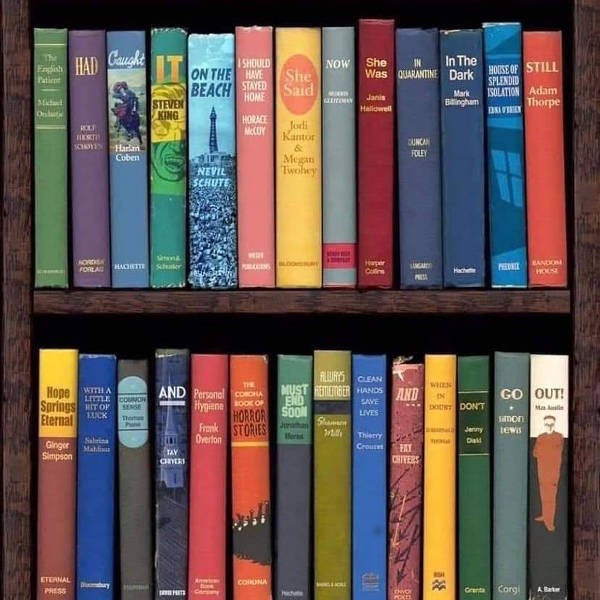
(Via WhatsApp)
What books are you reading now? Share them with us on mail. Or post on Twitter, and tag us @foundingf. Or join our Slack channel and post it there. If you aren’t there already, here is the invite code.
Bookmark Founding Fuel’s special section on Thriving in Volatile Times. All our stories on how individuals and businesses are responding to the pandemic until now are posted there.
Warm regards,
Team Founding Fuel
April 15: Coordinate, face down reality, keep moving
Good morning,
This is wartime now, so here’s an anecdote about Field Marshal Sam Manekshaw, from Major General Eustace D'Souza. D’Souza writes, “He was fearless. When he was a major with the Sikh company in Burma, they had a promotion meeting for the appointment of lance naik to naik.
“He didn't approve of one name because he said he was a rascal. That man sent word to Sam saying, 'I would kill you.' So Sam Manekshaw told his senior subedar—’'Unko march karna hai'.
“He was marched before Sam and he asked him—’You are going to kill me? Here's my pistol, now come on shoot me.' That man was so taken aback that he marched out meekly.”
Often, the best way to deal with a situation is to take it head-on.
Have a great day.
Here are three things we found interesting.
Coordinate, coordinate
Amrita Chowdhury, Director, Gaia Smart Cities, explains the Agra model, which is being hailed as a national example every district and city should follow. One of the key lessons: get different departments to work together.
“The Integrated Command and Control Centre... has become the war room for the district’s emergency response management to the COVID-19 crisis. Senior Superintendent of Police, Babloo Kumar and SP Police Traffic Prashant Kumar Prasad have deployed a small emergency team to man the control room.
“Health department teams have moved in as well, with external public health experts supporting with scientific tracking and tracing techniques. District Magistrate Prabhu N Singh and Divisional Commissioner Anil Kumar are on the move, coordinating relief activities.
“At the core of this effort sits a close-knit set of private sector professionals—on-ground consultants and vendors—and their remote, digitally-enabled teams. They are working alongside the district administration to plan, coordinate, and deliver last-mile information, services, permissions, and distribution linkages.”
Face down reality
David Sluss and Edward Powley on how to build your team’s resilience from home:
“First, you can help your team members face down reality. Accepting things as they are is key to building resilience. As Admiral Jim Stockdale, who was held captive during the Vietnam war, famously noted, the optimists among his fellow prisoners (those who expected to be rescued quickly) didn’t survive: ‘I think they all died of broken hearts.’ So ask your direct reports what plans they have in place for working remotely longer than anticipated. While they might not feel comfortable thinking about such things, they will weather the crisis better if you help them plan constructively.”
Keep moving
We got this on WhatsApp:
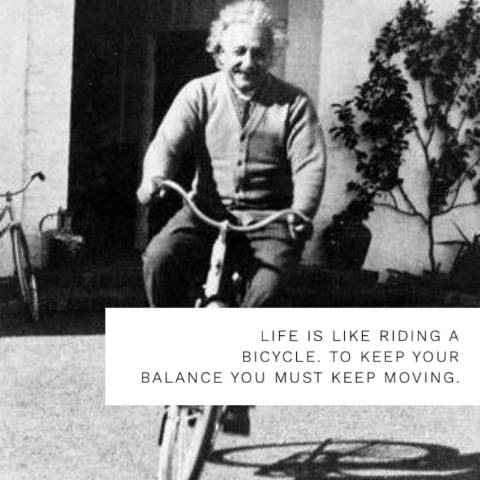
(In case you are wondering, Einstein did use the simile.)
What’s your hack to keep your balance these days? Share them with us on mail. Or post on Twitter, and tag us @foundingf. Or join our Slack channel and post it there. If you aren’t there already, here is the invite code.
Bookmark Founding Fuel’s special section on Thriving in Volatile Times. All our stories on how individuals and businesses are responding to the pandemic until now are posted there.
Warm regards,
Team Founding Fuel
April 14: Be agile, keep a diary, know thy poison
Good morning,
In the preface to The Devil Problem and Other Stories, David Remnick writes, “We order and excite our mental lives with stories. Mostly, they are the same stories over and over again…. There are other textures of mental life—the analytical, the pure emotions of lust or rage—but stories, the telling and listening, are much of what we are.” Yuval Noah Harari, in his bestselling history of humankind, Sapiens, argues that stories played an important role in our evolution and success. One might find all their wisdom compressed in a poster on the wall or on a bumper sticker: Whoever tells the best story wins.
As the impact of coronavirus rages on, what’s the story you are telling yourself, and to the world?
Have a great day.
Here are three things we found interesting.
Be agile
In Knowledge@Wharton, George Day and Paul Schoemaker write about three principles that vigilant firms can use to navigate the chaos caused by coronavirus pandemic. They say firms such as Amazon and Unilever have formed multiple small teams to address immediate and future problems and opportunities. They write:
“With the right set of capabilities, an organization becomes agile when turbulence is high. Agility here means being able to move quickly and adroitly to shift resources to higher value activities sooner than rivals. For example, agile strategies are activated when a scrum is formed to tackle an emerging opportunity or address an immediate threat. A small team or scrum of three to nine people is quickly assembled with all the diverse skills needed to carry out the initiative. They essentially function as self-managing teams, following a transparent process, using design thinking methods to develop and test possible solutions and learn quickly. These features are the antithesis of cumbersome, top-down processes with repetitive meetings, rigid command structures and other impediments to action.”
Keep a diary
In a New York Times column, Jen A. Miller makes a case for keeping a journal during this pandemic. She quotes Ms. Ruth Franklin, author of Shirley Jackson: A Rather Haunted Life, which won the 2016 National Book Critics Circle Award for biography.
“People tend to think that some random person’s daily journal isn’t as important as an exchange of letters between two politicians,” she said. But you never know what impact it may have. “It’s incredibly useful both for us personally and on a historical level to keep a daily record of what goes on around us during difficult times.”
If you don’t know where to start, Miller recommends a site with a useful list of questions.
Know thy poison
We found this on Twitter.
What is eating your time? Share them with us on mail. Or post on Twitter, and tag us @foundingf. Or join our Slack channel and post it there. If you aren’t there already, here is the invite code.
Bookmark Founding Fuel’s special section on Thriving in Volatile Times. All our stories on how individuals and businesses are responding to the pandemic until now are posted there.
Warm regards,
Team Founding Fuel
April 13: Provide a psychological safe space, sharpen your intuition, dress up
Good morning,
In Intuition Pumps and Other Tools for Thinking, philosopher Daniel Dennett shares some thoughtful advice on how to offer criticism.
- You should attempt to re-express your target’s position so clearly, vividly, and fairly that your target says, “Thanks, I wish I’d thought of putting it that way.”
- You should list any points of agreement (especially if they are not matters of general or widespread agreement).
- You should mention anything you have learned from your target.
- Only then are you permitted to say so much as a word of rebuttal or criticism.
These steps are especially important in these stressful times.
Have a fantastic week ahead.
Here are three things we found interesting.
Provide a psychological safe space
In Insead Knowledge, Jaap Winter and Erik van de Loo offer important advice for board members on how to help their executives during these stressful times
“A primary task of non-executive board members is to help ensure that decisions and actions are purposeful and well-considered. To do so, they need to provide containment: a psychological safe space in which executives can share their doubts, insecurities, anger, anxiety and sadness….
“That is why boards should introduce a military-style buddy system: each person monitors and ensures the wellbeing of one of her or his colleagues. It is often easier to detect signs of stress in others than in yourself.”
Sharpen your intuition
Simon Sinek says: “Having intuition is having a sense of something. When you know your why, it enhances intuition because why is the root of the intuition. I sometimes do forget my why, when I go into meetings and sometimes my intuition misguides me because I start focusing on the things they're telling me. I remind myself why I do what I do and this is more important than anything else. And if I take a different path, I do so knowingly and I know the costs of doing so. So intuition is one of those things. The more we practise starting with why, the more we practise leading with why, the more we practise making decisions with why, the stronger our intuition becomes.”
Dress up
And other useful advice from Scriberia:
What are your top hacks for remote working? Share them with us on mail. Or post on Twitter, and tag us @foundingf. Or join our Slack channel and post it there. If you aren’t there already, here is the invite code.
Bookmark Founding Fuel’s special section on Thriving in Volatile Times. All our stories on how individuals and businesses are responding to the pandemic until now are posted there.
Warm regards,
Team Founding Fuel
April 12: Five lessons for thriving in volatile times
Good morning,
COVID-19 is a storm with unprecedented fury, wrote Arun Maira in a two-part essay in Founding Fuel. “It is tearing down economies everywhere. We are realising that the economy will not return to the old normal. When the storm has passed, what is the shape of the new economy we will build?”
This question has been on top of our minds at Founding Fuel, even as we exchange notes over WhatsApp and over Zoom conversations, and do joint interviews with thoughtful, idealistic, pragmatic people busy solving problems in the real-world. These conversations have helped us clear the fog a little and get a glimpse of the world that is emerging. Not by itself. But by the vision, words and actions of people who want to see a better tomorrow.
These ideas, ideals and best practices were captured in the stories we published in the last two weeks.
Here are five lessons from them.
In case you missed the stories, happy reading!
Have a fantastic Sunday.
Share your stories
Kavi Arasu writes: “Encourage your leaders to share their struggles,,, with the team. Just that one act will loosen up the team and help them see that everybody is in it together. With one organisation that I am working with, leaders resolved to set listening calls with their team members…. One [of the leaders] shared how he has to share household chores... Plus, his wife who also works took his desk and the daughter took the living room for lessons that came from school. There was dead silence on the call for a while before it opened the floodgates for sharing!”
From: WFH: Drinking from a fire hose
Cultivate your resilience: This whole week Vijay Bhat has guided us on how to build resilience in a crisis. His advice for the 7th day: Just relax, repair and renew yourself. Feel free to indulge and enjoy the small pleasures of life. (We will publish an extended version of the 7-day plan on Founding Fuel, so you can refer to it as you continue with your practice.)
Learn new skills
Indrajit Gupta writes: “... international law firm Nishith Desai Associates extended its internal continuous education programme to clients all over the world and other key stakeholders….
“Every day, a series of three virtual learning sessions, led by the firm’s leaders, are being run on Webex. The learning sessions will go on for the next few weeks—and if the programme generates a good response, it might become a permanent feature.”
From: Stories from inside India’s corporate war rooms
Trust your team
Charles Assisi writes: “The workplace revolution, he [K Ramkumar, founder, Leadership Centre] points out, started over 70 years ago beginning with Hugo Munsterberg, a sociologist who pioneered the humanist movement. Munsterberg asked questions such as: What does self-motivation do to productivity? And, what does structure do to productivity? His early findings suggest that:
- If work is structured, it needs no supervisor
- If it is unstructured, it needs a supervisor …
“In the contemporary world, you tell people about the intended outcomes, timelines, and provide them with the resources. His experience is that people deliver upon what is expected.”
From: What employers don’t know about employee monitoring
Invest in human capital
Anmol Shrivastava writes: “[Dr Avinash Pol, a seasoned social worker] offered the small farmers wise counsel. ‘... your primary business is not to sell crops. It is to invest in human capital. This is a great chance not just to serve the residents of Satara during the lockdown, but to address a long-term business opportunity where you can build a direct bond with your customers.’ ”
From: The Satara uprising
Complement each other’s strengths
“Rather than expecting NGOs, private sector and government to substitute for each other, let's learn how to complement each other. Because we all have three birth defects. And we all have very unique strengths. The government has resources, private sector has execution, and NGOs have trust. But NGOs don't have scale. Private sector doesn't have trust, and the government doesn't have execution.”
From: How Corporate India needs to think about managing the pandemic, an interview with Manish Sabharwal
Access all our Thriving in Volatile Times coverage here
What do you think about the stories and lessons? Share your views with us on mail. Or post on Twitter, and tag us @foundingf. Or join our Slack channel and post it there. If you aren’t there already, here is the invite code.
Warm regards,
Team Founding Fuel
April 11: Motivate your team, beat the stressors, connect with nature
Good morning,
In Zen and the Art of Motorcycle Maintenance: An Inquiry into Values, Robert M. Pirsig writes about his time teaching at a small college. He wants to do away with the grades. One would expect A graders would oppose it, while D and F welcome it. However, there’s resistance to his idea across the board—from fellow teachers and students. He goes ahead with his experiment anyway, refusing to grade his students’ assignments. Over time, there is change. Students are turning in better papers. Then, something even better happens.
“In the final weeks of the quarter, a time when normally everyone knows what his grade will be and just sits back half asleep, Phædrus was getting a kind of class participation that made other teachers take notice. The B's and C's had joined the A's in friendly free-for-all discussion that made the class seem like a successful party. Only the D's and F's sat frozen in their chairs, in a complete internal panic.”
At the end of the quarter, he asks the students to evaluate his system. Guess what? His ‘A’ students were in favour, ‘B’ & ‘C’ were divided and ‘D’ & ‘F’ students were against it.
This might be the right time to ask why it’s so. Heads-up: Watch out for Charles Assisi’s story on a related theme today.
Here are three things we found interesting.
Give your team the opportunity to solve problems that matter
In Harvard Business Review, Lindsay McGregor and Neel Doshi write, “If you want your teams to be engaged in their work, you have to make their work engaging. The most powerful way to do this is to give people the opportunity to experiment and solve problems that really matter.”
For example,
- A pharmaceutical company’s clinical trials team is experimenting with ways they can help hospitals prioritise trials and maintain safety during this crisis.
- Teams across the tech unicorn, Flexport, are generating ideas on how to ship critical goods around the world, keep their clients’ supply chains running, and share tips to keep their suppliers in business.
- An insurance company is testing ways to prioritise their skyrocketing internal chat volumes and process claims in timely ways. In the teams we work with, we’ve seen productivity remain high, and in some cases, improve.
Beat the stressors
Day 6 of Vijay Bhat’s 7-day series on how to bend without breaking:
Our immune system—Nature’s amazing gift to us—is our first line of defence against internal and external attack. Most people are unaware that
a) Stress compromises immunity, leading to illness;
b) Stressors can be physical (healthy or unhealthy habits), emotional (positive of negative feelings), mental (enabling or disabling thoughts), relational (supportive or toxic relationships) and spiritual (meaning and purpose);
c) Psychoneuroimmunology (PNI) is the supporting science behind the stress-immunity-illness axis.
What you can do: Complete your Presence Practice. Take the free 30-minute online Holistic Health Questionnaire here. You can also request a free 30-minute online consultation to debrief your personal report. To take specific actions for each stressor—most are now available online—click here.
Connect with nature
From far, through memory, through imagination, through art.
How do you connect with nature these days? Share it with us on mail. Or post on Twitter, and tag us @foundingf. Or join our Slack channel and post it there. If you aren’t there already, here is the invite code.
Bookmark Founding Fuel’s special section on Thriving in Volatile Times. All our stories on how individuals and businesses are responding to the pandemic until now are posted there.
Warm regards,
Team Founding Fuel
April 10: Use tech, accept the reality, engage with kids
Good morning,
Crisis often highlights and amplifies our strengths and weaknesses within a society. This crisis has done that too. In a discussion with the Founding Fuel team, Manish Sabharwal suggested a powerful way to address that in the context of society’s three pillars.
“Rather than expecting NGOs, private sector and government to substitute for each other, let’s learn how to complement each other. Because we all have three birth defects. And we all have very unique strengths. The government has resources, the private sector has execution, and NGOs have trust. But NGOs don’t have scale. The private sector doesn’t have trust, and the government doesn’t have execution,” he told us. You can watch the full interview here.
Here are three things we found interesting.
Use technology
We had a conversation with Bharat Gera yesterday. Bharat, a healthcare tech veteran, has been involved as a volunteer in a few initiatives helping India fight the pandemic. One such programme is StartupsVsCovid. It’s a telemedicine helpline that uses a mix of IVR (interactive voice response) and teleconsultation with doctors. The system has handled one lakh calls and over 14,000 doctor consultations. Such consultations are important in this age of misinformation. People get worried, and a direct line with doctors helps allay fears. It also helps in early diagnosis and stops the spread of the disease. By one estimate, such calls potentially saved 80,000 people from getting infected. Small acts go a long way. The entire project was executed fast, with people working remotely from their homes. It’s an example of what can be achieved using technology.
Gera is on our Slack channel, and we hope to have more conversations with him and others in medtech.
Accept the reality
Day 5 of Vijay Bhat’s 7-day series on how to bend without breaking:
When human beings experience a sudden loss, we cycle through these five natural stages.
- Denial – refuse to accept reality due to the shock;
- Anger – arises from the “why me” question and can take many forms;
- Bargaining – try to change the situation by negotiating and offering something;
- Depression – feel hopeless and helpless;
- Acceptance – reconcile with both the traumatic event and its implications
What you can do: Complete your Presence Practice. On a sheet of paper, answer the following questions.
- What aspect of reality are you denying?
- What is the source of your anger—are you feeling unfairly betrayed, ambushed or violated?
- What healthy or unhealthy bargains are you making—with others and with yourself?
- What are the typical signs/symptoms that you may be sliding into grief and depression? Some examples: an inability to focus or concentrate, unexplained fatigue or depleted energy, feeling helpless or disengaged, restless or irritable, etc.
- What are your coping strategies? Some examples: physical activity, breath-work/pranayama, remember/re-live your happiest memories, eat a mood-boosting meal, reach out to other people, take up a hobby, complete a small task as soon as you wake up, etc.
- What are you willing to accept and what are you resisting … why?
Engage your kids
We came across this lovely illustration in a free book on COVID-19 for kids

You can download the book from here.
What are your children’s favourite books? Share it with us on mail. Or post on Twitter, and tag us @foundingf. Or join our Slack channel and post it there. If you aren’t there already, here is the invite code.
Bookmark Founding Fuel’s special section on Thriving in Volatile Times. All our stories on how individuals and businesses are responding to the pandemic until now are posted there.
Warm regards,
Team Founding Fuel
April 9: It’s not about money, balance your yin and yang; follow a routine
Good morning,
Today is Day 4 of Vijay Bhat’s 7-day programme on how to bend without breaking. How has it been going for you? What’s amazing about these exercises is that it doesn’t take much time, but has a huge impact. We can’t think of other investments with higher returns. Please do share your feedback with us, and we will pass it on to Vijay.
Before we go to today’s practice, here’s some food for thought.
It’s not about money
There is much debate around Universal Basic Income and Direct Cash Transfers in the wake of the coronavirus epidemic. Yesterday, the Founding Fuel team had a fascinating conversation with Gayathri Vasudevan, Madan Padaki, Devangshu Dutta and Arun Maira. It lasted about 2 hours, and we will publish it on our site. Here’s an important perspective on UBI.
Arun Maira: Economists say it’s just a money problem, and so, just give them money, and we will be alright. In fact, the idea of UBI came from the tech world. We are going to produce everything with automated robots everywhere. But then, the question was, how will people buy the products if they don’t earn. Let’s give them UBI. But, it doesn’t answer two questions. First, what is the impact going to be on the psychology of human beings? What sort of society are we going to create? And second, where's the money going to come from in the first place?
Gayathri Vasudevan: I believe pandemic will wake us up. I think we have to understand and embrace work again. It reminds me of the panchayat space I started working in 20-30 years ago. At that time the question was, do women have to work? Do women have to have a voice in panchayat? The reason is not that you have to have a voice or you have to work. But who determines that? It is the self-resilience that it brings by me. My hope really is, the pandemic is going to wake us all up and we will say, you know what, I want to work and I understand why somebody else has to.
Dig deeper
What is the shape of the new economy we will build? By Arun Maira
Balance hardiness and heartiness
Day 4 of Vijay Bhat’s 7-day series on how to bend without breaking:
There is excellent research to show that each one of us has powerful inner resources to cope with crisis. They are called the ‘4 Cs’.
a) Control - reclaiming power to influence life circumstances;
b) Commitment - finding meaning and purpose in adversity;
c) Challenge - reframing old assumptions to overcome current challenges;
d) Cooperation - leveraging collective resources to find innovative solutions.
What you can do: Complete your Presence Practice. On a sheet of paper, answer the following questions: In the current situation,
a) What do you have most/moderate/least control over?
b) What is your highest possibility/aspiration?
c) What old assumptions/beliefs are blocking you?
d) Whose help can you seek, and what support can you offer others?
e) What are you most grateful for, right now?
Balancing hardiness (yang/ masculine) and heartiness (yin/ feminine) is important right now!
Follow a routine
Not quite this, though:
What’s your WFH routine? Share it with us on mail. Or post on Twitter, and tag us @foundingf. Or join our Slack channel and post it there. If you aren’t there already, here is the invite code.
Bookmark Founding Fuel’s special section on Thriving in Volatile Times. All our stories on how individuals and businesses are responding to the pandemic until now are posted there.
Warm regards,
Team Founding Fuel
April 8: Know your limitations, map the change, be tough and tender
Good morning,
In Liar’s Poker, Michael Lewis talks about one of his colleagues on the trading floor, who was always one step ahead of the others. Right after the Chernobyl nuclear disaster broke when traders were dumping nuclear stocks, he was buying crude oil futures; when others came to crude oil; he had moved on to buying American potatoes. He could see what was coming next.
It’s in this spirit, Charles Assisi has been busy working on a special project to understand the post-pandemic world. We now have a stellar team who will help us get the best minds to answer some of the biggest questions in the coming weeks. Check out this tweet to know who is on the Project Editorial Board. Our Slack channel members get a heads-up. Besides, there are some interesting conversations happening over there.
Have a fantastic week ahead.
Know your limitations
As businesses struggle to survive, there might come a time when you have to tell some bad news to your team—pay cuts, furloughs, or, worse, layoffs. Harvard Business Review has some advice on how to manage it with compassion. Here’s one piece of advice.
“Even if you’ve presided over layoffs in the past, overseeing them during the coronavirus outbreak will be different for one key reason: they won’t take place in person because of social distancing measures. What’s more, you need to have a highly private conversation at a time when privacy is difficult to achieve. ‘We all have families under foot and lots of things going on,’ says [Joshua] Margolis [a professor at Harvard Business School]. He suggests asking your employee, ‘Is there a time when I can get 15 minutes of your full attention?’ ”
Map the change
Day 3 of Vijay Bhat’s 7-day series on how to bend without breaking
We all know that “change is a constant”, but very few know the universal pattern and the three key stages of change:
- The familiar ends, eg. your normal, comfortable routine;
- Period of regeneration, when nothing much seems to happen on the surface eg. quarantine;
- New beginning, eg. a totally new way to work and relate to other people
What you can do: Complete your Presence Practice. On a sheet of paper, answer the following questions.
- What is ending … and what can you let go of?
- What new possibilities are quietly germinating under the surface … and how will you allow this natural process to unfold?
- What green shoots are sprouting … and how will you cultivate the resources to nourish them?
- The waves of change are getting higher and choppier … how will you ride them … and enjoy the ride?
Be tough and tender
Here’s an example of small acts of kindness.
Have you seen any small acts of kindness around you? Share it with us on mail. Or post on Twitter, and tag us @foundingf. Or join our Slack channel and post it there. If you aren’t there already, here is the invite code.
Bookmark Founding Fuel’s special section on Thriving in Volatile Times. All our stories on how individuals and businesses are responding to the pandemic until now are posted there.
Warm regards,
Team Founding Fuel
April 7: Beware the second arrow, listen to people, embrace tech
Good morning,
What were your first thoughts when you realised that you will be working from home for an extended period of time? Did you think you will be saving a lot of time because, after all, you don’t need to commute, you don’t need to walk around, and you don’t need to wait in conference rooms? And when exactly did you realise that your work expanded not just to fill, but overflow, the available time? If you are still struggling to manage your time, here’s something worth thinking about. Maybe you are trying to manage the wrong thing. What you have to manage is not time, but energy. The energy that allows you to focus more, and get things done faster and better. Which means, you might have to set less time on work, and use that for physical exercises, meditation, and having fun with family members.
Have a fantastic week ahead.
Beware the ‘second arrow’
In Day 2 of Vijay Bhat’s 7-day plan to cultivate resilience in a crisis, Bhat quotes this idea from Buddhist teachings:
“The ‘first arrow’ is the pain caused by the event itself (the sudden shock of the lockdown).
“The ‘second arrow’ is the suffering caused by how our mind processes the event (fear and anxiety about the loss of normalcy). It is said that pain is universal i.e. everyone feels it, while suffering is optional i.e. you can choose your response.”
What you can do: Complete your Presence Practice. On a sheet of paper, create two columns. On the left (first arrow), capture the facts—what is actually happening/changing in your life? On the right (second arrow), note down your feelings—what are you experiencing in your body, and what stories or scenarios is your mind spinning? Just separating the facts from the feelings will give you a greater sense of taking charge of yourself and the situation. Perhaps some new and unexpected options will emerge.
Listen to people
In February, we had a masterclass on navigating the great Indian slowdown. Some of the lessons that emerged from the discussion are very relevant to the pandemic-induced crisis we are facing today. Here are three takeaways.
- A top-down, centrally-controlled approach won’t work—especially in a country as diverse as India that has unique local challenges. Each city needs its own solutions.
- This is a complex system that needs adaptive solutions with some basic rules. Let local solutions emerge. A live example of this is societal platforms.
- To enable local systems solutions, we must listen to real people about their very real problems.
We are listening. Anmol Shrivastava’s story on an experiment in Satara went viral, and we had some heartening feedback. There were also two recurring questions.
- Will small farmers be able to sustain this direct-to-home strategy post the lockdown? How do they hope to enjoy the patronage of customers after the lockdown is lifted?
- Disintermediation isn’t easy. Will the middleman strike back? And will the farmers be able to tackle the vested interests in the local mandi system? What support does the government and the administration need to provide for small farmers to get their fair share?
Dig deeper
India is hurting. Why? What next?
Embrace technology
Here’s a cartoon from 1900 that says something about resistance to new technology.
What tech that instils fear today will become commonplace tomorrow? Share it with us on mail. Or post on Twitter, and tag us @foundingf. Or join our Slack channel and post it there. If you aren’t there already, here is the invite code.
Bookmark Founding Fuel’s special section on Thriving in Volatile Times. All our stories on how individuals and businesses are responding to the pandemic until now are posted there.
Warm regards,
Team Founding Fuel
April 6: Access your Presence, think long term, and dress up
Good morning,
From today, for the next seven days, we have Vijay Bhat guiding us on building resilience. Bhat worked in various leadership positions for Ogilvy & Mather, a global advertising agency in the first 25 years of his career. In 2001, he was diagnosed with colon cancer. After successful surgery, he decided against chemotherapy and turned to a holistic and integrated approach. He pioneered cancer coaching in India with the vision “Many millions must survive; one million must thrive”. His book, My Cancer Is Me: The Journey from Illness to Wholeness, published in 2013 captures his life story. He is now a highly sought after leadership coach and consultant for blue-chip companies.
We are fortunate to have him guiding us through these stressful days.
Have a fantastic week ahead.
Bend, not break
How do you cultivate resilience in a crisis? Vijay Bhat says:
“Aesop’s Fables tells the tale of how a great storm toppled the mighty oak, while the lowly reed survived. ‘Bend, not break’ is the obvious lesson. Which is relevant in the current storm we are facing.
“Business leaders need to maintain stability and innovate rapidly. How can you do that if you are churned up inside?
“In any crisis, resilience is the first and foundational quality that leaders need. Resilience arises from the internal state of ‘presence’. It comprises two capacities: Endurance, i.e. the ability to handle the immediate shock, and recovery, i.e. the ability to bounce-back to create a new normal.”
Bhat has a seven-day plan to cultivate resilience. Each takes 20-30 minutes. We’ll post each day’s plan in this newsletter. (It will really help if you start a journal to capture your reflections.)
What you can do on Day 1: Access your ‘Presence’
The eye is the safest place to be in a storm. Similarly, your inner state of presence can ground and centre you amidst the tumult. The five signals of presence are a) even breath; b) clear, calm mind; c) open heart; d) sensitive sonar; and e) energetic induction.
Click Presence Practice to download a 13-minute audio file and practice it daily for 28 days, so that it is embedded in your muscle-memory.
Think long term, invest in human capital
The deeply reported feature by Anmol Shrivastava tells the story of a fascinating experiment going on in Satara, Maharashtra. It’s about how a group of farmers have collaborated to create a direct-to-home delivery model that benefits everyone—even within the constraints of lockdown and physical distancing. Here are two golden quotes from the story.
“I had told farmers that your primary business is not to sell crops. It is to invest in human capital. This is a great chance not just to serve the residents of Satara during the lockdown, but to address a long-term business opportunity where you can build a direct bond with your customers,” ~ Dr Avinash Pol, a seasoned social worker and dentist
"Corona is making all of us reflect and bring in systems which are for the benefit of the citizens. I think we should not wait for the next virus to again set up such systems. Instead we should continue with the arrangements we have discovered this time so that we are prepared for the next pandemic," ~ Sanchit Dhumal, deputy chief officer and head of the health department at the municipal council
Dress up
Here’s a cartoon that gave a new meaning to dressing up.
What are your favourite video conference hacks? Share it with us on mail. Or post on Twitter, and tag us @foundingf. Or join our Slack channel and post it there. If you aren’t there already, here is the invite code.
Bookmark Founding Fuel’s special section on Thriving in Volatile Times. All our stories on how individuals and businesses are responding to the pandemic until now are posted there.
Warm regards,
Team Founding Fuel
April 5: Think in horizons, communicate like Cuomo, and introspect
Good morning,
One of the many jokes that landed on our WhatsApp during the lockdown went like this:
Who enabled digital transformation in your company?
Option A: CEO
Option B: CTO
Option C: Coronavirus
Irrespective of which option you chose, it might be worth thinking about the impact of digital transformation. Is it good, bad, or neutral? One of the big lessons that people learn from implementing big technology projects is that technology is neither good, nor bad, nor is it neutral. What technology does is to amplify the intent and capacity of the existing system.
In the past two or so weeks you have been working from home, trying out new technologies, adapting to it, do you also feel the amplifying effects of technology? If so, what new truths has technology revealed about the capabilities and culture of your own business?
This Sunday might be a good time to think about it.
Here are three things we found interesting.
Think in horizons
In the part two of his ongoing exploration of how we should shape the new economy in the coming weeks and months, Arun Maira writes we should think of the actions we must take in three horizons:
H1: Respond swiftly to the medical emergency—best left to a centrally managed campaign.
H2: Enable life to carry on sufficiently and to prevent other deprivations causing harm—keep services open in innovative ways while following the principles of social distancing rigorously.
H3: Make the world more resilient against storms in the future. And more inclusive.
Communicate like Cuomo
In a tweet, K Ramkumar, founder of Leadership Centre, and a key member of the Founding Fuel network, drew our attention to the communication style of New York governor Andrew Cuomo: “His communication is specific, confident, reassuring, caring & friendly. This signals to others he is in control & knows what he is doing.”
A New York Times column breaks it down further. Here are three:
“First, tone and mood. Mr. Cuomo does not hide how serious things are—far from it—but he is calm, composed, polite and authoritative throughout.
Second, hard fact, and detail. The TV screen is split, on one side his face, on the other a presentation that he is clicking through, setting out with simple clear graphics the many facts of the crisis: Deaths. Cases. Testing. Capacity of the health system. Masks. Ventilators. Mr. Cuomo gives detailed area-by-area breakdowns of figures, points out trends, tries to explain them.
Third, empathy. He intersperses the factual presentation with regular sincere thanks to groups and individuals, including Dr. Anthony Fauci, the immunologist who serves on the White House coronavirus task force who has become known the world over for his pained facial expressions as he stands behind President Trump at briefings.”
Introspect
Here’s something from one of the foremost philosophers of our times:
What’s your favourite Calvin and Hobbes cartoon? Share it with us on mail. Or post on Twitter, and tag us @foundingf. Or join our Slack channel and post it there. If you aren’t there already, here is the invite code.
Bookmark Founding Fuel’s special section on Thriving in Volatile Times. All our stories on how individuals and businesses are responding to the pandemic until now are posted there.
Warm regards,
Team Founding Fuel
April 4: Anticipate the future, learn from the veterans, and give space to others
Good morning,
Yesterday, some of us at Founding Fuel had a fascinating conversion with Manish Sabharwal, chairman of Teamlease and a board member at the Reserve Bank of India. One of the many frameworks that he referred to during the one-and-a-half-hour-plus conversation is John Kingdon’s Policy Window framework. Kingdon argues that a policy window opens when three streams come together—the problem stream (people recognise there’s a problem), the policy stream (there are multiple solutions to solve the problem), and the political stream (there’s political will to solve the problem). Sabharwal sees a policy window opening in the aftermath of the lockdown. If it does, what problems will you solve, what solutions will you push?
Have a happy weekend thinking about the future, without taking your eyes off the present.
Here are three things we found interesting.
Anticipate the future
In his recent piece, Sangeet Paul Choudary (whom Infosys chairman and co-founder Nandan Nilekani once described as ‘the world’s most underrated management guru’ and whose value, however, is now increasingly being recognised the world over) lays out four big shifts as the platform economy takes centre stage in COVID-19.
- The infrastructural shift will be larger than the immediate shifts to remote work and online streaming. (The biggest long-term winners of remote work aren’t Slack or Zoom. The companies best positioned to win are Microsoft and Amazon.)
- Platform regulation is almost completely stalled, even as surveillance gets increasingly legitimised; expect deregulation of healthcare data next
- Big Tech may take over parts of Big Government—it’s still early days, but interesting to watch. (During times of crisis, private firms often step in and take over activities which governments fail to perform.)
- The dark side of platforms may gain greater ground in a post-COVID-19 world
(But really, wait for our Masterclass with Sangeet Paul Choudary on Platforms in a post-COVID-19 world, which will explore the ideas mentioned above and more. It will be held on Thursday, April 16. Please wait for more information from us. Join our Slack channel to get early updates.)
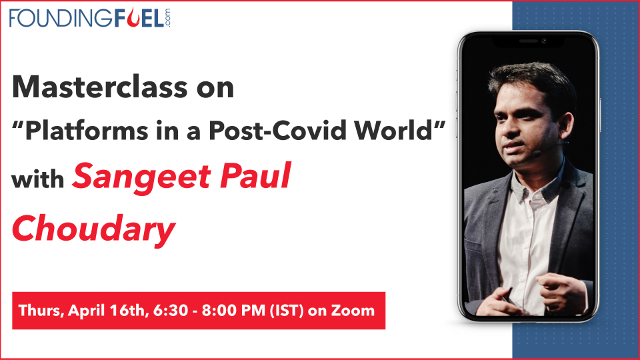
Learn from those who have been through it
Texas Monthly has a fascinating feature on a retail chain, H-E-B, which is doing very well when most of its peers are struggling. It is not by accident. Here’s one of the many things they did right.
“Starting in January, we’ve been in close contact with several retailers and suppliers around the world. As this has started to emerge, we’ve been in close contact with retailers in China, starting with what happened in Wuhan in the early couple of months, and what kind of lessons they learned. Over the last couple of months, [we’ve been] in close contact with some of our Italian retailers and suppliers, understanding how things have evolved in Italy and now in Spain, talking to those countries that are ahead of us in the curve. We’ve been in daily contact, understanding the pace and the change and the need for product, and how things have progressed in each of those countries.”
Give others some space
We found this image on Twitter.
What else is competing for your space? Tell us about it on mail. Or post on Twitter, and tag us @foundingf. Or join our Slack channel and post it there. If you aren’t there already, here is the invite code.
Bookmark Founding Fuel’s special section on Thriving in Volatile Times. All our stories on how individuals and businesses are responding to the pandemic until now are posted there.
Warm regards,
Team Founding Fuel
April 3: Take care of your team, think in phases, and be in the right zone
Good morning,
In the book Fool’s Gold, a fascinating account of the global financial crisis, journalist Gillian Tett writes about a revelatory moment of an analyst who was looking at numbers to understand the risk of the home loan securities. His ‘aha’ moment was he didn’t have enough data to even quantify the risk. Gerd Gigerenzer, who has deeply studied the history of probability, and has done immense research on gut feelings, says it’s important to distinguish between ‘risk’ and ‘uncertainty’. You are dealing with risk when you know all the alternatives, outcomes, and their probabilities. You are dealing with uncertainty when you don’t know what these are. When you are dealing with risk, mathematical modelling might work. When you are dealing with uncertainty, you have to go by instinct, gut feeling, and simple rules.
It’s clear we are dealing with uncertainty now. What does your gut say?
Here are three things we found interesting.
Take care of your team
in Harvard Business Review, Chris Nichols et al write about four behaviours that help leaders manage a crisis. One of them is to engage for impact.
“In times of crisis, no job is more important than taking care of your team. Effective leaders are understanding of their team’s circumstances and distractions, but they find ways to engage and motivate, clearly and thoroughly communicating important new goals and information. This point deserves extra attention, because although the COVID-19 pandemic is, of course, a health crisis, it has sparked a financial crisis as well. Your leaders need to reiterate new priorities frequently to ensure continued alignment in this time of constant and stressful change.”
Think in phases
American Enterprise Institute has a useful framework to think about how the next phases will roll out. It’s of course written from an American perspective. However, keeping in mind this is a global war against the virus, there is merit in thinking about multiple scenarios and options.

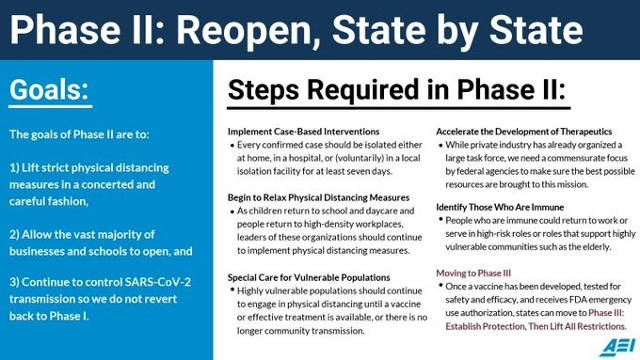
Be in the right zone
We got this useful image as a WhatsApp forward.
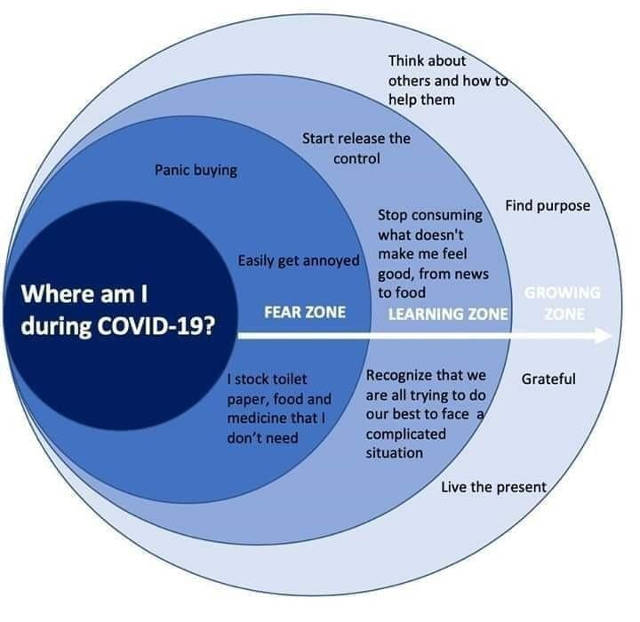
What zone are you in now? What has been your transition like? Share it with us on mail. Or post on Twitter, and tag us @foundingf. Or join our Slack channel and post it there. If you aren’t there already, here is the invite code.
Bookmark Founding Fuel’s special section on Thriving in Volatile Times. All our stories on how individuals and businesses are responding to the pandemic until now are posted there.
Warm regards,
Team Founding Fuel
April 2: Extend your runway, explore fresh sources, look back
Good morning,
Movie fans will relate to this feeling. Just as we settle down to a certain rhythm on the screen, the best directors ensure that the pace changes. The protagonist is up against a new obstacle, tougher than the one they faced and overcame before. In some ways, COVID-19 is playing out like a movie directed by a master of horror films. A lot of people who are not worried about how this will play out, are simply not thinking about this hard enough. It’s not exactly a happy thought to start your day with. But then, it’s best to prepare for the worst, even when we are hoping for the best.
Here are three things we found interesting.
Extend your runway
We listened in to an AMA session with Rajan Anandan, Sequoia India boss, organised by TIE Delhi. Here’s one point that caught our attention:
“How much cash runway that you have, is very, very important because this is not a two or three week phenomenon. The impact on demand, the impact on revenue, the impact on your business is likely to last much more than two or three weeks, it's going to be at least a few months, if not many months. And then depending on your business, it could be even longer. For instance, If you're in the international travel industry, or in the hotel industry, it could be much longer. On the other hand, if you're a business that was profitable before the COVID-19 crisis, and you have, let's say, 18 months of cash runway. Even for those companies, we encourage you to figure out how can you create more runway, so that you have something like 24 months, and then you're in a much better zone.”
Dig deeper
Best Practices for Founders in the wake of COVID-19
Explore fresh sources of funds
Anmol Shrivastava has posted a summary of the conversation Founding Fuel had with Rajiv Kaul, vice chair and CEO of CMS Info Systems, on our Slack channel:
- Some PEs were helping portfolio companies secure loans from banks. In most such cases, banks are usually comfortable lending to PE-backed firms because they tend to have better governance and internal controls.
- In case bank credit is tough to secure, some limited partners (LPs) are considering opening up a line of credit through a separate credit fund for portfolio companies they trust. (Think of an LP as a passive investor who invests in the PE fund for a return, but plays no role in the investment decisions that are left to the general partners (GPs).)
- There’s a reason why PE firms are perhaps being more supportive than usual. Unlike previous crises which hit certain sectors disproportionately, COVID-19 has spared no one. Many PE firms, unfortunately, have also lost friends and colleagues to COVID-19, given most of them are headquartered in the worst-hit areas in the US, UK and Hong Kong. That might explain why they have been a lot more supportive of their portfolio companies.”
Dig deeper
Remember, quarantine is not new
We spotted this 100-year-old ad on Twitter
Have you seen any old ad that’s suddenly relevant today? Share them with us on mail. Or post on Twitter, and tag us @foundingf. Or join our Slack channel and post it there. If you aren’t there already, here is the invite code.
Bookmark Founding Fuel’s special section on Thriving in Volatile Times. All our stories on how individuals and businesses are responding to the pandemic until now are posted there.
Warm regards,
Team Founding Fuel
April 1: Think 2021, drive customer engagement contextually, take a power nap
Good morning,
Often, people’s character is tested in the battlefield, when there’s uncertainty all around, and when you don't know which side the next bullet might come from. Coronavirus has made the entire world a battlefield even as we fight the invisible enemy (virus), without a weapon (drugs) or shield (vaccines). American entrepreneur Mark Cuban is right when he says, how companies treat their employees and stakeholders “is going to define their brand for decades”. It only means the decisions we take should not only look good today, but should also look good decades down the road.
That’s a tough ask. But then, we are on a battlefield.
Here are three things we found interesting.
Think 2021
Stanford News on a possible second order impact of working from home: Fewer new products in 2021.
“In-person collaboration is necessary for creativity and innovation, [Nicholas] Bloom says. His research has shown that face-to-face meetings are essential for developing new ideas and keeping staff motivated and focused.
“ ‘I fear this collapse in office face time will lead to a slump in innovation,’ he says. ‘The new ideas we are losing today could show up as fewer new products in 2021 and beyond, lowering long-run growth.’ ”
Drive customer engagement contextually
In response to Stories from inside India’s corporate war rooms by Indrajit Gupta, Joydeep Sarkar writes in our Slack channel:
“Move sales from output-based to input-based metrics: Found it extremely relevant or else the sales team is just going to rot. One may also think about giving them group case studies on likely scenarios and ask them to plan for it.
“Customer engagement through contextual non-business ways. The financial institutions are leading from the front by wavering late fees / allowing delayed repayment. Lifebuoy is promoting hand washing by including the name of competitors’ brand (Dettol, Godrej No 1) in their ads.”
Dig deeper
Read War Stories
Take a power nap
Kiran Ray Chaudhury shared this lovely photo of Bazinga with us on our Slack channel.

Thanks Kiran. Dear reader, how are your cats and dogs taking WFH? Share the photos with us on mail. Or post on Twitter, and tag us @foundingf. Or join our Slack channel and post it there. If you aren’t there already, here is the invite code.
Bookmark Founding Fuel’s special section on Thriving in Volatile Times. All our stories on how individuals and businesses are responding to the pandemic until now are posted there.
Warm regards,
Team Founding Fuel
March 31: Bracket work and non-work, take heart, make it fun
Good morning,
In the existentialist philosophy, the word abandonment is used to refer to the tremendous sense of freedom one feels without the existence of a higher power. As some businesses get used to remote working, at least some are feeling a sense of freedom. The idea that they don’t owe a lot to their constraints designed in the pre-digital era. A quote from a Forbes magazine piece captures this sentiment. “Whether they know it or not, Global 2000 companies have been set free from their legacy constraints.”
Now, we don’t believe that we will be able to cut ourselves from the past. But we should recognise that the present times give us an opportunity to do a rethink on the way we work.
Here are three things we found interesting.
Bracket work and non-work
Final Mile, a part of Fractal, has a very useful document on managing the cognitive and emotional aspects of working remotely. One of the issues it tackles is the ‘always on’ feeling.
“Another aspect of working remotely entails mentally calculating outcome probabilities (probabilities of certain events occurring, and the possible outcomes of those events)—‘what if I’m at lunch and my boss calls—he’ll think I’m shirking work’, ‘what if I’m on a break and I miss something important’. Expecting negative outcome probabilities could lead to coping mechanisms like being ‘always on’, leading to distortion of the already blurred lines between home and work. Additionally, the commute home, which gives us time to wind down and switch modes, is also missing—exacerbating the ‘always on’ feeling.”
The document offers a few ways to deal with this. A summary:
- establish brackets for when work starts and ends
- block off ‘no-meetings’ slot on the calendar.
- switch off for 2 minutes on the hour, every hour, and reset
Dig Deeper (pdf)
Take heart, even Silicon Valley is struggling
WSJ reports:
“Silicon Valley’s tech giants are a week ahead of the rest of the country in conducting a nearly million-person, real-time experiment into whether it is possible to operate a fully remote workforce in the age of the coronavirus…..
“Still, the forced transition hasn’t been smooth, and that raises questions about what lies ahead for other industries less accustomed to life outside the office.
“Yelp Inc. in recent weeks spent millions of dollars on work-from-home equipment, including buying a laptop for every employee who didn’t already have one, according to people familiar with the matter.
“ ‘You’ll start seeing the breaking points,’ said Aaron Levie, chief executive of Box, whose 2,000 employees have been home for a week. ‘A lot of organisations don’t have the technologies or culture to work this way.’ ”
Make it fun for your family
We got this on WhatsApp:
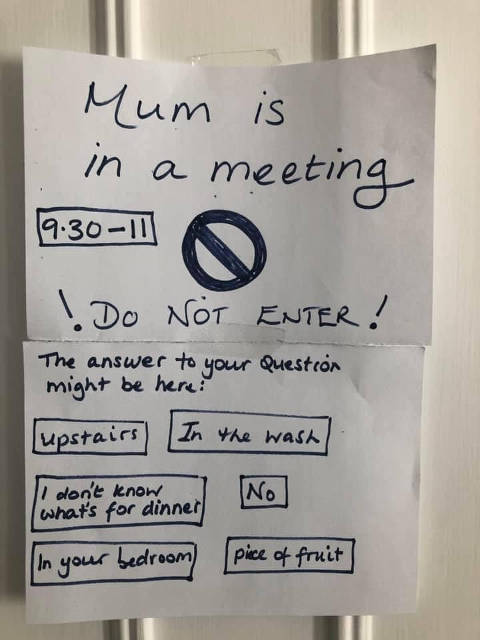
What funny messages do you send your family? Share with us on mail. Or post on Twitter, and tag us @foundingf. Or join our Slack channel and post it there. If you aren’t there already, here is the invite code.
Bookmark Founding Fuel’s special section on Thriving in Volatile Times. All our stories on how individuals and businesses are responding to the COVID-19 pandemic until now are posted there.
Warm regards,
Team Founding Fuel
March 30: Recognise chaos, reflect, and mind your posture
Good morning,
As recently as two weeks ago, Mondays had a different ring to it. It meant shaking off the weekend stupor of going out, of meeting relatives or friends, of movie plots and preparing for a different setting. What does your Monday feel like today? Do you change into formals to get into the mood? Do you rearrange your new ‘office’ desk? Do you point your kids to the calendar to suggest there is a line it has drawn that they must not cross? Do you also wonder how long will this last, and how may this extraordinary experience change the way you work, play and live?
Welcome to the new normal.
Here are three things we found interesting.
Recognise chaos. Know that old rules don’t work here.
During one of our morning calls, Kavi Arasu spoke about the ‘Cynefin framework’. He told us this is something we can use to make sense of what’s happening today. You will hear more on that from us soon. Meanwhile, here’s Jennifer Garvey Berger on one aspect of the framework:
“So, some things are never knowable. He calls those chaos. That’s where things are moving around so quickly, there are so many pieces, you actually can’t tell cause and effect. It’s too unpatterned for us to be even able to draw that out. In complexity, you can look back at it and get most of the patterns of it, like, ‘Why did the culture of this organisation go in that direction? Oh, well, we can trace that back, but then if we want the culture of the next organisation to go in the same direction, we can’t just do those things as though they are now a laundry list of steps to take, because the next organisation is going to be contextually different. It’s going to have a different set of issues, a different set of people.’ So, we can’t follow the same steps in a complex space that we would be able to if it were just merely complicated.”
Reflect
Anand Mahindra, chairman of Mahindra Group, had this interesting exercise going on his Twitter timeline:
“It’s clear that the post-COVID world will be a very different one. Trying to reflect on what will change permanently & what will revert to normal. Can you fill in the rest of the sentence? ‘After the pandemic, we will…’ Example: ‘...we will still avoid shaking hands.’ ”
Dig deeper
How business leaders are thinking about it (A Founding Fuel story by Indrajit Gupta)
Mind your posture
We found this to be funny and true.
How do you make sure you maintain good posture while working from home? Share your tips with us on mail. Or post on Twitter, and tag us @foundingf. Or join our Slack channel and post it there. If you aren’t there already, here is the invite code.
Bookmark Founding Fuel’s special section on Working From Home (WFH). All our stories on the theme until now are posted there.
Warm regards,
Team Founding Fuel
March 29: Recognize problems early, embrace disruptions, and share your snacks
Good morning,
If you haven’t read Stories from inside India’s corporate war rooms by Indrajit Gupta already, Sunday might be a good day to read it.
What is common between a pilot who was flying a plane that got hit by a bird, a psychologist who spent most of her time helping people overcome their fears, and a guy who gave up his well-paying job to start a yoga studio a day before 9/11? They all have interesting stories to tell that will help us wade through this crisis. D Shivakumar, President (Corporate Strategy and Business Development), Aditya Birla Group, shares the gist of those stories and what we can learn from them. You might draw your own lessons from the three books he recommends to manage in the times of crisis.
Sometimes we get so carried away putting out the fires that we don’t pause and take stock of the situation. Sunday might be the right time to do it. If you have been busy the whole week with your work, this is the time to pull back and see the bigger picture.
Wish you a peaceful Sunday and productive week ahead.
Here are three things we found interesting.
Recognise problems early
Gary P. Pisano et al write about lessons from Italy’s response to coronavirus. The lessons apply to other situations too.
“Threats such as pandemics that evolve in a nonlinear fashion (i.e., they start small but exponentially intensify) are especially tricky to confront because of the challenges of rapidly interpreting what is happening in real time. The most effective time to take strong action is extremely early, when the threat appears to be small—or even before there are any cases. But if the intervention actually works, it will appear in retrospect as if the strong actions were an overreaction. This is a game many politicians don’t want to play.”
Don’t fight against disruptions, embrace them
WSJ’s piece on those balancing their work and their kids’ schooling has useful advice. Here’s one:
“Your work is going to be broken up during the day. Try to embrace it and leverage it instead of fighting against it,” Ms. Gordon said. “Use the times of disruption, when the kids are getting rowdy or wired, to take a break and spend time with them. You probably need a break from work and they clearly need a break, and you can always come back to it later. Fighting them off when they get antsy, that just stresses everyone out.”
Share your snacks
We discovered that some people no longer try to hide their snacks from Zoom calls
What’s your favourite WFH snack? Share it with us on mail. Or post on Twitter, and tag us @foundingf. Or share it on our Slack channel.
If you are not on our Slack channel already, here is the invite code.
Bookmark Founding Fuel’s special section on WFH. All our stories on the subject will go here.
Warm regards,
Team Founding Fuel
March 28: Build scenarios, accept that you are stressed, and share a moment
Good morning,
In Sapiens, Yuval Noah Harari writes, “unlike physics or economics, history is not a means for making accurate predictions. We study history not to know the future but to widen our horizons, to understand that our present situation is neither natural nor inevitable, and that we consequently have many more possibilities before us than we can imagine.”
And history, by definition, is ‘study of change’. What’s happening today is ‘change’ at a great scale and at a great speed. It’s decades happening in a week. Just by paying attention to what’s happening around us, we are studying history. And therefore it should tell us that ‘we have many more possibilities before us than we can imagine’.
What possibilities do you see before you?
Here are three things we found interesting.
Build scenarios
After several conversations with CEOs and business leaders, Indrajit Gupta writes: “Making sense of the enormous shifts is proving to be tricky. And volatility seems to be the new normal. But breaking all this down at the highest levels is not something everyone can do. Most large companies understand this and are assiduously at work on it.
“When I last spoke to them, for four days on a trot, the chairman, executive directors and independent board members at a leading diversified company were immersed in a massive scenario planning exercise.
“This is the first time they have done a board meeting where everyone joined remotely from their homes. The intense process, involving a senior leadership team of about 20 executives across the group, finally concluded on Thursday.
“The exercise was mind-bogglingly complex. They had to map everything that could impact demand and supply—not just for India, but for all their global operations.
“It meant examining a variety of issues on the demand side: financiers, customers and networks.
“On the supply side: logistics, global and local supply chains, and migrant labour.”
Accept that you're stressed and don’t feel guilty
Peter Martin, Bloomberg correspondent in Beijing, has 10 brilliant pieces of advice on life under lockdown: “You're worried about yourself. Your family. Your friends. The world. And there's a sense of fear in the air. Don't try to talk yourself out of it.
“Tell your friends. Write it down. Meditate. Exercise. Do whatever you need to do to deal with it.
“Talking of stress, don't feel guilty that you're consumed with your own feelings when others (doctors, the elderly, the socially isolated) have it harder.
“Your stress is real too. And unless you deal with it properly, you won't be able to support others.”
Have coffee together
This is a cool idea if your spouse also works from home (or at home)
You want to send us a photograph of your coffee mugs? Share it with us on mail. Or post on Twitter, and tag us @foundingf. Or share it on our Slack channel.
If you are not on our Slack channel already, here is the invite code.
Bookmark Founding Fuel’s special section on WFH. All our stories on the subject will go here.
Warm regards,
Team Founding Fuel
March 27: How to look good on video calls, ignore social media when you wake up, and give space to kids
Good morning,
In Learning How To Learn, a hugely recommended online course, Barbara Oakley says we have two fundamentally different modes of thinking— the Focused and the Diffuse modes. We learn best when there is a balance between the two. We find and settle into an equilibrium sooner or later at our workspaces. Part of the reason why working from home came as a shock to many of us is that the equilibrium is lost, and in this transition phase, we are struggling to find it. The answer then is in becoming more aware of our focused and diffuse modes. And realign our schedule according to it.
Here are three things we found interesting.
Check the background
Bob Sacha, filmmaker and photographer, has some great tips on how to look good on video calls. Here are two.
- Put the device (laptop, phone, tablet, aka the camera) at eye level. Set your laptop or phone up on some books or boxes so the camera is level with your eyes.
- For a film interview, I’m always trying to place my subject as far away from the background as possible to give a sense of depth. Some people like being against a plain wall. If you like the plain wall, try to be far enough away so distracting shadows don’t fall directly behind you. Just be aware that people are going to obsess on what’s in the background so be careful what’s back there. Avoid trees sprouting out of your head.
[Want to dig even deeper? Our colleague Anmol Shrivastava has a fantastic list of tried and tested best practices for Zoom calls, based on his experience with our Masterclass guests. You can ask him for tips on our Slack channel. Join.]
Ignore social media when you wake up
In the latest Sounding Board column, Charles Assisi has some practical tips on staying focussed: “Peer-reviewed literature has meticulously documented the downsides of looking at the phone screen first thing in the morning. These include higher levels of anxiety and stress when you look at news feeds and IQ depletion after staring at social media. While at work, it can take anywhere between 23-25 minutes to recover focus after an interruption—or a distraction.
“That is why, Nir Eyal keeps making the point, it is important to “gain traction”, which is the opposite of “distraction”. In other words, be indistractable. I had a lovely conversation with him on the theme. If you haven’t heard it yet, may I urge you to? There are some lovely pointers he offers on how to stay focused.”
Give space to kids
We saw this lovely photo with a profound hashtag #TheyGrowUpSoFast on Twitter.
When was the last time you saw your kids in their ‘workspace’? How are they coping? Share your stories with us on mail. Or post on Twitter, and tag us @foundingf. Or share it on our Slack channel.
If you are not on our Slack channel already, here is the invite code.
Bookmark Founding Fuel’s special section on WFH. All our stories on the subject will go here.
Warm regards,
Team Founding Fuel
March 26: Take it slow, listen, and choose the right channel to collaborate, communicate and coordinate
Good morning,
If there is one brand that is top-of-mind for everybody these days, it’s Zoom, the video conferencing tool. Its sales this year have been phenomenal. Its share price has been moving up when most other stocks are down. (Unintended consequence: the share price of a Beijing-based mobile phone components manufacturer has been also been surging. Reason: its name is also Zoom.) Perhaps the best compliment for Zoom is that in one corner of Twitterverse, some people are already complaining about Zoom fatigue.
What’s happening to Zoom could well be a metaphor for our tendency to rush and overdo things. Our colleague Kavi Arasu has a piece of simple advice to all of us for these days: slow down.
Here are three things we found interesting.
Listen
In Founding Fuel’s Sounding Board column, Kavi Arasu writes: “Encourage your leaders to share their struggles of working from home with the team. Just that one act will loosen up the team and help them see that everybody is in it together. With one organisation that I am working with, leaders resolved to set listening calls with their team members. They found interesting stories. But it started with leaders sharing their own situation. One of them shared how he has to share household chores and wash the dishes. Something that he hasn’t done in a long while. Plus, his wife who also works took his desk and the daughter took the living room for lessons that came from school. There was dead silence on the call for a while before it opened the floodgates for sharing!”
Choose the right channel
Raphael Bick et al write in McKinsey Digital: “Choosing the right channel matters. Video conferences are great for discussing complicated topics in real-time and for creating a sense of community, but they require team-wide coordination and focus. Channel (chat) based collaboration software is great for quick synchronization or easily answered questions, while email can be used to record outcomes and communicate more formally.”
Here’s a useful chart from the essay:

Have fun with your friends
However, we are not sure if in this particular case, man’s best friend found it amusing.
Do you want to send us some of your pet pictures as you work from home? Mail it to us. Or post on Twitter, and tag us @foundingf. Or share it on our Slack channel.
If you are not on our Slack channel already, here is the invite code.
Bookmark Founding Fuel’s special section on WFH. All our stories on the subject will go here.
Warm regards,
Team Founding Fuel
March 25: Take care of your people, establish rituals, make it beautiful
Good morning,
It’s said all is fair in love and war. The proverb suggests we have to throw out our rulebooks during times of war because things change so rapidly. The rules that evolved in gentler times might hurt rather than help. However, the universe is always governed by rules. Only, the rules might change. Our success, then, depends on how fast we identify the new rules, and how quickly we adapt to them.
Here are three things we found interesting.
Take care of your people
Aamer Baig et al write in McKinsey Digital: “The CIO’s first order of business is to take care of her employees. It’s important to acknowledge that people are focused on caring for loved ones, managing their kids who are no longer in school, stocking up on necessities, and trying to stay healthy, all while trying to do their jobs. This requires empathy and flexibility from CIOs.
“CIOs are moving to provide flexible work arrangements—working remotely, in flexible shifts, and preparing for absences. One CIO recognized that employees working from home will be affected by school closures and quickly designed a backup support model for each essential individual….
“For those people who still need to come into work, CIOs have a responsibility to make the work environment safe. One company, for example, has created six work zones. People cannot cross from one zone into another. If someone gets sick in one zone, they can isolate it from the other zones quickly.”
Establish rituals
Over at our Slack channel Charles Assisi writes: “Rituals are REALLY important to me when working from home. It’s come to a point where there’s this narrative in my head that borders on the near ridiculous. It says I MUST wake up early, spend time alone, not touch the phone or access the internet before 9 am, brew my own tea, among a bunch of other things. One-on-one meet ups with people are fine. But no screen time. Sounds silly. But it sets the tone for the day. Feel superstitious about it. If that time goes well, productivity amps up. Else, it is a downward spiral.”
Make it beautiful
We found this lovely photograph of a WFH setup on Twitter.
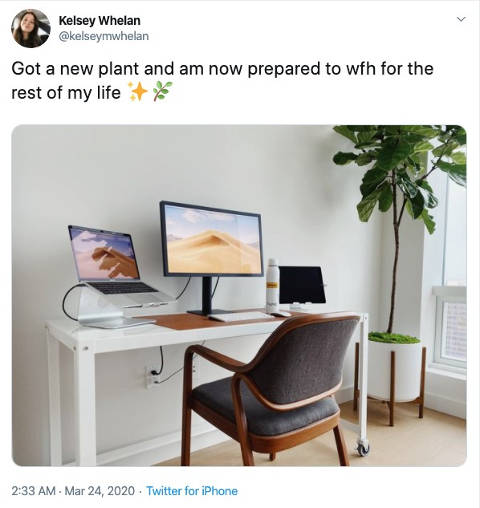
What does your WFH workspace look like?
Want to share it with us to inspire others? Mail it to us. Or post on Twitter, and tag us @foundingf. Or share it on our Slack channel.
If you are not on our Slack channel already, here is the invite code.
Bookmark Founding Fuel’s special section on WFH. All our stories on the subject will go here.
Warm regards,
Team Founding Fuel
March 24: Be creative, prepare for surprises, and take it with a smile
Good morning,
And welcome to WFH Daily.
Over the last few days, all of us at Founding Fuel have spent several hours talking to people like you—those in leadership roles, entrepreneurs, and professionals—to understand what working from home really means in the war-like situation we are in now. These conversations were followed by internal discussions and debates. ably guided by our colleague Kavi Arasu, on what useful contribution we can make.
One outcome is this Daily Newsletter on how WFH is changing our lives.
Our intent is to sift through all of what is out there, to cull perspectives and actionables that matter most as you transition to WFH.
We’ll keep it crisp and have it delivered into your inbox by 8 am every weekday. Think of it as a cup of morning coffee or tea to get started. (For the full course, join our Slack channel and visit our site.) If you think friends or colleagues may find value in this, share it. This is going to be a long haul, and it’s best we travel together and learn from each other.
Three things that got our attention today
Be creative
WSJ reports: “Working from home in the Hamptons, CEO Michael Kirban of coconut-water maker Vita Coco on Thursday hosted the company’s first virtual happy hour—something of an instant coronavirus-age fixture, in which colleagues pour their own drinks and log on to chat. “It’s my job to keep it as light as possible,” he said. “These are really tough times. People are scared.”
Be prepared for surprises—even good ones
Joydeep Sarkar writes in our Slack channel: “I felt people are displaying higher order listening behaviour, meaning allowing everyone to complete, no critical comments in between and a pause after someone finishes, which is an extremely mature behaviour—no immediate rush thru with comment. Honestly, I was not expecting this semblance in the 1st meeting.
“Also got a sense that the seriousness is higher. Is it that extra effort to make up for the physical absence? Not sure but everyone was quite engaged & committed.”
Take it with a smile
If face-to-face meetings were like online meetings
This is the best I’ve seen! Can’t stop laughing! #wfh pic.twitter.com/kPJLsTAFqd
— Gurprriet Siingh (@JoyAndLife) March 20, 2020
If you are not on our Slack channel already, here is the invite code:
Bookmark the WFH section on Founding Fuel. All our stories on the subject will go here.
Warm regards,
Team Founding Fuel



